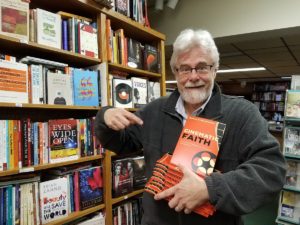 In this week’s BookNotes I will review a new book that we think is very good, a lot of fun, and even, I would say, important. It’s important for ordinary folks as well as for those who study this particular field professionally. Its retro cover matches the topic: Cinematic Faith: A Christian Perspective on Movies and Meaning by Calvin College film studies professor (and excitable film buff) William D. Romanowski (Baker Academic) $22.99. Our 20% OFF ON SALE discount makes it just $18.39.
In this week’s BookNotes I will review a new book that we think is very good, a lot of fun, and even, I would say, important. It’s important for ordinary folks as well as for those who study this particular field professionally. Its retro cover matches the topic: Cinematic Faith: A Christian Perspective on Movies and Meaning by Calvin College film studies professor (and excitable film buff) William D. Romanowski (Baker Academic) $22.99. Our 20% OFF ON SALE discount makes it just $18.39.
There are a plenty of things I want to tell you about this interesting new book but I’d like you to indulge me a bit with a bunch of other comments first.
You can just jump right to it by scrolling down to the review itself if you’d rather. You can even just skip to the bottom and easily click on the “order here” tab at end of this column to be taken to our secure order form page if you just want to order it now. We’re ready to send ‘em out.
But first, this.
WE’VE BEEN ON THE ROAD AT SEVERAL CHURCH-RELATED EVENTS
We’ve been on the road a lot this season and we want to thank those who hosted us at big gigs across the mid-Atlantic. Our on-line/mail order business friends say they enjoy hearing about our escapades here and there, so I want to ruminate just a bit on selling books at church events.
I have a particular observation that might sting just a little, but I’m surely not intending to diss our good friends in Lutheran, UCC, Episcopal and Presbyterian (USA) circles; we love doing this off site gigs. My observation will be a segue to telling you more about Dr. Romanowski’s great new book about the movies.
We are tired but yet exhilarated by our work at this recent string of clergy and church events. We loudly thank all those who helped us lug and unload or lug and reload our vans in recent weeks. We couldn’t do this work without the help of friends with strong backs. Thanks to friends old and new.
Over just the last few weeks we’ve gotten to set up big book displays for several great church events. We’ve put miles on the vans and lugged boards and shelves and supplies and boxes and boxes (and more boxes) of books to an Episcopalian retreat with The Rev. Fleming Rutledge (a hero of ours – you should read her many books! Her most significant work is The Crucifixion: Understanding the Death of Jesus Christ although, The Battle for Middle Earth, her 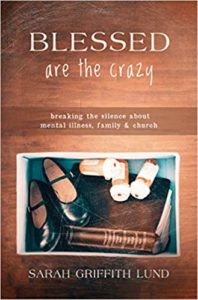
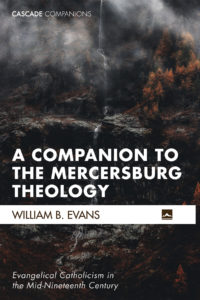 major work on Tolkien’s “divine design” is majestic) to a church education conference with PC(USA) Presbyterian congregational educators, to a UCC clergy convocation (with Sarah Griffith Lund leading as a vibrant speaker whose book Blessed Are the Crazy: Breaking the Silence about Mental Illness, Family and Church explores hard mental health issues in typical churches), to a small academic theology conference about Mercersburg Theology (where we launched a brand new and quite lovely introduction to that 19th century movement by Erskine professor William Evans called A Companion to the Mercersburg Theology in the “Cascade Companions series) to a large central Pennsylvania ELCA Synod Gathering where they re-
major work on Tolkien’s “divine design” is majestic) to a church education conference with PC(USA) Presbyterian congregational educators, to a UCC clergy convocation (with Sarah Griffith Lund leading as a vibrant speaker whose book Blessed Are the Crazy: Breaking the Silence about Mental Illness, Family and Church explores hard mental health issues in typical churches), to a small academic theology conference about Mercersburg Theology (where we launched a brand new and quite lovely introduction to that 19th century movement by Erskine professor William Evans called A Companion to the Mercersburg Theology in the “Cascade Companions series) to a large central Pennsylvania ELCA Synod Gathering where they re-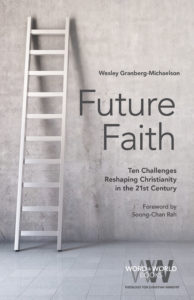 elected their current very good Bishop.
elected their current very good Bishop.
We are glad to report that our biggest seller at that big gig was the most recent book by our friend Wes Granberg-Michaelson called Future Faith: Ten Challenges Reshaping Christianity in the 21st Cenutury (Fortress; $18.99.) Thanks to Bishop James Dunlap from teaching from it.
We often smile about and enjoy the theological diversity in these groups; around the spacious book displays we discuss the theological wisdom of popular authors like Richard Rohr or Diana Butler Bass or Tom Wright or Barbara Brown Taylor and debate the usefulness of words like evangelical or progressive, liturgical or Reformed. I often (unsuccessfully, I might add) try to sell them books like Evangelical, Sacramental, Pentecostal: Why the Church Should Be All Three by Gordon Smith (IVP; $18.00) or Rich Mouw’s wonderful Restless Faith: Holding Evangelical Beliefs in a World of Contested Labels (Brazos Press; $19.99.) I always takes books about ecumenicity and Christian unity such as Costly Love: The Way to True Unity for All the Followers of Jesus by John Armstrong (New City Press; $15.95.)
With these folks we celebrate their vibrant churches and share the anxiety about the numerical and financial decline of mainline congregations. We delight in the vision and energy of young, creative (and often quite theologically aware) clergy and mourn the loss of aging pastors that we’ve known for years who are no longer in ministry. We are glad when we hear about how the gospel is being proclaimed and people being served in and through congregations large and small, in cities and towns and rural areas. What a privilege!
 We are told over and over that our books make a difference, that our presence matters at these denominational events. Historically, mom and pop Christian bookstores have been part often simplistic pietistic and fundamentalist traditions and have sometimes not been very serious-minded about theology; they have often eschewed working with mainline congregations. When large evangelical chains won’t even carry certain Bible translations or the work of certain publishers, there is good reason for animosity towards Christian booksellers among mainline Protestants and Roman Catholics. We have been graced by those in mainline circles who have welcomed us, knowing that we are a mom and pop, small town, Christian bookstore whose most core convictions remain orthodox. And we are grateful for
We are told over and over that our books make a difference, that our presence matters at these denominational events. Historically, mom and pop Christian bookstores have been part often simplistic pietistic and fundamentalist traditions and have sometimes not been very serious-minded about theology; they have often eschewed working with mainline congregations. When large evangelical chains won’t even carry certain Bible translations or the work of certain publishers, there is good reason for animosity towards Christian booksellers among mainline Protestants and Roman Catholics. We have been graced by those in mainline circles who have welcomed us, knowing that we are a mom and pop, small town, Christian bookstore whose most core convictions remain orthodox. And we are grateful for  those who have trusted us.
those who have trusted us.
We do have good resources for local congregations seeking congregational revitalization, for those doing strategic planning, missional discernment, for those starting spiritual formation groups, revisiting mission statements, searching for a pastor and the like. Whether you want to explore more creative worship planning or are doing appreciative inquiry, or are hoping to move your congregation towards social justice advocacy, we have books to suggest. We have oodles of books on congregational stewardship, on church conflict, on pastoral integrity, 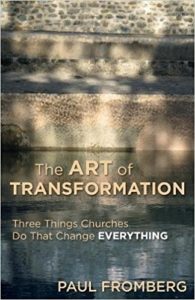
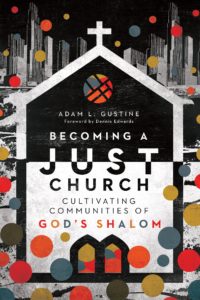
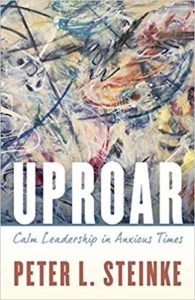 on leadership development, youth ministry, and Christian education. Some rather evangelical books can be wisely used by mainline folks and we have tons of books from more liturgical, mainline traditions. We take books like The Art of Transformation: Three Things Churches Do That Change Everything by Paul Fromberg, one of the priests at St. Gregory of Nyssa (Church Publishing; $18.95) or Becoming a Just Church: Cultivating Communities of God’s Shalom by Adam Gustine (IVP; $17.00.) or the new one by the remarkable Peter Steinke, Uproar:Calm Leadership in Anxious Times (Rowman & Littlefield; $19.95) and dozens and dozens more.
on leadership development, youth ministry, and Christian education. Some rather evangelical books can be wisely used by mainline folks and we have tons of books from more liturgical, mainline traditions. We take books like The Art of Transformation: Three Things Churches Do That Change Everything by Paul Fromberg, one of the priests at St. Gregory of Nyssa (Church Publishing; $18.95) or Becoming a Just Church: Cultivating Communities of God’s Shalom by Adam Gustine (IVP; $17.00.) or the new one by the remarkable Peter Steinke, Uproar:Calm Leadership in Anxious Times (Rowman & Littlefield; $19.95) and dozens and dozens more.
Many folks at these mainline denominational events, clergy and congregants alike, it seems are not very aware of the often very thoughtful resources that are out there. From Eerdmans to IVP, from the defunct Alban Institute (whose books are still available!) to broad-minded evangelical presses like Zondervan and Baker, there are tons of resources for congregational health. I wish more church leaders – elders, vestry members, council members, deacons, vicars, and the like – reached out to us and sought out resources to help them with their vows of service to the local church. There’s literally something for everyone. We can help.
A CURIOUS THING WE OFTEN HEAR FROM FOLKS AT THESE EVENTS
But here is what we often notice – and this is the long-in-coming segue to my book review this week: people especially love the books that we bring that are a bit surprising, books that are not about the church, but about the arts or science, creation-care or nurturing a sense of vocation that allows people to serve God in the work-world. One doesn’t need to read 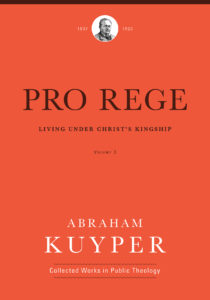 Abraham Kuyper who used that great phrase about Christ being Lord of “every square inch” of His creation to understand that God cares about more than our churches. (Although it wouldn’t hurt to get it from the proverbial horses mouth – the third Pro Rege: Living Under Christ’s Kingship volume in the massive Kuyper translation project was just released (Lexham Press; $49.99) offering remarkable insight about cultural engagement from the early 20th century Dutch theologian and statesman.)
Abraham Kuyper who used that great phrase about Christ being Lord of “every square inch” of His creation to understand that God cares about more than our churches. (Although it wouldn’t hurt to get it from the proverbial horses mouth – the third Pro Rege: Living Under Christ’s Kingship volume in the massive Kuyper translation project was just released (Lexham Press; $49.99) offering remarkable insight about cultural engagement from the early 20th century Dutch theologian and statesman.)
People seemed surprised so see that we feature books that remind us that God cares about Monday as much as Sunday. That all of us who follow Jesus are called to obey God by helping serve the common good. That this somehow means being in but not of the world, in civil society, the arts, education, recreation, politics, and more.
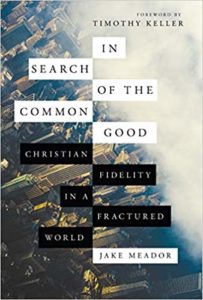 (Do please read last week’s BookNotes review of Jake Meador’s new book In Search of the Common Good: Christian Fidelity in a Fractured World and note the great chapters about how simple practices of going to church can help equip us to become better civic-minded public servants and good neighbors. As I explained, his study of culture is astute and his call to be active in the local church is so helpful, even though it’s a book about repairing society, healing the world, and seeking the common good.)
(Do please read last week’s BookNotes review of Jake Meador’s new book In Search of the Common Good: Christian Fidelity in a Fractured World and note the great chapters about how simple practices of going to church can help equip us to become better civic-minded public servants and good neighbors. As I explained, his study of culture is astute and his call to be active in the local church is so helpful, even though it’s a book about repairing society, healing the world, and seeking the common good.)
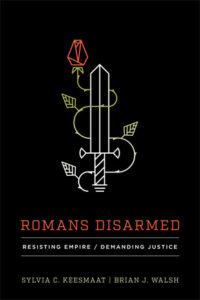 (And then back up and read my big review Romans Disarmed and Walsh & Keesmaat’s radical call to be a subversive community that stands with the hurting, even in an age of imperial injustice. There’s so much to be found in their amazing book Romans Disarmed: Resisting Empire/Demanding Justice and even my wordy review doesn’t tell it all. Both books show that a Biblically-grounded sort of socially engaged gospel depends upon a quality of congregational life that nurtures a lifestyle of stewardship, compassion, and activism.)
(And then back up and read my big review Romans Disarmed and Walsh & Keesmaat’s radical call to be a subversive community that stands with the hurting, even in an age of imperial injustice. There’s so much to be found in their amazing book Romans Disarmed: Resisting Empire/Demanding Justice and even my wordy review doesn’t tell it all. Both books show that a Biblically-grounded sort of socially engaged gospel depends upon a quality of congregational life that nurtures a lifestyle of stewardship, compassion, and activism.)
As much as mainline church seminary profs like to dabble in edgy and often eccentric theologies that are supposed to be empowering and relevant, most mainline churches are way behind the best evangelicals in fostering conversations around the intersection of faith and science, art, business, work, even racial reconciliation. Few mainline churches (judging from what we hear at these events, at least) are doing much in their churches about relating faith to stuff other than churchy or missionary things. When at mainline denominational events for church folk we display books about art or culture or work or science, there is almost always a bit of surprise. Folks are overjoyed to see Madeline L’Engle’s Walking on Water: Reflections on Faith and Art or The Language of God and Science by pioneering researcher of the human genome, Francis Collins or Josh Larsen’s excellent Movies Are Prayers: How Films Voice our Deepest Longings but you can tell that many have never seen books like that before. People do a double take when they see books about the doctrine of vocation, or books like Os Guinness’s The Call next to books about work and the marketplace. They seem to think that sensing God’s call only means being called to church life or religious things.(Curiously, in many more traditionally evangelical events, it is almost expected that we’ll have books on work and race and art and technology and civic life.) In our recent string of events everybody was delighted when they saw that we had, say, Wendell Berry’s agrarian books or David Brooks’ social criticism or Makoto Fujimura’s artful study of Endo’s novel Silence (in Mako’s wonderful Silence and Beauty: Hidden Faith Born of Suffering) or Sherry Turkle’s critique of digital culture or Andy Crouch’s wonderful Tech-Wise Family or Robert Capon’s “culinary reflection” Supper of the Lamb or books about sports and recreation. But mainline denominational folks tend not to buy them. They notice — books about faith and food, faith and popular music, books about hiking? But it seems surprising to them. And the pastors, usually, skip right over those things as if faithful reflection about real life doesn’t interest them much.
I don’t know if the surprise is that evangelical booksellers like us are savvy about life in the real world (do they think I’m a little hobbit sitting in a cave reading theology all day?) or that there even is such a thing as a Christian perspective on seemingly secular things like advertising or sports or neuroscience or work or film. This observation vexes me a bit.
BEING ECUMENICAL, YES
Almost everywhere we go we like to display books that honor our deep commitment to ecumenicity. As a matter of principle we like to offer both evangelical and progressive stuff; we always have Roman Catholic authors mixed in with Protestant books. We carry Chesterton and Nouwen and Alexander Schmemmann; Joan Chittister, John Stott and Walter Brueggemann; we feature Bible books by the late Rachel Held Evans and conservatively Reformed Bible teacher Nancy Guthrie. We have books on sexuality by Wes Hill and Matthew Vine and Austen Hartke side by side. Mainline folks rarely buy C.S. Lewis, but we take his stuff and put him near Rowan Williams and Marcus Borg. Maybe it was only to amuse myself, but in a recent display I put John Piper’s little Why I Love the Apostle Paul: 30 Reasons next to our stack of Romans Disarmed: Resisting Empire/Demanding Justice.
But being ecumenical is only one of our passions.
A BROAD VISION OF THE WIDE SCOPE OF REDEMPTION
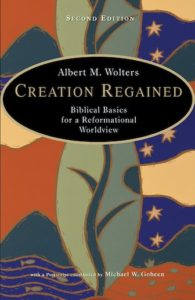
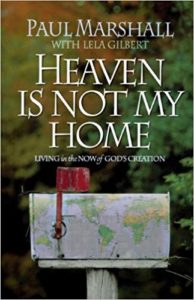 As you can guess, we are passionate about this wholistic vision – learned mostly from the likes of Francis Schaeffer and Abraham Kuyper and in books like Creation Regained: Biblical Basis for a Reformational Worldview by Al Wolters and Heaven Is Not My Home: Living in the Now of God’s Creation by Paul Marshall and Engaging God’s World: A Christian Vision of Faith, Learning, and Living by Cornelius Plantinga – about how we can find God in the ordinary stuff of life and how we are called by God to be faithfully attentive about how to think and live in all spheres of life; no arena of culture or aspect of society or corner of your life is off limits to the saving power of Christ and the renewing power of the Spirit. It hardly needs saying – but yet, in religious circles, it does – life in God’s creation is multi-dimensional. We think and feel, work and play, vote and shop. Theorists of all sorts get at this when they talk about two hemispheres of the brain or when educators talk about multiple intelligences or even when we hear about personality types (like with the recent interest in the Enneagram. As multi-faceted people made in God’s image, we are more than bodies and souls. Which is why the church must proclaim a big gospel of all sides of life and why faith-based booksellers must carry resources for living in every sector of life and culture.
As you can guess, we are passionate about this wholistic vision – learned mostly from the likes of Francis Schaeffer and Abraham Kuyper and in books like Creation Regained: Biblical Basis for a Reformational Worldview by Al Wolters and Heaven Is Not My Home: Living in the Now of God’s Creation by Paul Marshall and Engaging God’s World: A Christian Vision of Faith, Learning, and Living by Cornelius Plantinga – about how we can find God in the ordinary stuff of life and how we are called by God to be faithfully attentive about how to think and live in all spheres of life; no arena of culture or aspect of society or corner of your life is off limits to the saving power of Christ and the renewing power of the Spirit. It hardly needs saying – but yet, in religious circles, it does – life in God’s creation is multi-dimensional. We think and feel, work and play, vote and shop. Theorists of all sorts get at this when they talk about two hemispheres of the brain or when educators talk about multiple intelligences or even when we hear about personality types (like with the recent interest in the Enneagram. As multi-faceted people made in God’s image, we are more than bodies and souls. Which is why the church must proclaim a big gospel of all sides of life and why faith-based booksellers must carry resources for living in every sector of life and culture.
We are not just “brains on a stick” to use Jamie Smith’s colorful phrase or disembodied souls, like some mystics imply. From sex to science, from law to leisure, God’s creation is the “theatre of God” (to quote John Calvin) so all human endeavor is irreducibly religious. That is, all of life is lived – like it or not – corem deo; before God. We are in God’s world, living before the gracious Holy One, 24/7. As one recent book title by an Anglican leader, Win Mott, puts it, The Earth Is the Lords: There Is No Secular. We may live in a cultural era which is called “the secular age” but that is about the ethos of our time. We can live as if there is no God and our our cultural landscape can be arranged without reference to Christ’s reign, but we our hearts are still committed to some story, something religion-like. What we really trust can be misguided and our religion can be an idolatrous one, making an idol of our sense of self or some other ideology, but worship we do.
From a Christian perspective, all of life is at once good and bad; blessed, cursed, damaged, and being redeemed and healed by the resurrection power of the Ascended King. We can serve that God of the Bible with all we’ve got or we can allow our hearts desires to move us in another direction with all we’ve got. It’s really pretty simple: as that old hymn puts it, “This Is Our Father’s World” and (as Richard Mouw unpacks in a book title taken from that same hymn) “He shines in all that’s fair.” God is pleased when we do what the Apostle says in 1 Corinthians 10:31: “Whether you eat or drink, do all to the glory of God.”
So folks walk into the book room at a conference or, more so, into our Dallastown bricks and mortar store, and see books on Van Gogh and cooking and nursing and engineering – books written often by wise authors calling for reform in the profession or industry — and if they look carefully they will realize that the authors may be people of deep Biblical faith, writing some of these books, integrating, if you will, their Sunday beliefs and their Monday world. From school  teaching to lawyering, from math to aesthetics, from farming to journalism, there are Christian authors offering up their workspaces as holy ground, as mission fields. There are people that get what my friend John Van Sloten says in his clever book title (and very excellent book) Every Job a Parable: What Walmart Greet, Nurses and Astronauts Tell us About God. Such folks may not be church leaders but they are trying to be salt and light, leaven in the loaf, blooming right where they are planted in the factory floor or work cubicle or sculpting studio or kindergarten classroom.
teaching to lawyering, from math to aesthetics, from farming to journalism, there are Christian authors offering up their workspaces as holy ground, as mission fields. There are people that get what my friend John Van Sloten says in his clever book title (and very excellent book) Every Job a Parable: What Walmart Greet, Nurses and Astronauts Tell us About God. Such folks may not be church leaders but they are trying to be salt and light, leaven in the loaf, blooming right where they are planted in the factory floor or work cubicle or sculpting studio or kindergarten classroom.
It is why we often recommend the great collection of Christian graduation speeches about taking up our 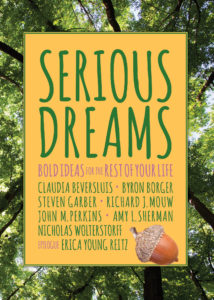 callings to serve God in professions and careers that I compiled, Serious Dreams: Bold Ideas for the Rest of Your Life (Square Halo Books; $13.99) and why I’m sad when people think that even young adults wouldn’t be interesting in such a thing. It is unfortunate, I think, of how few churches honor their college grads. Maybe if we all read Serious Dreams it might help.
callings to serve God in professions and careers that I compiled, Serious Dreams: Bold Ideas for the Rest of Your Life (Square Halo Books; $13.99) and why I’m sad when people think that even young adults wouldn’t be interesting in such a thing. It is unfortunate, I think, of how few churches honor their college grads. Maybe if we all read Serious Dreams it might help.
One would think one would be delighted to see books about real life in the real world that might make you say, and mean it, “Thank God It’s Monday!” But, as I say, people smile and seem surprised, and maybe a tad confused.
I GIVE THIS SPIEL BECAUSE OFTEN PEOPLE ARE SURPRISED
I give this little spiel often at our book display at conferences. It seems that I have to explain these kinds of books to most church folks at a church conference when they see – often with delight – that we’ve got books like Watching TV Religiously or Game Day for the Glory of God: A Guide for Athletes, Fans, & Wannabes or Craig Detweiler’s iGods: How Technology Shapes our Spiritual or Social Lives or Robert Benson’s spiritual meditation on his backyard called Digging In or that great Square Halo Book release edited by Gregory Thornbury on Doctor Who, Bigger on the Inside: Christianity and Doctor Who. If they look at the table of contents, we are sure to have a little conversation about something in Steve Turner’s book Popcultured: Thinking Christianly About Style, Media and Entertainment. Who knew there were Christian insights about fashion and video games and comedy?
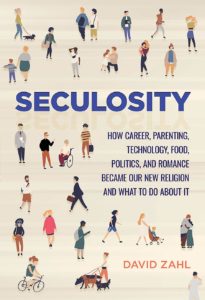 I was dismayed that a book that is getting rave reviews in places like Christianity Today called Seculosity: How Career, Parenting, Technology, Food, Politics, and Romance Became Our New Religion and What to Do about It by Dave Zahl didn’t sell at our recent mainline gigs, even though Fleming Rutledge (an Episcopalian) had a great blurb on the back, and it is published by the ELCA-related Fortress Press. It is an interesting, playful, grace-filled, feisty study of our culture – the sort of things he does at his exceptional website and podcast Mockingbird.
I was dismayed that a book that is getting rave reviews in places like Christianity Today called Seculosity: How Career, Parenting, Technology, Food, Politics, and Romance Became Our New Religion and What to Do about It by Dave Zahl didn’t sell at our recent mainline gigs, even though Fleming Rutledge (an Episcopalian) had a great blurb on the back, and it is published by the ELCA-related Fortress Press. It is an interesting, playful, grace-filled, feisty study of our culture – the sort of things he does at his exceptional website and podcast Mockingbird.
Maybe people are surprised to see these kinds of books because their pastors don’t talk about all this; their adult ed forums during the education hour at church don’t tackle these sorts of things in principled ways. Or maybe it is because (at least the last time I formally investigated this, admittedly years ago) there simply weren’t many Christian bookstores that stocked faith-based books about helping us be whole-life disciples across the whole of life and culture. For a few years I’d call the new winner of the “Best Christian Bookstore” award and ask if they had books on, say, art, or if they had a political science department, or any books about urban planning. Or even books about racial reconciliation. Often the clerk was baffled. We’re a Christian bookstore one dear frontline staffer replied, as if that settled things. Of course God Almighty doesn’t care about art or science or public policy. And these are the best CBA stores!
EYES WIDE OPEN
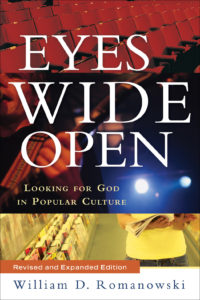 One book we always take out with us to events is Eyes Wide Open: Looking for God in Popular Culture (Brazos Press; $24.00.) It is a personal favorite written by an old college pal, author of the brand new Cinematic Faith, William D. Romanowski. Decades ago in those critical years, under the influence of older mentors in the CCO, we talked about this “all of life redeemed” vision, learned the deeper meaning of worldviews and social imaginaries as we read Dutch philosophers and colorful Christian thinkers like Bible scholar, art historian, and aesthetician, Calvin Seerveld. Bill nearly memorized most of Cal’s seminal Rainbows for the Fallen World (Toronto Tuppence Press; $35.00) and to this day laughs about helping scholarly, artful Cal learn a bit about popular entertainments. Soon, Bill felt the call to do PhD work in the study of popular culture; these were the days when MTV was a new thing, when film was starting to use rock music in soundtracks (the topic, in fact, of his first co-authored book.) He prepared to make a contribution to the burgeoning field of pop culture studies by getting his PhD at Bowling Green (then the epicenter of much of this academic study, using a bit of critical theory and other new ways to discern what is really going on in popular entertainment and cultural proclivities and social practices. His Pop
One book we always take out with us to events is Eyes Wide Open: Looking for God in Popular Culture (Brazos Press; $24.00.) It is a personal favorite written by an old college pal, author of the brand new Cinematic Faith, William D. Romanowski. Decades ago in those critical years, under the influence of older mentors in the CCO, we talked about this “all of life redeemed” vision, learned the deeper meaning of worldviews and social imaginaries as we read Dutch philosophers and colorful Christian thinkers like Bible scholar, art historian, and aesthetician, Calvin Seerveld. Bill nearly memorized most of Cal’s seminal Rainbows for the Fallen World (Toronto Tuppence Press; $35.00) and to this day laughs about helping scholarly, artful Cal learn a bit about popular entertainments. Soon, Bill felt the call to do PhD work in the study of popular culture; these were the days when MTV was a new thing, when film was starting to use rock music in soundtracks (the topic, in fact, of his first co-authored book.) He prepared to make a contribution to the burgeoning field of pop culture studies by getting his PhD at Bowling Green (then the epicenter of much of this academic study, using a bit of critical theory and other new ways to discern what is really going on in popular entertainment and cultural proclivities and social practices. His Pop 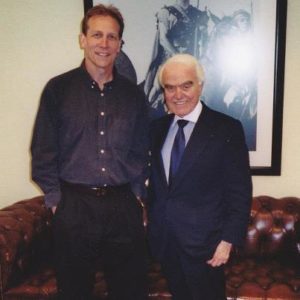 Culture Wars: Religion & the Role of Entertainment in American Life (Wipf & Stock; $45.00) remains a major work – critiquing, by the way, the very way we assume that there is a difference between high art (that we should study and learn from) and low art, or pop culture (which, well, is just amusement, after all, or so many assume.) That the original cover had a picture of Rocky Balboa and William Shakespeare and Bruce Cockburn made a nice point. Bill was a lit major in college, was a performing artist himself, had worked in campus ministry with emerging adults (through the CCO) and soon became perhaps the leading voice in the early 1990s discussions about evangelical faith and popular culture. He was speaking widely and doing research and meeting important voices in the entertainment industry. (The picture above, by the way, is with the legendary Jack Valenti, the late President of the Motion Picture Association — you know, the institution that runs the Academy Awards and gives out the Oscars.
Culture Wars: Religion & the Role of Entertainment in American Life (Wipf & Stock; $45.00) remains a major work – critiquing, by the way, the very way we assume that there is a difference between high art (that we should study and learn from) and low art, or pop culture (which, well, is just amusement, after all, or so many assume.) That the original cover had a picture of Rocky Balboa and William Shakespeare and Bruce Cockburn made a nice point. Bill was a lit major in college, was a performing artist himself, had worked in campus ministry with emerging adults (through the CCO) and soon became perhaps the leading voice in the early 1990s discussions about evangelical faith and popular culture. He was speaking widely and doing research and meeting important voices in the entertainment industry. (The picture above, by the way, is with the legendary Jack Valenti, the late President of the Motion Picture Association — you know, the institution that runs the Academy Awards and gives out the Oscars.
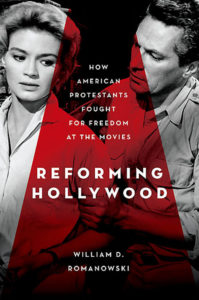 As you may recall from our BookNotes review, in 2012 he released a major scholarly work, published by Oxford University Press entitled Reforming Hollywood: How American Protestants Fought for Freedom at the Movies. It remains a standard study in the history of film, and especially Protestant engagement, about which little has been written. Romanowski had remarkable access to important archives and did interview with older Hollywood producers, including some ground breaking research into the role religion or didn’t play in the formation of the now famous MPAA rating system.
As you may recall from our BookNotes review, in 2012 he released a major scholarly work, published by Oxford University Press entitled Reforming Hollywood: How American Protestants Fought for Freedom at the Movies. It remains a standard study in the history of film, and especially Protestant engagement, about which little has been written. Romanowski had remarkable access to important archives and did interview with older Hollywood producers, including some ground breaking research into the role religion or didn’t play in the formation of the now famous MPAA rating system.
LOOKING FOR GOD IN POPULAR CULTURE
Eyes Wide Open: Looking for God in Popular Culture (in an expanded second edition) was his first popular level book and it became a perennial best seller. It is still one of the very best books to offer a broad and thoughtful Christian worldview as a lens to help us be faithful and discerning in engaging modern entertainment. From video games to televised sports, from advertising to rock shows, Eyes Wide Open helps us understand how pop culture works, how it both reflects the dominant culture’s values and shapes them. And how it can – from varying viewpoints and perspectives – help us criticize and even be motivated to reform society. (Erin Brockovich, anyone? The Big Short? Dallas Buyers Club? Selma?)
Anyway, Eyes Wide Open is a fine and thoughtful book, only a bit dated, now, and still my favorite resource for thinking in foundational ways about the joys and challenges of watching movies and listening to music and such. If you don’t have it, you should. If you were with us at any of the aforementioned church conferences you probably saw it. Maybe you were intrigued. I know we didn’t sell any.
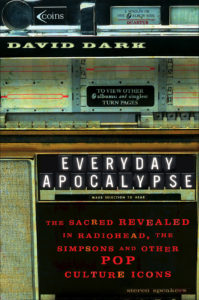 (By the way, another vital favorite, which we also take everywhere we go – with a more allusive writing style, and a bit more punchy evaluation of important popular culture works – is David Dark’s amazing Everyday Apocalypse: The Sacred Revealed in Radiohead, The Simpsons, and Other Pop Culture Icons (Brazos Press; $20.00.) Don’t you love the cool, old-school juke box on the cover design?
(By the way, another vital favorite, which we also take everywhere we go – with a more allusive writing style, and a bit more punchy evaluation of important popular culture works – is David Dark’s amazing Everyday Apocalypse: The Sacred Revealed in Radiohead, The Simpsons, and Other Pop Culture Icons (Brazos Press; $20.00.) Don’t you love the cool, old-school juke box on the cover design?
David is the one who wrote The Possibility of America: How the Gospel Can Mend our God-Blessed, God-Forsaken Land that I reviewed at length at BookNotes a month or so ago. Why are some folks surprised that a Christian bookstore stocks and promotes these kinds of books?
And can you help us fix this problem by promoting in your circles books about culture, the arts, society, science, work, citizenship, play, education, health care technology, food, farming and more?
Maybe, at least, you could invite them to subscribe to our free BookNotes so they learn about these kinds of books… we’d appreciate it and it would serve to advance the cause of thoughtful Christian literature.
ANNOUNCING: CINEMATIC FAITH A CHRISTIAN PERSPECTIVE ON MOVIES AND MEANING
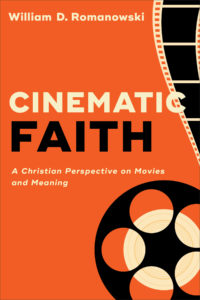 Years in the making, we are very, very glad to get to announce a brand new book by professor Romanowski. As we’ve said, it’s called Cinematic Faith: A Christian Perspective on Movies and Meaning (Baker Academic; $22.99 – OUR SALE PRICE = $18.39) and I’m reading through it happily for the second time. For anyone who likes going to the movies or can’t wait for the next NetFlex DVD to show up (please don’t tell me you watch films on your little phone!) this big book will be an education and a joy. It isn’t preachy and it isn’t simplistic but it isn’t overly academic. If you love movies, you need this book.
Years in the making, we are very, very glad to get to announce a brand new book by professor Romanowski. As we’ve said, it’s called Cinematic Faith: A Christian Perspective on Movies and Meaning (Baker Academic; $22.99 – OUR SALE PRICE = $18.39) and I’m reading through it happily for the second time. For anyone who likes going to the movies or can’t wait for the next NetFlex DVD to show up (please don’t tell me you watch films on your little phone!) this big book will be an education and a joy. It isn’t preachy and it isn’t simplistic but it isn’t overly academic. If you love movies, you need this book.
READING DOESN’T HINDER OUR PLEASURE
Let me get this off my chest right away: reading books about various aspects of our Christian discipleship — work, play, voting, shopping, being a parent, being a choir member, considering schooling or health care or gardening, or vacationing, watching movies, whatever – isn’t going to dull our enjoyment of these good spaces where we live out our lives.
No! Unlike the beloved but confused chorus that says when we turn our eyes to Jesus “the things of earth will grow strangely dim,” the Bible says the opposite: Jesus is the Light of the world. In Him we are given light to see (the Bible is, after all, a light before our path!) So knowing God more deeply and deepening our faith and catching a vision of how it connects to various spheres of society and sides of life allows Christ to shine in all of life – we don’t want our marriages or work or our voting or our church life or our entertainment life to grow dim. We are to let our light shine! John 10:10 promises an abundant life, not a dim life.
READING ENHANCES OUR FAITHFUL ENJOYMENT
However, to really shine, to see God’s common grace in ordinary things, knowing something about those ordinary things is essential. Our enjoyment of making and eating good food is enhanced when we read a thoughtful cookbook! Our enjoyment of sports is better when we know some of the nuances of the game. We can even enjoy politics (Lord help us) when we know something about what we’re voting on and why we get passionate about it. Dare I say that some of us might enjoy sex a bit more if we read a book or two about Godly married life. Reading rock criticism or film studies or a book about the nature of digital culture and the like allows us do what the Bible says: attend to and listen to God’s will revealed in reality. (Psalm 19 says the heavens speak to us; Job says to “listen to the fish” and Isaiah 28 compliments a farmer for learning the science of soil and seed. This is basic to life: wisdom and joy come from knowing where we are and learning something about what we’re doing — whatever it may be. Systematic theology and inner spiritual formation and hearty worship cannot replace the need to pay attention to what Matthew Crawford calls “the world outside your head.” Biblical wisdom always is down-to-Earth, often quite literally. Reading and study is necessary and it can truly help us life in fidelity to God’s good ways. It’s as simple as that.
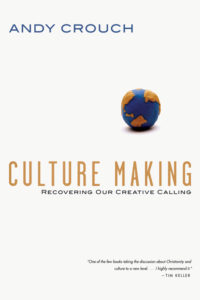 Books help us see and appreciate and develop the creation God has given us. To use the language of Andy Crouch’s essential text, we become Culture Makers who “recovery our creative calling” and can then, as Romanowski puts it, “find God in popular culture.” (By the way, we take Crouch’s Culture Making everywhere we go, too – it’s such a very, very helpful book to help us find meaning and purpose in our day to day lives.)
Books help us see and appreciate and develop the creation God has given us. To use the language of Andy Crouch’s essential text, we become Culture Makers who “recovery our creative calling” and can then, as Romanowski puts it, “find God in popular culture.” (By the way, we take Crouch’s Culture Making everywhere we go, too – it’s such a very, very helpful book to help us find meaning and purpose in our day to day lives.)
Who doesn’t want to understand what it means that we are made in God’s image and therefore called to be creative, involved in culture? Who doesn’t long for more God sightings in daily life? Who doesn’t want all of life to be worship – including, in this case, taking in goofball comedies, romance flicks, or action adventure films? Books like this will help you have more fun at the movies. And, trust me on this: Bill has very eclectic tastes and has a lot of fun at the movies.
(A fun little fact: Bill was led to Christian faith and discipled mostly by a guy who became not only a mentor but one of his life-long best friends. This guy, Dr. Terry Thomas of Geneva College, was himself raised working in a Pittsburgh-area movie theatre that his father managed. Nobody has more fun at the movies than Terry, who Bill mentions in his book. Terry’s love of film, including comedy, is infectious, and Bill learned well.)
MOVIE MUSINGS
One of the great delights of Cinematic Faith are a handful of (sometimes lengthy) “Movie Musing” sidebars where to illustrate his point in a given chapter, Romanowski explores some detail or theme in popular films.
From the “married life” sequence in Up to looking at “Dramatizing Drone Warfare in Eye in the Sky” to a brilliant analysis of history in the movie Lincoln to a fun interpretation of “time loop fiction” by way of a study of (what else?) Groundhog Day to one called “Boy Meets Girl in La La Land” these are all fascinating (even if you haven’t seen the film under consideration.)
Bill has spent considerable scholarly energy studying melodrama (and, for example, Titanic) and he loves Rocky (which, in a “Movie Musing” he calls “A Classical Hollywood Film.”) He offers musings on Blade Runner and The Imitation Game as metaphors, “art and ethics” in  Rear Window, and a great piece called “Narrative, Character and Perspective in The Blind Side” – you’ve got to read that if you enjoyed this movie as much as we have. Through all of these excursions, you can tell that his tastes are not overly high-brow. (Remember his central thesis of Pop Culture Wars that all film and pop artifacts are religiously/philosophically laden and artfully serious, and his central thesis of Eyes Wide Open
Rear Window, and a great piece called “Narrative, Character and Perspective in The Blind Side” – you’ve got to read that if you enjoyed this movie as much as we have. Through all of these excursions, you can tell that his tastes are not overly high-brow. (Remember his central thesis of Pop Culture Wars that all film and pop artifacts are religiously/philosophically laden and artfully serious, and his central thesis of Eyes Wide Open  that we can find signs of life and Godly insight from even pagan popular culture.) Cinematic Faith is hoping to enhance your viewing experiences and help you get more out of your entertainment dollar, not bore you with academic discourse or shame you for enjoying the movies you enjoy. Please know, this isn’t highbrow scholarly theory for snooty cineastes but a thoughtful tool for all of us, whether you like The Kings Speech or the X-Men series or Marvel’s Captain America: Civil War.
that we can find signs of life and Godly insight from even pagan popular culture.) Cinematic Faith is hoping to enhance your viewing experiences and help you get more out of your entertainment dollar, not bore you with academic discourse or shame you for enjoying the movies you enjoy. Please know, this isn’t highbrow scholarly theory for snooty cineastes but a thoughtful tool for all of us, whether you like The Kings Speech or the X-Men series or Marvel’s Captain America: Civil War.
READING WIDELY, VIEWING WIDELY
We loved, by the way, having literary scholar and teacher Karen Swallow Prior in our store last fall helping launch her marvelous book about virtue and literature On Reading Well: Finding the Good Life Through Great Books. She started her talk, as she does in the book, with the advice of old John Milton, who advised that we “read promiscuously.” The word didn’t have quite the immoral overtones in his 1600s that it does nowadays, but even then, the advice struck some as dangerous. Like Prior and her love of a wide range of reading, Romanowski is convinced that watching a lot of movies of different sorts is a good thing. Unlike literature, where reading widely is mostly admired, though, we tend to dismiss a thoughtful, spiritually aware engagement with our popular amusements.
Some think we shouldn’t watch many movies at all and others think it’s all fine, but don’t want to think about it much — who wants to think much, after all, let alone about God’s Kingdom or our moral formation, when we’re vegging out? Anyway, what’s the point of entertainment, after all?
TO ENTERTAIN OR ENLIGHTEN?
Romanowski addresses this a bit in a section called “To Entertain or Enlighten: That Is the Question.” You’ll have to read his answer, but, again: nothing is secular, so we are always being formed, one way or the other, and all moments in life can be avenues for construing meaning and growing as a person made in God’s likeness. Of course, we don’t have to have a steady diet of Schindler’s List and socially conscious documentaries. Remember, the first “Movie Musing” in this book is on Groundhog Day. And did I mention he likes Rocky?
So. What makes Cinematic Faith an important book, besides being a bit of a sequel to the important and popular Eyes Wide Open? We have literally a dozen recent books on faith and film that have come out in recent years. A genre that was once rather provocative and cutting edge has, it seems to me, become almost commonplace. And we don’t sell them as much as we used to.
Movies and digital entertainment (here in a new golden age of TV) are more popular than ever, taking up more of our time than ever before. (Indeed, we just got a new book by Dan Strange called Plugged In: Connecting Your Faith with Everything You Watch, Read, and Play that carries rave reviews by the likes of Bill Edgar and Tim Keller.)
Still, most Christian people, I’d guess, have never read anything about the relationship of faith and entertainment, have never studied any of the many books we stock on this. We really should, you know; like work or relationships or eating or voting, God wants us to take pleasure in this part of our discipleship, but in a fallen world, things can be distorted and depressing. We have to study up, learn more, deeper our curiosity so we can grow in to maturity in these aspects of life.
But what makes this book on film that urgent? Besides my personal loyalty to my old friend and the reputation of his well-respected work at Calvin College, why Cinematic Faith?
SEVERAL GOOD THINGS
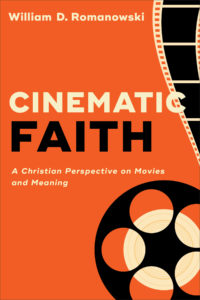 I will name several good things that make this a very important contribution, not only for anyone serious about developing a uniquely and inherently Christian way of approaching film, but for ordinary folks who enjoy a good movie night from time to time.
I will name several good things that make this a very important contribution, not only for anyone serious about developing a uniquely and inherently Christian way of approaching film, but for ordinary folks who enjoy a good movie night from time to time.
First, as I’ve already suggested, the good professor is, in fact, a good professor. He is clear and teacherly about critical approaches — theories or ways of thinking about film. He explains how different schools of thought about film can enhance our own viewing. However, again, this isn’t abstract scholarship for insiders; he specifically says that a good approach should be practical and can “provide reliable insights, and sharpen our judgments.”
He is clear and informative and this will be helpful for you. As he puts it, “appreciating what makes movies artistically interesting and effective can make us better viewers and more creative storytellers.”
So: it is practical and helpful. Who couldn’t use a bit of help in knowing better what makes a film good? With this small investment of twenty bucks and time – okay, a bit longer than it takes to watch a movie – you’ll benefit by enjoying movies more. You can even eat popcorn as you turn the pages and nobody will shush your crunching.
Secondly, Cinematic Faith: A Christian Perspective on Movies and Meaning is valuable because of the author’s main assumptions; that are potent and wise. Again, the primary framework for Romanowski’s work, as we’ve noted, is that there is an insightful, Biblically-informed way to think about film as a cultural artifact, as art. I mentioned (significantly) that he 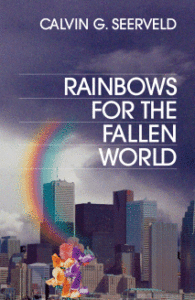 has been informed by the aesthetic theories of Calvin Seerveld (Rainbows for a Fallen World, Bearing Fresh Olive Leaves, Normative Aesthetics, Redemptive Art in Society) and more, including study and conversations with other philosophers of the arts such as philosophers such as Nicholas Wolterstorff and Lambert Zuidervaart as well as pop journalists like the great Steve Turner whose Imagine: A Vision for Christians in the Arts is a great book for anyone wanting to dip into an integrated Christian perspective on art and culture and whose Popcultured I already mentioned.) This means that Bill has worked very hard at a deep level to wonder what it means to take up theories and mindsets that inform dispositions and practices that are not only coherent and consistent from a Christian perspective but that are deeply integral. In this, he doesn’t get all preachy nor does he particularly wear his faith on his sleeve, but he is a reliable, faithful guide. Faith, in his scholarship, is not an afterthought nor is his sense of quality and value in a film based on cheap inspiration. I suppose we don’t have to say it here, but a novel or movie can tell a profoundly immoral story and be brilliantly made and wise; similarly an overtly Christian movie may have a lively religious message but be poorly made. Such films and books can even be dishonest about the way faith works in real life. Some of the most theologically sane movies have be made by deeply troubled filmmakers and some of our worst films are made by otherwise Godly people trying to use the art form for evangelistic purposes.
has been informed by the aesthetic theories of Calvin Seerveld (Rainbows for a Fallen World, Bearing Fresh Olive Leaves, Normative Aesthetics, Redemptive Art in Society) and more, including study and conversations with other philosophers of the arts such as philosophers such as Nicholas Wolterstorff and Lambert Zuidervaart as well as pop journalists like the great Steve Turner whose Imagine: A Vision for Christians in the Arts is a great book for anyone wanting to dip into an integrated Christian perspective on art and culture and whose Popcultured I already mentioned.) This means that Bill has worked very hard at a deep level to wonder what it means to take up theories and mindsets that inform dispositions and practices that are not only coherent and consistent from a Christian perspective but that are deeply integral. In this, he doesn’t get all preachy nor does he particularly wear his faith on his sleeve, but he is a reliable, faithful guide. Faith, in his scholarship, is not an afterthought nor is his sense of quality and value in a film based on cheap inspiration. I suppose we don’t have to say it here, but a novel or movie can tell a profoundly immoral story and be brilliantly made and wise; similarly an overtly Christian movie may have a lively religious message but be poorly made. Such films and books can even be dishonest about the way faith works in real life. Some of the most theologically sane movies have be made by deeply troubled filmmakers and some of our worst films are made by otherwise Godly people trying to use the art form for evangelistic purposes.
Art – visual art, multi-media art, literature or pop music – must not be propaganda. In fact, if a piece traffics in cheap clichés and/or pushy messages, it most likely isn’t very good art, which, by definition, must be allusive and imaginative. I’ve already counseled young Christian rock musicians to lay down their guitars and find a pulpit since they seem to think their calling is not to be an artist but to be a preacher. Preaching is a noble (and, at its best, also an artful) calling. But art – and in this case, movies – aren’t mere vehicles of didactic content. Art must, to cite Emily Dickinson, “tell it slant.” For a film, to work well, it must firstly be a good film; that is, good art, imaginatively telling a story.
We all know when a movie or TV show has been ham-fisted, and we feel like we’ve been manipulated or pummeled with a message. Marxists and progressives tend to do this a lot; evangelical Christians too often, too. Even if we tend to agree with the message, it hasn’t been a particularly edifying few hours of entertainment, has it? A good message is usually diluted by bad form or a propagandistic ethos. Conversely, an artistically nuanced and allusively subtle vision can be quietly powerful.
This insight – which is pretty basic, I suppose – has formed in Bill a professional passion (and, after watching a zillion films over a lifetime, a finely tuned craft) for understanding film not merely in its content, but it its style. And this is what makes Cinematic Faith a major contribution to and somewhat unique within contemporary Christian film studies.
It seems to me that most of our best Christian thinkers in film studies (many published by the same good publishing house as Cinematic Faith who over the last 15 years or so have served up a bounty of faith-based scholarship about culture and review of modern movies) have fallen somewhat for this inadequate perspective of how to evaluate film. That is, they spend a whole lot of time and effort to discern the worldviews of the filmmakers, or doing narrative criticism, exploring the story and the content and the message as if every movie has a moral. As Bill himself notes, this is natural—when telling a friend about a movie you’ve enjoyed or when considering with a date what film to see, we ask, “What’s it about?” Nobody first asks what stylistic vision the cinematographer has and to what effect their film-editor worked, as she spliced scenes with the soundtrack? But you know what? Maybe we should ask that sort of question about form and function, about aesthetics and craft. Because, after all, for a film to work it not only needs a good story but that story is told by artists with a point of view that is embodied in their craft, their form, their filmic skills.
“The critical approach presented in this book,” Romanowski writes, “is anchored in the film itself and its unique capabilities as an audiovisual medium.”
He continues:
Even professional film reviewers tend to rely on, “a heavy dose of plot synopsis,” New York Times critic Manohla Dargis concedes. They pay very little if any attention to the specifics of the medium, to how film makes meaning with images – with framing, editing, mise en scene, with the way an actor moves his body in front of the camera.”
He sets up our expectations for the book reminding us that:
This book does not propose to replace an emphasis on content with an emphasis on form but rather to treat film as both an aesthetic object and an experience – one that can be exciting, pleasurable, boring, disagreeable, or mind blowing.
This is really important stuff that I don’t see enough about in other such books.
ANOTHER GOOD THING: UNDERSTANDING INTERPRETATION
Further, Romanowski also writes about the interplay of production and reception; that is, our response to a movie is a dance with the filmmakers and her skills and perspective. Our “interpretive stance” comes into interaction with the worldviewish perspective of the filmmaker and the way in which they tell their story, which, I’d suppose, is itself embedded with all kinds of cultural baggage; the same story can be told from a variety of viewpoints from varying ideologies and perspectives, and different viewers will find meaning in different ways in this whole arty mess. No wonder the evaluations at Rotten Tomatoes sometimes vary so very vividly that conversations about favorite (or hated) films can be explosive.
Again, in Romanowski’s clear-headed prose, he reviews a major point:
The main concern is with the essential relationship between form (the patterns and techniques used to tell stories), content (the film’s subject), style (the filmmakers distinctive use of patterns and techniques), and perspective (the film or filmmaker’s point of view.)
And, oh my, how he later peels layer after layer of different sorts of interpretation – the surface meaning, and the directors deeper meaning and our own interpretive meanings. In this modern entertainment that blends art and outlook, through film-making style and vision, we somehow come out either enlightened in ways that are consistent with God’s Kingdom or we are recruited to other stories, conscripted (to use James K.A. Smith’s word) into false ways of being in the world. That Bill cites his colleague Jamie will be a touchstone to many who have read Smith’s extraordinary three volume cultural liturgies project (or the one-volume summary version, You Are What You Love.) Interpretation matters as we thereby can be more intentional about what movies shape us and in what way.
FOUR BIBLICAL PRINCIPLES
In the second chapter Romanowski offers in a no-nonsense manner four basic Biblical principles to serve as a guide for a productive engagement with cinema. In a few pages he packs extraordinary insight; for some, they might be new insight, or intuitions articulated in sensible ways.
The first of these ruminations is on the role of the arts (which “enriches by subtle disclosure rather than instant clarity.”) These few paragraphs are not to be missed.
Secondly, he offers a rare insight about the sense of the divine that Christian Scripture tells us everyone has, making, therefore, everyone somehow religious, and every film some sort of tribute to the filmmakers or directors “ultimate concerns.” No one is neutral or somehow not making meaning or framing life by some lights; all movies have this avoidable religious/ideological commitment to something.
Thirdly, Romo writes about how faith encompasses all of life and therefore “we should expect movies to deal with our full humanity.” Faith, in this approach, is the context for thinking about all films, not a topic that is only treated in some “religious” films. Our Christian convictions are like a lens through which we see all of life and can help us evaluate all films – that is, we aren’t just interested in overtly religious messages.
Lastly in this short section he explains what the Reformed tradition, at least, calls “common grace” – which carries the reminder that even if we always have a critical, aware, posture, we must never “lose sight of the fact that all people have the capacity for creativity and truthfulness.” Oh was a generous and important insight, especially in these days of deep polarization.
THE GOLDEN RULE FOR FILM CRITICISM
And then, Mr. Romanowski gives us The Golden Rule for Film Critique:
Together these four principles lay the groundwork for a two pronged approach that is both discerning and exploratory, characterized by encounter and dialogue. With this approach comes a certain attitude. This way of doing film analysis recognizes and values diverse perspectives, while also maintaining the importance of one’s own perspective in thinking critically about cinema.
The next few pages are, again, worth the price of the book, reminding us of the ups and downs of this process and posture. We must understand the value system of the film. Yet, we must be open to how other people (made in God’s image) experience and interpret life. Movies change us, and this isn’t altogether a bad thing.
Read this great little excerpt:
How can we critically engage film in imaginative ways that are mindful of and consistent with a faith perspective while also respecting the filmmakers vision and artistic expression? Or, to give it a slightly different twist, how are we to engage movies that are artistically praiseworthy and culturally significant but contain ideals and assumptions that might run against the grain of our own? Becoming impartial critics — fair and just in our judgments, and rising above our own prejudices – is easier said than done. Who would deny adhering to one’s own agenda when thinking about a film? The risk, of course, is that we might fail to refuse to give a filmmakers viewpoint a fair appraisal, or we might find it difficult to even appreciate an honest artistic effort.
Cinematic Faith advises us to engage a film on its own terms, “to resist the temptation to unfairly impose your own point of view, which adhering to your own vantage point as a place of reference to understand and think critically about the film. This calls for,” the author continues, “an approach that plays itself out along the border between conviction and humility.”
And with this, we’re really off to the movies!
MOVIEMAKING MAGIC
Chapter three is called “Moviemaking Magic” and here Romanowski unpacks“poetic portals and the power of perspective.” He starts with a splendid reminder of the Scorsese film Hugo, which is adapted from the great children’s book The Invention of Hugo Cabret – a spectacular YA story about a turn of the twentieth century French filmmaker. This is a great chapter reminding us about how stories really work, how filmmakers interpret reality and how we viewers then bring our own deeply felt value judgments to the experience of the film. He cites some other film scholars who talk about “imaginative orderings of experience” and a few other heady notions but this is really important and very interesting.
FORM AND CONTENT
He moves then into a chapter that might be considered a key one for Cinematic Faith, working more on what makes this book particularly special – the matters of style and craft and film-making (and not only content or message.) This part is called “Creating an Illusion of Reality: Film Form and Content.” Here we get into the weeds a bit, but it’s really fascinating. His first discussion as he teaches us about this is of 1995’s witty coming-of-age film set in Beverly Hills high school, Clueless. (Did you know it is loosely based on Jane Austen’s Emma and critics said it had a “razor sharp script”?) Professor R names a dozen other movies in as many pages exploring this dual emphasis of style and content, of medium and message, if you will. I am no expert on this, so I learned a lot and I am convinced it is important.
I recall decades ago Francis Schaeffer saying that, just for instance, a movie about nihilism, say, couldn’t be well told if it was lighthearted; form somehow is related to function, right? Bill used to give talks about this stuff when we worked in campus ministry and I recall him speaking about how a beautiful/joyous concept can’t be captured in ugly forms; different styles of songs are suited for different settings – from a wedding night, say, or to a tragic funeral. One can’t express the heart-wrenching sadness of a tragic death in a peppy little disco tune, right? Good cheer and gravitas have their places, and aesthetic form carries much of the weight of these human emotions, in music and TV and dance and other art forms. And so it is in film, perhaps even with style trumping content, sometimes. Ideally, Romanowski says, “form and content are essential and mutually dependent aspects of a film — two sides of the same coin, so to speak.”
So, naturally, we should know a bit about cinematic tools such as narrative, cinematography, production design, sound, acting, and editing. Under his helpful tutelage we learn not just what happens in a film, but the way it happens.
And – bam! pow! — he sure gives us lots of examples of just what he’s talking about. From the special effects team in Harry Potter and the Half-Blood Prince showing the Death Eaters flying to some sexy opening shots in Top Gun that places gender in the center of the story, to great, if brief, comments about the much-awarded cinematography of Emmanuel Lubezki (who, Romanowski reminds us, won an Oscar three years in a row for Gravity (2013), Birdman(2014), and in 2015 for The Revenant) this section is chock full of quick examples and fun illustrations and even movie stills.
On and on we go through this book, covering all sorts of things that are fun to learn, helpful to realize, wise reminders and fresh formulations. This book could serve as a good read for a film-going group or a college class or a book club. Again, you’ll enjoy movies more and be more faithful (Christian) viewers if you learn a bit. It shows how filmmakers connect the dots by exploring further the relationship between “style and meaning.”
Romanowski opens this good chapter by highlighting a debate in Commonweal about a Catholic film critic who appreciated a fundamental moral center to movies like Pulp Fiction. In answering the popular critics who thought he went too far in affirming the goodness of a violent film, reviewer Richard Alleva replies, “I will persist in recognizing the morality in art by exploring the art in art.” What an interesting line; Romanowski jumps from there into the insights we can get when we have enough awareness of these things to relate a film’s form and content and style – especially when the film itself is artful enough to harmonize these features.
EVALUATION & CRITICISM
This notion that we can be redemptively Christian in our interpretations (by being savvy about film style and enjoying a movie as an artfully constructed story) has long been part of Bill’s strong repertoire. But his scholarship over the years (in academic film studies journals and papers presented at mainstream academic conferences) has been on the “American style” redemption that movies often present us (and how those often violent myths are a different sort of redemption than that offered by Christ and the Christian gospel.)
Others have written about this as well, but I appreciate Romanowski’s take – in one chapter he looks at Titanic “a consummate Hollywood blockbuster film” (which explores melodrama) and in another chapter (“The Yellow Brick Road to Self Realization”) he looks at classical Hollywood cinema and the tropes and values inherent in this sort of storytelling. You’ll be surprised to see how he weaves together comments about Oz and Casablanca, The Big Short and (get this) Spike Lee’s Do the Right Thing.
Even those not interested in action adventure movies will appreciate the chapter called “A Man’s Gotta Do What a Man’s Gotta Do” in which he offers his seriously Christian worldview and faith-based guidelines to explore a whole host of important issues in this popular genre. From stuff about gender and violence and heroism he brings new insights to films that he sees connect to this particularly American mythology. He has a “Movie Musing” here on 2014’s Noah – “a big-budget Hollywood epic drama conceived as a variation of sorts on the American mono-myth.” That was a surprising (and compelling) take on what I supposed was just a nod to the religious market by doing a Bible story.
 And then he goes from he assessment of the conventional American myths to a full-on study of gender in mainstream Hollywood. As a guy with long-standing sensitivity to the critiques of machismo, a critique he has himself been making for decades, this chapter, called “Stop Taking My Hand!” (which is a line from Rey in Star Wars: The Force Awakens), looks at “gendered cultural patterns” about the ideal man or woman. Do these images reflect our values and assumptions or shape them? What might the recent interest in strong female characters bode for film and storytelling? With explorations of Katniss Everdeen (The Hunger Games) to Hilary Swank’s awarded winning Maggie Fitzgerald being trained in boxing by Clint Eastwood’s character in Million Dollar Baby, Romanowski brings fascinating and I think wise insight to questions of gender and sexuality and relationships.
And then he goes from he assessment of the conventional American myths to a full-on study of gender in mainstream Hollywood. As a guy with long-standing sensitivity to the critiques of machismo, a critique he has himself been making for decades, this chapter, called “Stop Taking My Hand!” (which is a line from Rey in Star Wars: The Force Awakens), looks at “gendered cultural patterns” about the ideal man or woman. Do these images reflect our values and assumptions or shape them? What might the recent interest in strong female characters bode for film and storytelling? With explorations of Katniss Everdeen (The Hunger Games) to Hilary Swank’s awarded winning Maggie Fitzgerald being trained in boxing by Clint Eastwood’s character in Million Dollar Baby, Romanowski brings fascinating and I think wise insight to questions of gender and sexuality and relationships.
He does not particularly address films about LGBTQ characters, by the way, but his framework about being critical of American mythologies of traditional gender assumptions (he reads the Bible as offering a trajectory towards egalitarian justice) could provide tools for a positive Christian engagement with all sorts of films around those themes, as well. There are a host of other topics and issues in contemporary culture that his film studies approach will prove generative for us as we seek to “find God in popular culture.” His gift to us, besides lots of musings on lots of specific movies, is a deeper framework and wise orientation to film interpretation, appreciation, and evaluation.
There’s plenty more in Cinematic Faith, from a strong reminder that the routine vision of American individualistic self salvation in many films is a far cry from the core tenant of being save by God’s grace, to a unique study of The Blind Side, to a wonderful epilogue that draws on Shrek. For those with eyes to see, all films can and do express meaning and “communicate life perspectives.” They can help us see and they can help us care.
Can knowing a bit about how they are made and how they work on us and how to critically engage them help us discern those that “resonate with a biblical outlook and so deepen our awareness of the ways that humans bear God’s image and flourish through acts of love, forgiveness, and generosity?” This book insists yes. We can truly enjoy movies and be challenged and grow through their artful style – especially if we know something about it all.
Cinematic Faith: A Christian Perspective on Movies and Meaning stands out as a large gift to anyone that who enjoys movies and film and certainly anyone who is attempt to be intentionally faithful in “finding God in popular culture.”
FILM AND THEOLOGY?
A final comment about why on some occasions, it seems, church folk (almost all of whom surely watch TV and movies) seem surprised when we have books displayed at their events like Cinematic Faith: A Christian Perspective…
I think it is because some religionists and many common people in the pew seem to think that all God cares about is church and maybe the study of theology.
And, you see, technically speaking, Romanowski’s book is not about theology (proper) or even “in dialogue with” theology or church leaders. It is deeply Christian, particularly standing in this reformational tradition, that doesn’t favor theology over other areas of study. He teaches at a Christian college, but he isn’t a theologian. He attends his church, but isn’t primarily a churchman. He’s a (Christian) film professor and a movie-watcher. He wants to offer us a faith-based, Christian perspective on film making and film viewing, for film makers and film viewers whether they do theology or church work, or not.
He wants to equip us to live our ordinary faith before God with intentionality in ways that are distinctive to this side of life – leisure, entertainment, the arts. That is, he isn’t pretending to do theology and he isn’t particularly asking theologians to chime in. And I think that is as it should be.
And yet, that is an approach that is so popular (also in the sciences, it seems) that it’s nearly a school of thought, with many books that invite us to listen in on a conversation between film buffs and theologians. Can you see how that is a bit different that what Romanowski’s project is? He doesn’t privilege theologians and the book isn’t about theology: it’s about movies and entertainment and those moments of allusion and imagination and nuance and artfulness we experience went we enter into a creatively told story. It is for artists and those of us eager to open up our aesthetic side of life, even in our entertainments, our play, our going to the movies. The recent movement of conversations between film-makers and theologians is fascinating, and many books with that approach have chapters that are nothing short of brilliant. But most are doing this rather arcane project – uniting Christian movie lovers with Christian theological scholars. Romanowski, in Cinematic Faith, as he has done throughout his career, has engaged mainstream film studies and taught us ordinary folks how it all works. Informed by good scholarship – from an integral Christian social imaginary and Biblically-grounded life perspective, to be sure – he helps us all be more attentive and faithful, even in our entertainments. In this regard, Cinematic Faith is for us all.
ONE MORE GREAT RECENT BOOK ABOUT FILM & FAITH
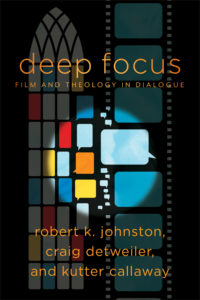 Deep Focus: Film and Theology in Dialogue Robert Johnston, Craig Detweiler and Kutter Callaway (Baker Academic) $26.99 As I’ve hinted above, I’m not inclined to be particularly interested in seeing what theologians, as such, have to say about film studies. A book about movies that has churchy stained glass on the cover strikes me as awkward. This sort of approach just seems somehow off to me, as if we have to somehow sanctify the ordinary act of watching movies not by thinking Christianly about movies (as Romanowski would argue) but that we need these professional thinkers about theology to make it so.
Deep Focus: Film and Theology in Dialogue Robert Johnston, Craig Detweiler and Kutter Callaway (Baker Academic) $26.99 As I’ve hinted above, I’m not inclined to be particularly interested in seeing what theologians, as such, have to say about film studies. A book about movies that has churchy stained glass on the cover strikes me as awkward. This sort of approach just seems somehow off to me, as if we have to somehow sanctify the ordinary act of watching movies not by thinking Christianly about movies (as Romanowski would argue) but that we need these professional thinkers about theology to make it so.
For what it is worth, I’d similarly say that that businesspeople need a Christian view of economics, not a “theology” of business and that, likewise, Christians in the sciences, say, need a faithful view of their research in God’s good world, a Christian approach to to the philosophy of science, less a “dialogue” with “theologians.” That these important authors of Deep Focus: Film and Theology in Dialogue (who have also done several other significant books that emerged out of their Reel Spirituality Institute at Fuller Theological Seminary) are all fine gents who served at a seminary probably makes this approach a natural in their world, I suppose. And, in this case, it sure is interesting, I’ll give that. Wow.
I just seem to discern – and I admit this may be a little unfair – a lurking dualism, rooted in the “sacred vs. secular” dichotomy that actually evolved in the church from pagan Plato, in this talk about a “secular” profession (business, science, art) needing to be “in conversation with” theology. Theology is an interesting, important, specialty, but why somebody with that specialty is privileged to be a necessary conversation partner conjures up for me an image of some some sacred/spiritual icing on the secular cake where faith is an ad-on, perfunctory. I’m sure they wouldn’t put it this way, but it nearly sounds as if secular movies can’t be discussed Christianly with Christianly-conceived aesthetic theories and coherent film studies approaches by movie makers and movie goers unless the religious guys from the theology department bless it all. It’s a caricature, I know, and a bit picky on my part, but it’s what this “theology of..” or “theology and…” lingo too often connotes.
Having said that, I was gobsmacked by how much I loved this Deep Focus: Film and Theology in Dialogue book.
Yes, I loved this book and found it hard to put down.
I can’t explain it all in detail now, but allow me to say I think this is the best volume yet to come out of this Reel Spirituality movement, and there have been some good ones (we we stock them all.) The authors really know their stuff, tell some personal stories about moments they’ve had at the Cineplex and I found it very enjoyable, quite stimulating, and even provocative. I’d highly recommend it as a follow-up or companion to Romanowski’s must-read Cinematic Faith.
Listen to Stefanie Knauss of Villanova University as she raves about Deep Focus:
Offering great movie choices, insightful analysis, wonderful prose, rich knowledge about film and theology – this book has it all. It’s a great read for all who are interested in the field of film and theology and offers the necessary tools to engage in this conversation in a knowledgeable, substantial way.
The publication of this new book this season – called “engaging, fluent and timely” – is curious. Romanowski, in his neat book, implies (but does not rail out loud) that too many Christian film studies volumes overestimate the role of content and underestimate the role of style, the art of the filmmaking craft. As we’ve seen above, Professor Romanowski suggests this isn’t adequate, that we must see how the aesthetics of the art of the filmmaking and directing and acting crafts influences how we then engage the movies themselves, as films. He suggests, as I’ve implied, that not enough of the Christian books on film do this that much.
And he’s on to something. Funny — I read one academic review in a scholarly journal once suggesting this same thing; a thoughtful Christian film prof was saying we simply have to get beyond a moralistic evaluation of a film’s content/message and pay equal attention to the art of the film and its production. And then that scholar continued on with the essay citing example after example of content, with hardly any word about angle of vision or editing or sound or even acting. That is, even those who say that we need a more aesthetically nuanced view of the art of movie-making, rarely get around to doing it.
Happily Deeply Focused: Film and Theology in Dialogue really does do a good measure of this, making it a very up-to-date, delightful, informative, and valuable contribution to those wanting a better Christian understanding of film. In this regard, at least, I’m sure Romanowski would applaud Deep Focus and how it helps us see the importance of the very stuff he is writing about. Kudos to Johnson, Detweiler, and Kutter for making this a central – and very enjoyable – part of Deep Focus.
There are three good chapters in Deep Focus that are entitled “Fade In: A Narrative Lens” and “Sights & Sounds: An Audiovisual Lens” and “Where Form Meets Feeling: A Critical Lens.” This is really, really good stuff, although I suspect I appreciated it all the more because I had just finished Cinematic Faith which alerted me to the need for such good material.
These authors do bring rather in-house theological terms to how they approach their topic – seeking an “ecclesial lens” and a “theological lens” and an “ethical lens” in other chapters.
In the chapter offering “an ecclesial lens” they are showing how God’s people in Christ’s church have been diverse in how we’ve engaged the culture and have held differing postures of appreciating or appropriating modern art, cinema, and popular movies. This is a bit obtuse at times, but they are trying to invite us to get beyond our historical debates within the church about film and the popular arts. They bring in lots of theologians (Tillich, Niehbur) and spirituality writers who will appeal to those who want this sort of churchy dialogue. It is interesting to me that the neo-Calvinist Romanowksi mostly quotes film critics and Christian philosophers and reviewers and rarely cites theologians as such.
The Deep Focus chapter exploring a theological lens is subtitled “Discerning Mystery” and, again, it is fascinating. I truly enjoyed it – like I loved Movies are Prayers by Josh Larson. The trio of Reel Spirituality authors tell very moving stories, actually, about their own film-going experiences and make a case for watching movies as a spiritual experience. Well, who doesn’t want that? I really appreciate this, and use this sort of “practicing the presence of God” sort of language to a contemplative approach to life fairly regularly. But, again –why must an experience of the arts before God’s face in God’s world be somehow a “spiritual” experience? Why can’t it just be a human experience, aesthetically charged as storytellers edify us with their search for meaning? What if we just have a good belly laugh or found ourselves strangely moved by touching romance? Sure these “common grace” gifts are a blessing from God but must they become mysterious encounters with the numinous in luminal space? You know what I mean?
Again, I almost sense a lurking dualism here, as if the “secular” art of movies has to be justified by bringing it into dialogue with theology and validated if it is a devotional experience. Sure some movies move us to tears and for Christians their tears are holy unto the Lord. But this move to make movies “spiritual” in search of an encounter with “mystery” somehow seems a bit fragmented. We don’t have to have a “dialogue” with theologians or have a “spiritual” experience to watch a movie faithfully.
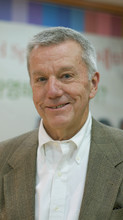
I suspect that these scholars would all agree, actually, so perhaps I should just receive their deep focus approach as another helpful tool for all of us to sense God’s presence in all things. There is absolutely no doubt that Johnston and Detweiler and Callaway are real film buffs and it is clear they have friends, literally, in the film scene in Hollywood. (Fuller Theological Seminary is near Hollywood and they’ve been in extraordinary discussions with real filmmakers and producers and directors, with those who write 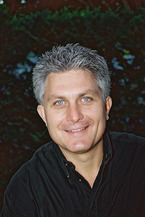
 screenplays and win awards for costuming and who are actors and actresses on the silver screen. They know their stuff and they’ve offered us important, inspiring stuff. In a back cover blurb, Terry Lindvall calls them “ophthalmologist of the cinema.” I love that!
screenplays and win awards for costuming and who are actors and actresses on the silver screen. They know their stuff and they’ve offered us important, inspiring stuff. In a back cover blurb, Terry Lindvall calls them “ophthalmologist of the cinema.” I love that!
As faith leaders who are obviously serious disciples of Jesus, we should listen to them and their good call to media literacy. Lindvall is correct in saying that:
This stellar work invites readers to join an ongoing conversation among some of the most cinematically literate companions one can find.
So, pass the popcorn and let’s get going, reading Cinematic Faith: A Christian Perspective on Movies and Meaning and Deep Focus: Film and Theology in Dialogue. Let’s surprise our churchy folks and show that followers of Jesus do not keep their faith to themselves, cordoned off from real, ordinary life. Lets help get that surprising message out there — that God cares about all of life and that we can (we must!) find ways to relate Sunday faith to Monday work as well as to our entertainment habits. Learning to be intelligent and wise and faithful in our discussion of and appreciation for contemporary movies is a great way to work that out, learning to discern God’s power and presence even in popular culture.
Enjoy these two great new books, or any others I mentioned, at our BookNotes 20% off. Our order form (below) is secure so you can enter credit card information safely, or you can hit “inquire” if you have any questions, need prices or availability on want to chat. We’re at your service. And who knows, maybe we’ll see you at the movies!
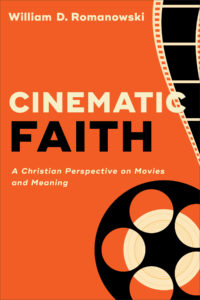
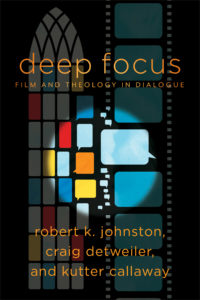
BookNotes

SPECIAL
DISCOUNT
20% OFF
ANY BOOK MENTIONED
+++
this takes you to the secure Hearts & Minds order form page
just tell us what you want
if you have questions or need more information
just ask us what you want to know
Hearts & Minds 234 East Main Street Dallastown PA 17313
read@heartsandmindsbooks.com
717-246-3333
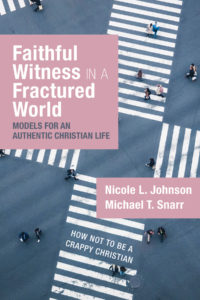 Faithful Witness in a Fractured World: Models for an Authentic Christian Life – How Not to Be Crappy Christian by Nicole L. Johnson & Michael T. Snarr (Cascade) $18.00 As I explain below, a collection of great stories of ordinary folks doing good work in taking up their vocations as social activists with principles and insights gleaned from traits they each exhibited. A great study, important for all of us.
Faithful Witness in a Fractured World: Models for an Authentic Christian Life – How Not to Be Crappy Christian by Nicole L. Johnson & Michael T. Snarr (Cascade) $18.00 As I explain below, a collection of great stories of ordinary folks doing good work in taking up their vocations as social activists with principles and insights gleaned from traits they each exhibited. A great study, important for all of us.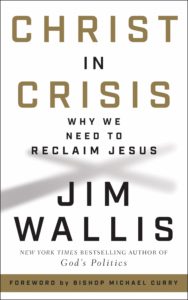 Christ in Crisis: Why We Need to Reclaim Jesus by Jim Wallis (HarperOne) $25.99 . The latest by Sojourners founder, a book he says may be the most important one he’s ever done. It’s about questions Jesus asked and their implication for us today in these trying times. It’s brand new and I describe it a bit, below.
Christ in Crisis: Why We Need to Reclaim Jesus by Jim Wallis (HarperOne) $25.99 . The latest by Sojourners founder, a book he says may be the most important one he’s ever done. It’s about questions Jesus asked and their implication for us today in these trying times. It’s brand new and I describe it a bit, below.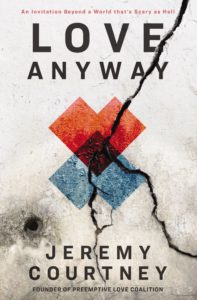 Love Anyway: An Invitation Beyond a World That’s Scary as Hell byJeremy Courtney (Zondervan) $17.99 . The brand new set of memories and stories from a peace activist who lives in the war-zones and needy places of the Middle East, learning to see beauty, stand for justice, and live beyond our fears into a better world. Wow.
Love Anyway: An Invitation Beyond a World That’s Scary as Hell byJeremy Courtney (Zondervan) $17.99 . The brand new set of memories and stories from a peace activist who lives in the war-zones and needy places of the Middle East, learning to see beauty, stand for justice, and live beyond our fears into a better world. Wow.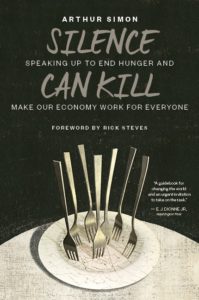 I hope you saw the last BookNotes column which featured two serious books about world and domestic hunger. Silence Can Kill: Speaking Up to End Hunger and Make Our Economy Work for Everyone by our friend Art Simon (founder of the citizen’s anti-hunger lobby, Bread for the World) is a very important new book, up-to-date and informative. Although fewer children are starving to death than 50 years ago, this dare not lull us towards an optimistic apathy; needless starvation and chronic, painful poverty are evils that must be battled. Bread for the World may be the most important and effective anti-poverty organization because of the legislative work they do and the sheer scope of the impact of public policy (from foreign aid to funding for TANF and SNAP and the like.) You should read that book and learn how (and why) it all works.
I hope you saw the last BookNotes column which featured two serious books about world and domestic hunger. Silence Can Kill: Speaking Up to End Hunger and Make Our Economy Work for Everyone by our friend Art Simon (founder of the citizen’s anti-hunger lobby, Bread for the World) is a very important new book, up-to-date and informative. Although fewer children are starving to death than 50 years ago, this dare not lull us towards an optimistic apathy; needless starvation and chronic, painful poverty are evils that must be battled. Bread for the World may be the most important and effective anti-poverty organization because of the legislative work they do and the sheer scope of the impact of public policy (from foreign aid to funding for TANF and SNAP and the like.) You should read that book and learn how (and why) it all works.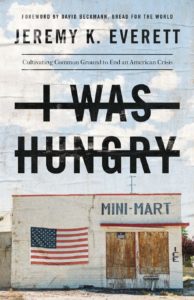 Another book I highlighted in that review was I Was Hungry: Cultivating Common Ground to End an American Crisis by Jeremy Everett (Brazos; $16.99) which documents the exciting work done by the Texas Hunger Initiative. I loved this book and the energetic stories of faith communities partnering with civic and even governmental agencies. No matter what state your in – the play of words and smile – you need this book!
Another book I highlighted in that review was I Was Hungry: Cultivating Common Ground to End an American Crisis by Jeremy Everett (Brazos; $16.99) which documents the exciting work done by the Texas Hunger Initiative. I loved this book and the energetic stories of faith communities partnering with civic and even governmental agencies. No matter what state your in – the play of words and smile – you need this book! 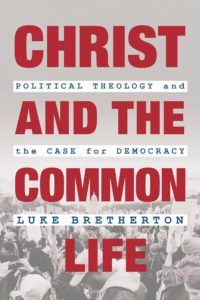 There are plenty of more theoretical books, too. Think of the book released just this past summer, the magnum opus of Duke University scholar Luke Bretherton entitled Christ and the Common Life: Political Theology and the Case for Democracy (Eerdmans; $49.00.) It has been called “a tour de force”, a “monumental achievement”, “a transformative contributions” and “impressively expansive.” He moves from secularity to pluralism to democratic ideals to what notions of neighborliness mean for our public thinking and, everyone agrees, breaks new and important ground.
There are plenty of more theoretical books, too. Think of the book released just this past summer, the magnum opus of Duke University scholar Luke Bretherton entitled Christ and the Common Life: Political Theology and the Case for Democracy (Eerdmans; $49.00.) It has been called “a tour de force”, a “monumental achievement”, “a transformative contributions” and “impressively expansive.” He moves from secularity to pluralism to democratic ideals to what notions of neighborliness mean for our public thinking and, everyone agrees, breaks new and important ground.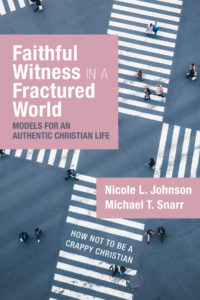 The brand new book called Faithful Witness in a Fractured World: Models for an Authentic Christian Life – How Not to Be Crappy Christian by Nicole L. Johnson & Michael T. Snarr (Cascade) $18.00 [our sale price = $14.40] makes an important claim – that many young adults are drifting from faith (and sometimes loudly denouncing traditional religion) because it does not do this. Big name televangelists and Christian right loud-mouths condemn gays and mock science and want to push their views on everybody, but it seems they do little to care about the hurting, the disillusioned, the poor or oppressed. Unlike Francis Schaeffer – who some on the Christian right seem to claim to like, even if they haven’t read his more serious works – they don’t show that they want to weep with those who weep over our culture’s lack of compassion and the injustices that are so prevalent these days, from gross injustices in immigration policy to police violence to species extinction to sexual abuse cover-ups, even in exceedingly pious evangelical churches. They don’t offer young seekers “honest answers to honest questions.” They just want to fight culture wars and defeat anybody they don’t like.
The brand new book called Faithful Witness in a Fractured World: Models for an Authentic Christian Life – How Not to Be Crappy Christian by Nicole L. Johnson & Michael T. Snarr (Cascade) $18.00 [our sale price = $14.40] makes an important claim – that many young adults are drifting from faith (and sometimes loudly denouncing traditional religion) because it does not do this. Big name televangelists and Christian right loud-mouths condemn gays and mock science and want to push their views on everybody, but it seems they do little to care about the hurting, the disillusioned, the poor or oppressed. Unlike Francis Schaeffer – who some on the Christian right seem to claim to like, even if they haven’t read his more serious works – they don’t show that they want to weep with those who weep over our culture’s lack of compassion and the injustices that are so prevalent these days, from gross injustices in immigration policy to police violence to species extinction to sexual abuse cover-ups, even in exceedingly pious evangelical churches. They don’t offer young seekers “honest answers to honest questions.” They just want to fight culture wars and defeat anybody they don’t like.
 Enter, as your guides, Niki Johnson and Michael Snarr, friendly and popular profs at a small liberal arts college in Ohio. As a religious studies teacher (and former campus minister) and poly sci teacher (who has served with Christian Peacemaker teams and other lively activist groups), these two listen well to their young students, work eagerly with the emerging adults these college students are, and help them navigate the big questions of their search for direction, their making of meaning, their grappling with the faith of their childhood and their new experiences in college. Like most caring professors, they do more than relay information in the classroom but are accompanying students on a journey of discovery and walking alongside them in these critical years.
Enter, as your guides, Niki Johnson and Michael Snarr, friendly and popular profs at a small liberal arts college in Ohio. As a religious studies teacher (and former campus minister) and poly sci teacher (who has served with Christian Peacemaker teams and other lively activist groups), these two listen well to their young students, work eagerly with the emerging adults these college students are, and help them navigate the big questions of their search for direction, their making of meaning, their grappling with the faith of their childhood and their new experiences in college. Like most caring professors, they do more than relay information in the classroom but are accompanying students on a journey of discovery and walking alongside them in these critical years.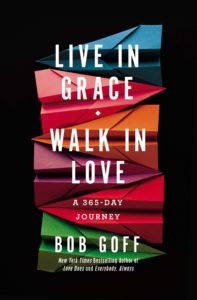 up causes, serving their neighbors, living self-sacrificially to help others, being servants of the poor and winsome agents of the sorts of goodness Bob Goff describes in Love Does and Everyone Always. Bob has an all-new devotional coming out mid-October, by the way, called Live in Grace, Walk in Love: A 365-Day Journey (Thomas Nelson; $16.99.) You may want to pre-order that from us at our 20% off discount. I suspect we’ll have it a bit early.
up causes, serving their neighbors, living self-sacrificially to help others, being servants of the poor and winsome agents of the sorts of goodness Bob Goff describes in Love Does and Everyone Always. Bob has an all-new devotional coming out mid-October, by the way, called Live in Grace, Walk in Love: A 365-Day Journey (Thomas Nelson; $16.99.) You may want to pre-order that from us at our 20% off discount. I suspect we’ll have it a bit early.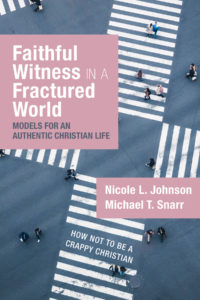 Which is what makes “How Not to Be a Crappy Christian”, that is, Faithful Witness in a Fracture World, so very, very good. It follows the lives of a handful of people the authors admire, some who are former students that they’ve come to know well, that are living out faith in concrete ways, in authentic ways, sometimes in rather dramatic ways. But they are fairly normal people, doing good work but nothing that will catapult them to international fame. Our authors call them “unsung.” These folks are living what John Perkins once called “a quiet revolution.”
Which is what makes “How Not to Be a Crappy Christian”, that is, Faithful Witness in a Fracture World, so very, very good. It follows the lives of a handful of people the authors admire, some who are former students that they’ve come to know well, that are living out faith in concrete ways, in authentic ways, sometimes in rather dramatic ways. But they are fairly normal people, doing good work but nothing that will catapult them to international fame. Our authors call them “unsung.” These folks are living what John Perkins once called “a quiet revolution.” own image and members of his subversive, counter-cultural community. This has huge, huge, socio-political implications and although none of the characters described in Faithful Witness in a Fractured World are professional Biblical scholars, they would, I think, resonate with the anti-Empire, pro-justice themes in the detailed exploration in Romans Disarmed: Resisting Empire/Demanding Justice by Sylvia Keesmaat & Brian Walsh (Brazos Press; $26.99.) If you missed my review of that stunning book, check it out, HERE.
own image and members of his subversive, counter-cultural community. This has huge, huge, socio-political implications and although none of the characters described in Faithful Witness in a Fractured World are professional Biblical scholars, they would, I think, resonate with the anti-Empire, pro-justice themes in the detailed exploration in Romans Disarmed: Resisting Empire/Demanding Justice by Sylvia Keesmaat & Brian Walsh (Brazos Press; $26.99.) If you missed my review of that stunning book, check it out, HERE.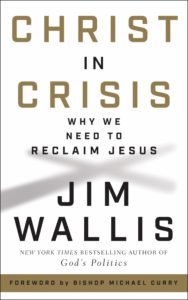 Christ in Crisis: Why We Need to Reclaim Jesus Jim Wallis (HarperOne) $25.99 This brand new book just arrived a few hours ago so I’ve hardly got a chance to look at it. I wish I had an earlier version, or took time to study it before telling you about it, but it so fits this week’s theme that I simply have to announce it. I’m very excited.
Christ in Crisis: Why We Need to Reclaim Jesus Jim Wallis (HarperOne) $25.99 This brand new book just arrived a few hours ago so I’ve hardly got a chance to look at it. I wish I had an earlier version, or took time to study it before telling you about it, but it so fits this week’s theme that I simply have to announce it. I’m very excited.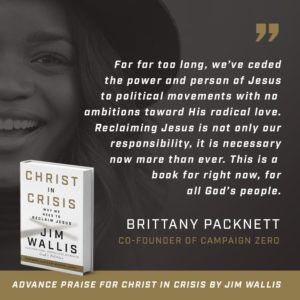 And so, has the church become captive to the modern American Babylon? This was an early theme in Sojourners when they were more obviously influenced by William Stringfellow and Daniel Berrigan and the like. Things were dire, and this radical “politics of Jesus” was counter-imperial, helping us say “no” to Empire and power and such. It may be the crass compromise of the evangelical right in these Trump years may have shaken Jim back to his roots – a call to conversion to the ways of Jesus.
And so, has the church become captive to the modern American Babylon? This was an early theme in Sojourners when they were more obviously influenced by William Stringfellow and Daniel Berrigan and the like. Things were dire, and this radical “politics of Jesus” was counter-imperial, helping us say “no” to Empire and power and such. It may be the crass compromise of the evangelical right in these Trump years may have shaken Jim back to his roots – a call to conversion to the ways of Jesus.
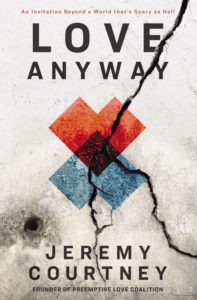 Love Anyway: An Invitation Beyond a World That’s Scary as Hell Jeremy Courtney (Zondervan) $17.99 I can’t tell you how glad we are to get to announce this book by a friend we respect immensely. We’ve only been together two or three times, I thinks – once for a great evening when he allowed us to host him at our church as he shared about his first book, Preemptive Love and the amazing organization he created mostly arranging heart surgeries for children in the radiation enhanced war zones of Iraq.
Love Anyway: An Invitation Beyond a World That’s Scary as Hell Jeremy Courtney (Zondervan) $17.99 I can’t tell you how glad we are to get to announce this book by a friend we respect immensely. We’ve only been together two or three times, I thinks – once for a great evening when he allowed us to host him at our church as he shared about his first book, Preemptive Love and the amazing organization he created mostly arranging heart surgeries for children in the radiation enhanced war zones of Iraq. Some of these chapters are fairly short and they seem to have the feel of a memoir. There are memories and stories galore, Biblical insight, missionary bravado, honest testimony of his fear and brokenness. He and his family have seen so much and I hope you, like me, can’t wait to read about it.
Some of these chapters are fairly short and they seem to have the feel of a memoir. There are memories and stories galore, Biblical insight, missionary bravado, honest testimony of his fear and brokenness. He and his family have seen so much and I hope you, like me, can’t wait to read about it.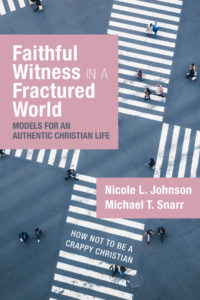
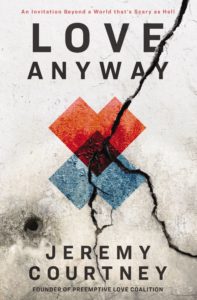



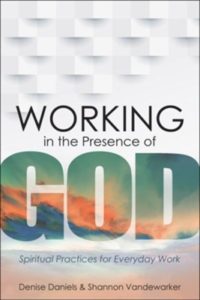 did on this topic and I’m sure if you click through on those you will learn about books you haven’t heard of, religious ones and more general ones. There are so many resources to help us think about our careers and callings, the good and bad of our working lives. And new ones keep coming – for instance, any day now we’ll have the long-awaited Working in the Presence of God: Spiritual Practices for Everyday Work by Denise Daniels & Shannon Vanderwarker (Hendrickson; $24.95.) If you missed that column, skim back to our past BookNotes and check out those links. You won’t want to miss that James Taylor video!
did on this topic and I’m sure if you click through on those you will learn about books you haven’t heard of, religious ones and more general ones. There are so many resources to help us think about our careers and callings, the good and bad of our working lives. And new ones keep coming – for instance, any day now we’ll have the long-awaited Working in the Presence of God: Spiritual Practices for Everyday Work by Denise Daniels & Shannon Vanderwarker (Hendrickson; $24.95.) If you missed that column, skim back to our past BookNotes and check out those links. You won’t want to miss that James Taylor video!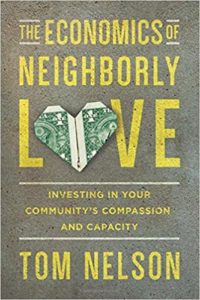 One of the books that Tom Nelson wrote that I didn’t mention the other day is a helpful guide to thinking about the economic development and consequences of the work world. In The Economics of Neighborly Love: Investing in Your Community’s Compassion and Capacity (IVP; $18.00.) he makes clear that people of faith should always be thinking about how we can help our regions flourish; supporting good businesses and even being entrepreneurial can be ways to serve our neighbors. Voting in the marketplace (that is, the decisions we make as to we chose to spend our dollars) has consequences, often significant ones. (Tom doesn’t address it, precisely, but this is one of the big criticisms of mega-size and placeless entities like Amazon, who drain money from local economies and get out of paying taxes, even as they hurt local businesses and services. Data shows that wherever Amazon moves in, the wealth flows away from the local community, especially when municipalities and states give them huge tax incentives; I support them with my tax dollars and then they announce they want to put me out of business. Yep.) More can be said about community development and what “neighbor love” means for our stewardly, home-making economics, but this book by Tom Nelson is a nice start, recommended for anyone who hasn’t read this sort of thing.
One of the books that Tom Nelson wrote that I didn’t mention the other day is a helpful guide to thinking about the economic development and consequences of the work world. In The Economics of Neighborly Love: Investing in Your Community’s Compassion and Capacity (IVP; $18.00.) he makes clear that people of faith should always be thinking about how we can help our regions flourish; supporting good businesses and even being entrepreneurial can be ways to serve our neighbors. Voting in the marketplace (that is, the decisions we make as to we chose to spend our dollars) has consequences, often significant ones. (Tom doesn’t address it, precisely, but this is one of the big criticisms of mega-size and placeless entities like Amazon, who drain money from local economies and get out of paying taxes, even as they hurt local businesses and services. Data shows that wherever Amazon moves in, the wealth flows away from the local community, especially when municipalities and states give them huge tax incentives; I support them with my tax dollars and then they announce they want to put me out of business. Yep.) More can be said about community development and what “neighbor love” means for our stewardly, home-making economics, but this book by Tom Nelson is a nice start, recommended for anyone who hasn’t read this sort of thing.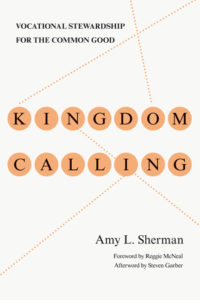 Another great, great book (that was reviewed in greater detail in one of those older links I shared to past BookNotes) that addresses this and, no doubt, influenced Nelson in his own Economics… book is the magisterial Kingdom Callings: Vocational Stewardship for the Common Good (IVP; $22.00.) by Amy Sherman. In that book she makes a powerful case (based on Proverbs 11:10) that even the poor and marginalized will rejoice in the success of a just business; truly righteous, just businesses make things better, even for the poor. So she invites us to think faithfully about stewarding our vocational aspirations in ways that not only please us or help us find our own professional sweet spot but in ways that serve the common good. She offers several different styles or “levels” of involvement showing numerous ways (from the simplest to the most sophisticated) that our work lives impact and serve the world.
Another great, great book (that was reviewed in greater detail in one of those older links I shared to past BookNotes) that addresses this and, no doubt, influenced Nelson in his own Economics… book is the magisterial Kingdom Callings: Vocational Stewardship for the Common Good (IVP; $22.00.) by Amy Sherman. In that book she makes a powerful case (based on Proverbs 11:10) that even the poor and marginalized will rejoice in the success of a just business; truly righteous, just businesses make things better, even for the poor. So she invites us to think faithfully about stewarding our vocational aspirations in ways that not only please us or help us find our own professional sweet spot but in ways that serve the common good. She offers several different styles or “levels” of involvement showing numerous ways (from the simplest to the most sophisticated) that our work lives impact and serve the world.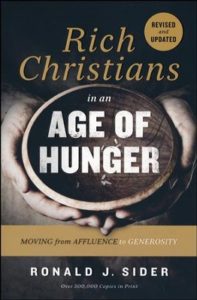
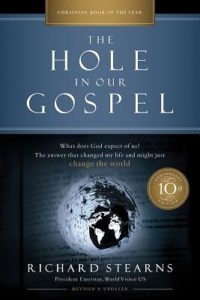 Ronald Sider’s Rich Christians in an Age of Hunger (Thomas Nelson; $15.99) remains a must-read to explore and motivate us to care about the poor; it is surely one of the most important books of the last 50 years. The best-selling The Hole in Our Gospel: What Does God Expect of Us? The Answer That Changed My Life and Might Just Change the World by Richard Stearns came out ten years ago this month, and we have a brand new, 10th Anniversary Edition (Thomas Nelson; $17.99) His story of finding meaning by shifting away from his successful big business career to take up more directly the cries of the poor important and inspiring reading for all of us.
Ronald Sider’s Rich Christians in an Age of Hunger (Thomas Nelson; $15.99) remains a must-read to explore and motivate us to care about the poor; it is surely one of the most important books of the last 50 years. The best-selling The Hole in Our Gospel: What Does God Expect of Us? The Answer That Changed My Life and Might Just Change the World by Richard Stearns came out ten years ago this month, and we have a brand new, 10th Anniversary Edition (Thomas Nelson; $17.99) His story of finding meaning by shifting away from his successful big business career to take up more directly the cries of the poor important and inspiring reading for all of us.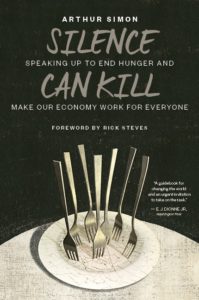 Silence Can Kill: Speaking Up to End Hunger and Make Our Economy Work for Everyone Arthur Simon (Eerdmans) $29.00 Does our apathy or even our silence really indict us? Can silence really kill? It is a strong accusation and Art Simon is careful to explain why. This book is the most important and comprehensive faith-based study of poverty and hunger (in the US and abroad) in ages; Art has written some wonderful books in the past but this may be his magnum opus. In it, he deftly explores the complications and controversies around poverty and public policies that might fruitfully address the crisis of hunger. Although trained as a Lutheran pastor, he has spent most of his adult life organizing citizens to lobby –through the organization he founded, Bread for the World – for legislation that helps the poor, so much of our political legislation has direct consequence (sometimes for good, sometimes for ill) on the impoverished. Maybe you’ve heard the story – Art and other Bread for the World leaders tell it often – of how one year, in one quick vote in the Reagan years, US Congress cut more from life-saving foreign aid than all the charities of all the US churches combined had given that year. I forget the exact figures, but imagine if all the churches, together, raise and generously share 10 million dollars for relief. And imagine that the government cuts $100 million from our aid budget. For those that truly want to save lives and bring relief to starving brothers and sisters in Africa, say, might it have been better to spend more time letting our congressional representatives know that we favor such aid? If we love our neighbors by sincerely donating to charities, why are we silent when so much more is cut?
Silence Can Kill: Speaking Up to End Hunger and Make Our Economy Work for Everyone Arthur Simon (Eerdmans) $29.00 Does our apathy or even our silence really indict us? Can silence really kill? It is a strong accusation and Art Simon is careful to explain why. This book is the most important and comprehensive faith-based study of poverty and hunger (in the US and abroad) in ages; Art has written some wonderful books in the past but this may be his magnum opus. In it, he deftly explores the complications and controversies around poverty and public policies that might fruitfully address the crisis of hunger. Although trained as a Lutheran pastor, he has spent most of his adult life organizing citizens to lobby –through the organization he founded, Bread for the World – for legislation that helps the poor, so much of our political legislation has direct consequence (sometimes for good, sometimes for ill) on the impoverished. Maybe you’ve heard the story – Art and other Bread for the World leaders tell it often – of how one year, in one quick vote in the Reagan years, US Congress cut more from life-saving foreign aid than all the charities of all the US churches combined had given that year. I forget the exact figures, but imagine if all the churches, together, raise and generously share 10 million dollars for relief. And imagine that the government cuts $100 million from our aid budget. For those that truly want to save lives and bring relief to starving brothers and sisters in Africa, say, might it have been better to spend more time letting our congressional representatives know that we favor such aid? If we love our neighbors by sincerely donating to charities, why are we silent when so much more is cut? When I think of heroes like Schindler, I think of Art Simon. It may be that he has saved more people from unjust death than anyone living today. This is not hyperbole — give the guy a Nobel Peace Prize already! Read Silence Can Kill: Speaking Up to End Hunger and you’ll learn much and you will be impressed by Simon’s extraordinary life, about which he writes humbly.
When I think of heroes like Schindler, I think of Art Simon. It may be that he has saved more people from unjust death than anyone living today. This is not hyperbole — give the guy a Nobel Peace Prize already! Read Silence Can Kill: Speaking Up to End Hunger and you’ll learn much and you will be impressed by Simon’s extraordinary life, about which he writes humbly.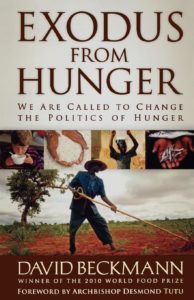 After Art retired from Bread for the World, another extraordinary Lutheran leader, David Beckman, took the helm (after a time working at the World Bank where he lead Bible studies with global leaders.) Beckman wrote a short and really useful little book called Exodus From Hunger: We Are Called to Change the Politics of Hunger (WJK; $18.00) that tells the BFW story in the 21st century; it, too, is very highly recommended.
After Art retired from Bread for the World, another extraordinary Lutheran leader, David Beckman, took the helm (after a time working at the World Bank where he lead Bible studies with global leaders.) Beckman wrote a short and really useful little book called Exodus From Hunger: We Are Called to Change the Politics of Hunger (WJK; $18.00) that tells the BFW story in the 21st century; it, too, is very highly recommended.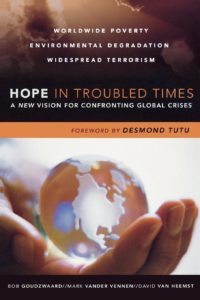
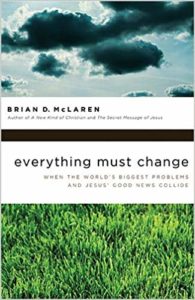 Years ago a Dutch economist and Reformed Christian leader in the old Kuyper party in Holland, Bob Goudzwaard, wrote a book about the idols of our age. (It was later updated and expanded with two other authors as Hope in Troubled Times: A New Vision for Confronting Global Crisis (Baker Academic; $24.00) and, upon reading it, Brian McLaren was inspired to write Everything Must Change: When the World’s Biggest Problems and Jesus’ Good News Collide (Thomas Nelson; $14.99) that explored the ideologies and philosophies and assumptions about society and culture and government and meaning and values that propel our idolatrous cultures. Goudzwaard’s rather dense book and McLaren’s lively interpretation of it are both excellent and I recommend them for those wanting to see the way big issues (from poverty to environmental degradation to militarism) combine and are driven by certain spirits or ideologies.
Years ago a Dutch economist and Reformed Christian leader in the old Kuyper party in Holland, Bob Goudzwaard, wrote a book about the idols of our age. (It was later updated and expanded with two other authors as Hope in Troubled Times: A New Vision for Confronting Global Crisis (Baker Academic; $24.00) and, upon reading it, Brian McLaren was inspired to write Everything Must Change: When the World’s Biggest Problems and Jesus’ Good News Collide (Thomas Nelson; $14.99) that explored the ideologies and philosophies and assumptions about society and culture and government and meaning and values that propel our idolatrous cultures. Goudzwaard’s rather dense book and McLaren’s lively interpretation of it are both excellent and I recommend them for those wanting to see the way big issues (from poverty to environmental degradation to militarism) combine and are driven by certain spirits or ideologies.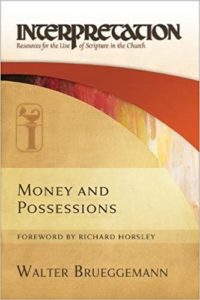 and it is as potent now as it was then. It is called How Much Is Enough?: Hungering for
and it is as potent now as it was then. It is called How Much Is Enough?: Hungering for 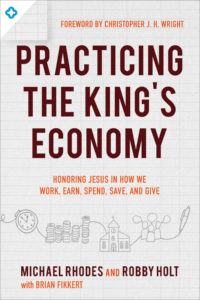 God in an Affluent Culture (Baker; $16.00.) For a comprehensive study of all the key passages about money/Mammon in the Bible see the hefty Money and Possessions (in the Interpretation series) by Walter Brueggemann (WJL; $40.00.) For a more practical and delightfully well-balanced study of how all this might inform our daily financial habits, see Practicing the King’s Economy: Honoring Jesus in How We Work, Earn, Spend, Save, and Give by Michael Rhodes, Robby Holt and Brian Fikkert (Baker Books; $19.99.) It is very, very useful, balanced, thoughtful, wise.
God in an Affluent Culture (Baker; $16.00.) For a comprehensive study of all the key passages about money/Mammon in the Bible see the hefty Money and Possessions (in the Interpretation series) by Walter Brueggemann (WJL; $40.00.) For a more practical and delightfully well-balanced study of how all this might inform our daily financial habits, see Practicing the King’s Economy: Honoring Jesus in How We Work, Earn, Spend, Save, and Give by Michael Rhodes, Robby Holt and Brian Fikkert (Baker Books; $19.99.) It is very, very useful, balanced, thoughtful, wise.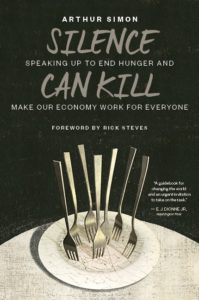
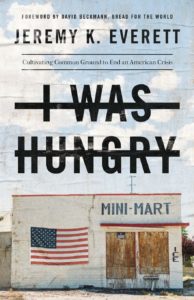 I Was Hungry: Cultivating Common Ground to End An American Crisis Jeremy K. Everett (Brazos Press) $16.99 What a blessing to have a second major book released this season within the religious publishing world – kudos to Brazos Press for taking up this terrific, exciting read by a young-ish activist, founder of the Texas Hunger Initiative. Informed by the framework and inspiration of Bread for the World and other faith-based public policy initiatives, Jeremy Everett (a graduate of Baylor University and Truett Theological Seminary) has spent years as an advocate for the poor. From an inspiring story of being moved to give away his stuff to the homeless after watching the Saint Francis film Brother Son, Sister Moon to the riveting opening pages about running a special needs medical shelter for hundreds of evacuated folk in the immediately aftermath of Hurricane Katrina, we learn that Everett has a big heart and has learned, often the hard way, what it means to not only be proximate with the poor and hurting, but how to organize social services in ways that help stem the tide of human anguish. He’s colorful and dedicated and, I gather, not only winsome but seemingly unstoppable. I suppose one has to be if one is doing serious research to learn the facts and doing on-the-ground, directly care giving and energetic advocacy for the poor. His community organizing skills become evident early on in this page-turner of a book. I Was Hungry – notice the way the words are crossed out in the art design of the book – is a wild, hopeful read!
I Was Hungry: Cultivating Common Ground to End An American Crisis Jeremy K. Everett (Brazos Press) $16.99 What a blessing to have a second major book released this season within the religious publishing world – kudos to Brazos Press for taking up this terrific, exciting read by a young-ish activist, founder of the Texas Hunger Initiative. Informed by the framework and inspiration of Bread for the World and other faith-based public policy initiatives, Jeremy Everett (a graduate of Baylor University and Truett Theological Seminary) has spent years as an advocate for the poor. From an inspiring story of being moved to give away his stuff to the homeless after watching the Saint Francis film Brother Son, Sister Moon to the riveting opening pages about running a special needs medical shelter for hundreds of evacuated folk in the immediately aftermath of Hurricane Katrina, we learn that Everett has a big heart and has learned, often the hard way, what it means to not only be proximate with the poor and hurting, but how to organize social services in ways that help stem the tide of human anguish. He’s colorful and dedicated and, I gather, not only winsome but seemingly unstoppable. I suppose one has to be if one is doing serious research to learn the facts and doing on-the-ground, directly care giving and energetic advocacy for the poor. His community organizing skills become evident early on in this page-turner of a book. I Was Hungry – notice the way the words are crossed out in the art design of the book – is a wild, hopeful read!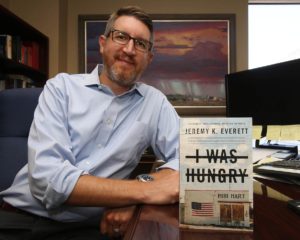 In fact, Bread for the World President David Beckman (who has read and written tons on this topic) writes in a moving foreword, “Once I started the first chapter of this book, I had a hard time putting it down. Jeremy Everett is a great storyteller. And the overarching story of this book is God’s call to Jeremy – to all of us actually – to end hunger.”
In fact, Bread for the World President David Beckman (who has read and written tons on this topic) writes in a moving foreword, “Once I started the first chapter of this book, I had a hard time putting it down. Jeremy Everett is a great storyteller. And the overarching story of this book is God’s call to Jeremy – to all of us actually – to end hunger.”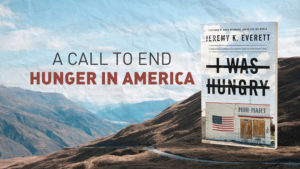 Everett’s Texas Hunger Initiative is an organization that partners with the United States Department of Agriculture, Texas state agencies, the corporate sector, and thousands of churches and community-based organizations. When he says in the subtitle that this book is for “cultivating common ground to end an American crisis” he knows what he’s talking about. I’d say you might read it just to learn about his adept navigation of various social sectors, non-profits and governmental agencies, to advance social entrepreneurship, uniting different kinds of folks to accomplish this good, lasting work.
Everett’s Texas Hunger Initiative is an organization that partners with the United States Department of Agriculture, Texas state agencies, the corporate sector, and thousands of churches and community-based organizations. When he says in the subtitle that this book is for “cultivating common ground to end an American crisis” he knows what he’s talking about. I’d say you might read it just to learn about his adept navigation of various social sectors, non-profits and governmental agencies, to advance social entrepreneurship, uniting different kinds of folks to accomplish this good, lasting work.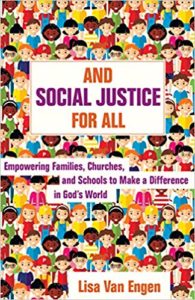 And Social Justice for All: Empowering Families, Churches, and Schools to Make a Difference in God’s World Lisa Van Engen (Kregal) $13.99 This is an excellent resource, more than 300 pages, with information and insight about a dozen different topics — from creation care to human trafficking, from fair-trade wisdom to disabilities rights, from racial justice concerns to family care. There’s stuff about bearing the “fierce light” of being a change-maker and guides on creating a community gathering. There’s even a plan to raise awareness, topic by topic, month by month, which looks intriguing to try. This evangelical educator and mom from Holland, Michigan, has given us a rare combination of gospel-centered faith and down-to-Earth education for social change. She and her family are members of Covenant CRC in St. Catharines, Ontario. Highly recommended.
And Social Justice for All: Empowering Families, Churches, and Schools to Make a Difference in God’s World Lisa Van Engen (Kregal) $13.99 This is an excellent resource, more than 300 pages, with information and insight about a dozen different topics — from creation care to human trafficking, from fair-trade wisdom to disabilities rights, from racial justice concerns to family care. There’s stuff about bearing the “fierce light” of being a change-maker and guides on creating a community gathering. There’s even a plan to raise awareness, topic by topic, month by month, which looks intriguing to try. This evangelical educator and mom from Holland, Michigan, has given us a rare combination of gospel-centered faith and down-to-Earth education for social change. She and her family are members of Covenant CRC in St. Catharines, Ontario. Highly recommended.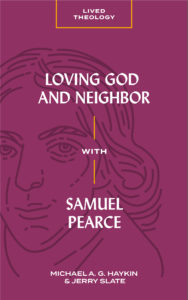 Loving God and Neighbor with Samuel Pierce Michael A.G. Haykin & Jerry Slate (Lexham Press) $12.99 This is the second in a little series called “Lived Theology.” (I will be writing more about the other, an introduction to the public engagement theology of Abraham Kuyper, also in this little series.) Those that know much about evangelical missionary work may know the name of Samuel Pierce, a nearly forgotten saint who embodied a late eighteenth-century Baptist piety and advanced a wholistic vision of the gospel. This handsome little book invites us to explore Pearce’s “holy love” and tells of his years of ministry in England (and his trip to India and preaching trip through Ireland.) Loving God and Neighbor models how older-school evangelical faith can propel one to care deeply about serving one’s neighbors and about caring about God’s world as an expression of a deep appreciation for the saving grace of Christ.
Loving God and Neighbor with Samuel Pierce Michael A.G. Haykin & Jerry Slate (Lexham Press) $12.99 This is the second in a little series called “Lived Theology.” (I will be writing more about the other, an introduction to the public engagement theology of Abraham Kuyper, also in this little series.) Those that know much about evangelical missionary work may know the name of Samuel Pierce, a nearly forgotten saint who embodied a late eighteenth-century Baptist piety and advanced a wholistic vision of the gospel. This handsome little book invites us to explore Pearce’s “holy love” and tells of his years of ministry in England (and his trip to India and preaching trip through Ireland.) Loving God and Neighbor models how older-school evangelical faith can propel one to care deeply about serving one’s neighbors and about caring about God’s world as an expression of a deep appreciation for the saving grace of Christ.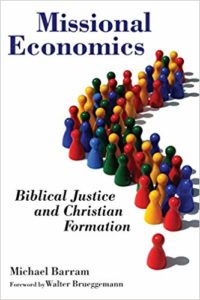 Missional Economics: Biblical Justice and Christian Formation Michael Barram (Eerdmans) $26.00 We have a pretty hefty economics section (besides our section of global development, world hunger, and international affairs.) Some are heady, some less so. Some are tough in their critique of mainstream capitalism, but some, like, say, Redeeming Capitalism by Kenneth Barnes, with a foreword by Miroslav Volf (Eerdmans; $25.99) are thoughtful, with a serious, moral center, but more balanced. We have extraordinary, serious works like Just Capitalism: A Christian Ethic of Economic Globalization by Brent Waters (WJK; $40.00) that seem very much like something neither right nor left, but seeking a deep, alternative vision. That is also why we’ve often recommended Completing Capitalism: Heal Business to Heal the World by Bruno Roche and Jay Jakub (Berrett-Koehler; $19.95) about their surprisingly good work with the Mars Corporation.
Missional Economics: Biblical Justice and Christian Formation Michael Barram (Eerdmans) $26.00 We have a pretty hefty economics section (besides our section of global development, world hunger, and international affairs.) Some are heady, some less so. Some are tough in their critique of mainstream capitalism, but some, like, say, Redeeming Capitalism by Kenneth Barnes, with a foreword by Miroslav Volf (Eerdmans; $25.99) are thoughtful, with a serious, moral center, but more balanced. We have extraordinary, serious works like Just Capitalism: A Christian Ethic of Economic Globalization by Brent Waters (WJK; $40.00) that seem very much like something neither right nor left, but seeking a deep, alternative vision. That is also why we’ve often recommended Completing Capitalism: Heal Business to Heal the World by Bruno Roche and Jay Jakub (Berrett-Koehler; $19.95) about their surprisingly good work with the Mars Corporation.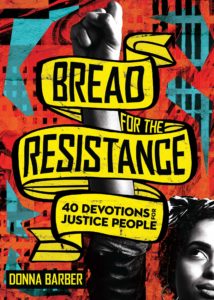 Bread for the Resistance: 40 Devotions for Justice People Donna Barber (IVP/The Voices Publishing) $15.00 We’ve written favorably about books by Leroy Barber and it is a delight to know of Donna, his wife and ministry partner, co-founder of The Voices Project which is trying to “influence culture through training and promoting leaders of color.” She is the director of Champions Academy, an initiative of the Portland Leadership Foundation and is the first African American to serve on her local district’s school board. This is just what you’d think, a feisty, visionary, inspiring set of devotional readings for justice activists. Are you tired or over-worked, struggling, wondering how to keep on keeping on? This will refresh your soul and keep you going. Brand new – we have it on our counter at the shop!
Bread for the Resistance: 40 Devotions for Justice People Donna Barber (IVP/The Voices Publishing) $15.00 We’ve written favorably about books by Leroy Barber and it is a delight to know of Donna, his wife and ministry partner, co-founder of The Voices Project which is trying to “influence culture through training and promoting leaders of color.” She is the director of Champions Academy, an initiative of the Portland Leadership Foundation and is the first African American to serve on her local district’s school board. This is just what you’d think, a feisty, visionary, inspiring set of devotional readings for justice activists. Are you tired or over-worked, struggling, wondering how to keep on keeping on? This will refresh your soul and keep you going. Brand new – we have it on our counter at the shop!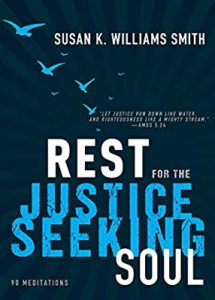 Rest for the Justice Seeking Soul: 90 Meditations Susan K. Williams Smith (Whitaker House) $14.99 FORTHCOMING – PRE-ORDER: due to be released November 12, 2019 Wow, this is another small collection of daily meditations by an experienced leader who is a woman of color, the communications director and secretary to the Board of Directors for the Samuel D. Proctor Ministers Conferences. Those who know the African American church know that the Samuel Proctor name is deeply esteemed and Ms. Smith’s connection there is indication of her stature. Perhaps more importantly, she’s known on the streets as a voice for faith-based social change; she has been involved in organizing in her home-town of Columbus, Ohio, and on the national level. She is involved with numerous social justice organizations, including Dr. William Barber’s Poor People’s Campaign. These short readings were designed for those who are feeling beleaguered and battered down in their activism during these hard days. Kudos to Whitaker House (not known for these sorts of social action books) for taking up the writings of this important sister in the struggle. PRE-ORDER IT NOW.
Rest for the Justice Seeking Soul: 90 Meditations Susan K. Williams Smith (Whitaker House) $14.99 FORTHCOMING – PRE-ORDER: due to be released November 12, 2019 Wow, this is another small collection of daily meditations by an experienced leader who is a woman of color, the communications director and secretary to the Board of Directors for the Samuel D. Proctor Ministers Conferences. Those who know the African American church know that the Samuel Proctor name is deeply esteemed and Ms. Smith’s connection there is indication of her stature. Perhaps more importantly, she’s known on the streets as a voice for faith-based social change; she has been involved in organizing in her home-town of Columbus, Ohio, and on the national level. She is involved with numerous social justice organizations, including Dr. William Barber’s Poor People’s Campaign. These short readings were designed for those who are feeling beleaguered and battered down in their activism during these hard days. Kudos to Whitaker House (not known for these sorts of social action books) for taking up the writings of this important sister in the struggle. PRE-ORDER IT NOW.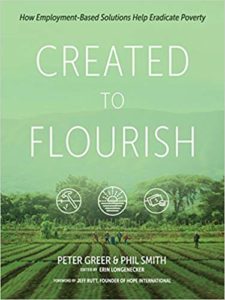 Created to Flourish: How Employment-Based Solutions Help Eradicate Poverty Peter Greer & Phil Smith (Hope International) $19.99 What a handsome, joyous, wonderful book this it. It is not new, but wanted to mention it here because we are so glad to stock it, and you may not know of it. I hope you do know about the remarkable ministry directed by Lancaster-based Peter Greer called
Created to Flourish: How Employment-Based Solutions Help Eradicate Poverty Peter Greer & Phil Smith (Hope International) $19.99 What a handsome, joyous, wonderful book this it. It is not new, but wanted to mention it here because we are so glad to stock it, and you may not know of it. I hope you do know about the remarkable ministry directed by Lancaster-based Peter Greer called 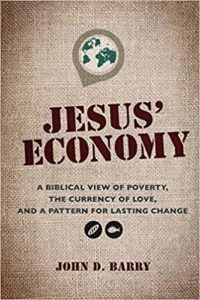 Jesus’ Economy: A Biblical View of Poverty, The Currency of Love and a Pattern for Lasting Change John D. Barry (Whitaker House) $15.99 I was amazed that folks I respected from a variety of theological views and who tend to tilt left or right, so to speak (favoring more governmental adjustments to reform the economy or those who trust the free market as the best way to bring people out of poverty) all agreeing that this author is a gem, that this book is a great little guide. John Barry is one well-respected, behind the scenes leader.
Jesus’ Economy: A Biblical View of Poverty, The Currency of Love and a Pattern for Lasting Change John D. Barry (Whitaker House) $15.99 I was amazed that folks I respected from a variety of theological views and who tend to tilt left or right, so to speak (favoring more governmental adjustments to reform the economy or those who trust the free market as the best way to bring people out of poverty) all agreeing that this author is a gem, that this book is a great little guide. John Barry is one well-respected, behind the scenes leader.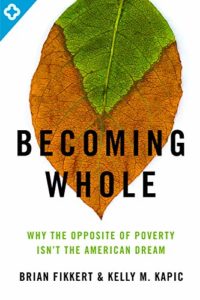 Becoming Whole: Why the Opposite of Poverty Isn’t the American Dream Brian Fikkert & Kelly Kapic (Moody Press) $15.99 Wow, what a book! I have alluded to this before, mentioned it at book groups, and shown it here in the shop. It deserves an even more detailed review that I am able to do at this time, but, trust me – it deserves your attention. An important project of The Chalmers Center (at Covenant Theological Seminary in St. Louis) it is, in a way, a prequel to the bestselling and much discussed When Helping Hurts. Many have read that important volume (alongside the equally valuable Toxic Charity and Charity Detox by Robert Lupton) and somehow concluded that all foreign aid (or even local charitable mission) is suspect. This has become so common that Calvin College Press published a helpful little study called When Helping Heals by Tracy Kuperus & Roland Hoksbergen (Calvin College Press; $10.99.)
Becoming Whole: Why the Opposite of Poverty Isn’t the American Dream Brian Fikkert & Kelly Kapic (Moody Press) $15.99 Wow, what a book! I have alluded to this before, mentioned it at book groups, and shown it here in the shop. It deserves an even more detailed review that I am able to do at this time, but, trust me – it deserves your attention. An important project of The Chalmers Center (at Covenant Theological Seminary in St. Louis) it is, in a way, a prequel to the bestselling and much discussed When Helping Hurts. Many have read that important volume (alongside the equally valuable Toxic Charity and Charity Detox by Robert Lupton) and somehow concluded that all foreign aid (or even local charitable mission) is suspect. This has become so common that Calvin College Press published a helpful little study called When Helping Heals by Tracy Kuperus & Roland Hoksbergen (Calvin College Press; $10.99.)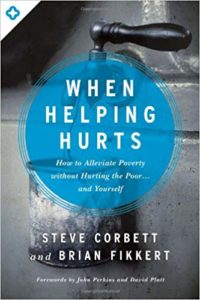 Of course few would argue with the central thesis of When Helping Hurts. Too often big bureaucracies and government programs, or smaller, well-intentioned local charities, are patronizing, even toxic, and build dependency. Nobody wants poor folks to be dependent on somebody else’s charity. And, really, nobody wants to serve our needy neighbors in ways that are hurtful. But yet, we do.
Of course few would argue with the central thesis of When Helping Hurts. Too often big bureaucracies and government programs, or smaller, well-intentioned local charities, are patronizing, even toxic, and build dependency. Nobody wants poor folks to be dependent on somebody else’s charity. And, really, nobody wants to serve our needy neighbors in ways that are hurtful. But yet, we do.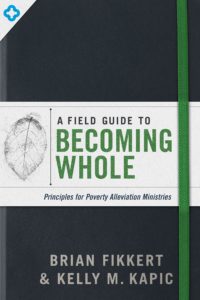 A Field Guide to Becoming Whole: Principles for Poverty Alleviation Ministries Brian Fikkert & Kelly M. Kapic (Moody Press) $14.99 Okay, as I suggested above: a few years ago this team from the Chalmer’s Center put out what became a best seller, When Helping Hurts. They did a side-project called When Helping Hurts in Church Benevolence and a video curriculum on short-term mission trips. It’s a big deal, and good stuff.
A Field Guide to Becoming Whole: Principles for Poverty Alleviation Ministries Brian Fikkert & Kelly M. Kapic (Moody Press) $14.99 Okay, as I suggested above: a few years ago this team from the Chalmer’s Center put out what became a best seller, When Helping Hurts. They did a side-project called When Helping Hurts in Church Benevolence and a video curriculum on short-term mission trips. It’s a big deal, and good stuff. difference for reform of this fallen world (usually in small ways) by allowing the Christian mind to shape our thinking and practices about our work-world. That book is called Serious Dreams: Bold Ideas for the Rest of Your Lives (Square Halo Book; $13.99) and even though it is designed for young adults just out of college or trade school, it captures much of what I think about when Labor Day rolls around. There’s even pretty good reflection questions too, making it a fine book for a book group, especially, but not only, for young adults.
difference for reform of this fallen world (usually in small ways) by allowing the Christian mind to shape our thinking and practices about our work-world. That book is called Serious Dreams: Bold Ideas for the Rest of Your Lives (Square Halo Book; $13.99) and even though it is designed for young adults just out of college or trade school, it captures much of what I think about when Labor Day rolls around. There’s even pretty good reflection questions too, making it a fine book for a book group, especially, but not only, for young adults.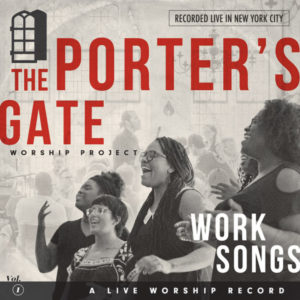 Do you know the great album of worship music that was commissioned to create songs somehow about or alluding to our work and callings in the world? We are proud to know some of the song-writers and recording artists behind this marvelous Porter’s Gate worship project called Work Songs. Here’s a little background about
Do you know the great album of worship music that was commissioned to create songs somehow about or alluding to our work and callings in the world? We are proud to know some of the song-writers and recording artists behind this marvelous Porter’s Gate worship project called Work Songs. Here’s a little background about 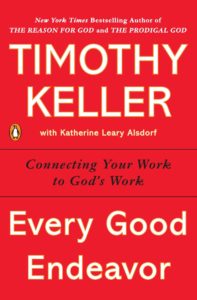 written (or co-written) by real-world workers, not academics or pastors, but business executives or public school special ed teachers or advertisers or scientists or shop floor stewards. Often considered the very best, Every Good Endeavor Connecting Your Work to God’s Work (Penguin; $17.00) is by the always-thoughtful Timothy Keller (whose Manhattan ministry has long been known by his seriousness about orthodox faith related in gracious ways to the contemporary culture, especially to matters of calling and vocation) but in this he got a major assist from co-author Katherine Leary Aldsorf, who has spent years working in the business world, living out her faith in a high-powered corporate culture. Katherine was the first director of Redeemer’s extraordinary
written (or co-written) by real-world workers, not academics or pastors, but business executives or public school special ed teachers or advertisers or scientists or shop floor stewards. Often considered the very best, Every Good Endeavor Connecting Your Work to God’s Work (Penguin; $17.00) is by the always-thoughtful Timothy Keller (whose Manhattan ministry has long been known by his seriousness about orthodox faith related in gracious ways to the contemporary culture, especially to matters of calling and vocation) but in this he got a major assist from co-author Katherine Leary Aldsorf, who has spent years working in the business world, living out her faith in a high-powered corporate culture. Katherine was the first director of Redeemer’s extraordinary 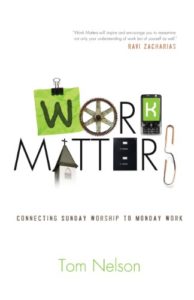 But I often say that one of the best starter books was, in fact, written by a pastor, my friend Tom Nelson (now of
But I often say that one of the best starter books was, in fact, written by a pastor, my friend Tom Nelson (now of  Another that I’ve raved about came out a year ago, also by a pastor, who creatively did a long series of sermons about what we can learn about God from various jobs. I’ve shared the stage with the thoughtful John Van Sloten and think he is exceptionally gifted in offering a profound theological framework for this project of nurturing a spirituality of the workplace, Every Job a Parable: What Walmart Greeters, Nurses, and Astronauts Tell Us about God (NavPress; $14.99.) To his credit, John interviewed tons of folks about their jobs, thought well about all manner of careers and callings, including some unique ones, and preached on the redemptive aspects of car repair and what forensic psychologists or a residential landlord can teach us about the Kingdom. It’s really, really good.
Another that I’ve raved about came out a year ago, also by a pastor, who creatively did a long series of sermons about what we can learn about God from various jobs. I’ve shared the stage with the thoughtful John Van Sloten and think he is exceptionally gifted in offering a profound theological framework for this project of nurturing a spirituality of the workplace, Every Job a Parable: What Walmart Greeters, Nurses, and Astronauts Tell Us about God (NavPress; $14.99.) To his credit, John interviewed tons of folks about their jobs, thought well about all manner of careers and callings, including some unique ones, and preached on the redemptive aspects of car repair and what forensic psychologists or a residential landlord can teach us about the Kingdom. It’s really, really good.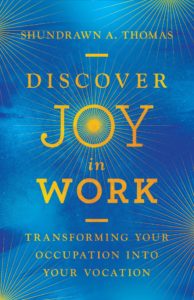 Discovering Joy in Work: Transforming Your Occupation into Your Vocation Shundrawn A. Thomas (IVP) $22.00 I am eager to read this soon (it just came a day or so ago) as I need it, believe me. My own job is harder and more painful than I would wish and our situated context within the current less-than-bookish culture, the broken supply chains, the shuttering of faith-based bookstores, the larger global economy, and more, make my days regularly feel “cursed.” My own sins and foibles loom large, too, so I need this. Do you? Coming from IVP as it does, I am sure it’s going to be very well done. And a quick skim leads me to think this is some fresh and practical stuff.
Discovering Joy in Work: Transforming Your Occupation into Your Vocation Shundrawn A. Thomas (IVP) $22.00 I am eager to read this soon (it just came a day or so ago) as I need it, believe me. My own job is harder and more painful than I would wish and our situated context within the current less-than-bookish culture, the broken supply chains, the shuttering of faith-based bookstores, the larger global economy, and more, make my days regularly feel “cursed.” My own sins and foibles loom large, too, so I need this. Do you? Coming from IVP as it does, I am sure it’s going to be very well done. And a quick skim leads me to think this is some fresh and practical stuff. active in his local Chicagoland church. He is one of these young men who has already worked in very high-level corporate environments, so Discover Joy in Work might be especially appealing to those who work in the financial sector or in the corporate world. It is interesting, to me, too, that he is an African-American leader; many of the best books so far on the faith/work conversation have been by white guys. It’s nice to have this significant contribution by a person of color.
active in his local Chicagoland church. He is one of these young men who has already worked in very high-level corporate environments, so Discover Joy in Work might be especially appealing to those who work in the financial sector or in the corporate world. It is interesting, to me, too, that he is an African-American leader; many of the best books so far on the faith/work conversation have been by white guys. It’s nice to have this significant contribution by a person of color.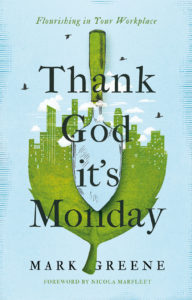 Thank God It’s Monday: Flourishing in Your Workplace Mark Greene (Muddy Pearl) $15.99 This book came out of Scripture Union in the UK a decade or more ago and was very widely respected. It was just re-issued in an updated edition by this cool Scottish publisher. Greene (who once was a Mad Man in New York, working in advertising for the famed Ogilvey agency) now is the Director of the brilliant London Institute for Contemporary Christianity. This book is packed full of stories, inspiration, transformative opportunities, great ideas about how to be a whole-life follower of Jesus in the ever-changing workplaces of the global economy. As one British Anglican put it, it is “intelligent, invigorating, inspirational, and, ultimately, indispensable.”
Thank God It’s Monday: Flourishing in Your Workplace Mark Greene (Muddy Pearl) $15.99 This book came out of Scripture Union in the UK a decade or more ago and was very widely respected. It was just re-issued in an updated edition by this cool Scottish publisher. Greene (who once was a Mad Man in New York, working in advertising for the famed Ogilvey agency) now is the Director of the brilliant London Institute for Contemporary Christianity. This book is packed full of stories, inspiration, transformative opportunities, great ideas about how to be a whole-life follower of Jesus in the ever-changing workplaces of the global economy. As one British Anglican put it, it is “intelligent, invigorating, inspirational, and, ultimately, indispensable.”
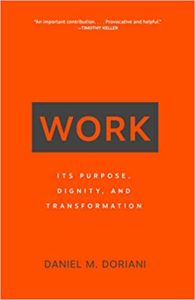 Work: It’s Purpose, Dignity, and Transformation Daneil M. Doriani (Presbyterian & Reformed) $15.99 You may know enough about us to know that our earliest visions for relating faith to work, to seeing our jobs as connected to the great “cultural mandate” of Genesis 1, of developing a Christian perspective on work and labor, came from our years ago working for the campus ministry called the Coalition for Christian Outreach (CCO) on the committee coming up with the ideas for the very first collegiate Jubilee Conference in Pittsburgh. (
Work: It’s Purpose, Dignity, and Transformation Daneil M. Doriani (Presbyterian & Reformed) $15.99 You may know enough about us to know that our earliest visions for relating faith to work, to seeing our jobs as connected to the great “cultural mandate” of Genesis 1, of developing a Christian perspective on work and labor, came from our years ago working for the campus ministry called the Coalition for Christian Outreach (CCO) on the committee coming up with the ideas for the very first collegiate Jubilee Conference in Pittsburgh. ( I mention this because the author of this fine, no-nonsense, theologically solid (and yet very interesting) book was also once on staff with the CCO. Doriani has had other jobs too — the book tells us he’s been a security guard, construction laborer, freight handler, tennis coach and tour guide. He knows a bit about the hardships of work, the ugly stuff. He has pastored churches and has served as a faculty member of colleges, most notably, at Covenant Theological Seminary in St. Louis, where he is now the vice president of strategic academic projects (and professor of theology.) My good friend Steve Garber, author of the must-read Visions of Vocation, has done some teaching at Covenant about how to prepare future pastors to equip their future congregants for work-place calls and vocations in the work-world. Not many seminaries have stepped up to make this a clear part of their ministerial formation, and Garber and Doriani have been part of that. Thanks be to God!
I mention this because the author of this fine, no-nonsense, theologically solid (and yet very interesting) book was also once on staff with the CCO. Doriani has had other jobs too — the book tells us he’s been a security guard, construction laborer, freight handler, tennis coach and tour guide. He knows a bit about the hardships of work, the ugly stuff. He has pastored churches and has served as a faculty member of colleges, most notably, at Covenant Theological Seminary in St. Louis, where he is now the vice president of strategic academic projects (and professor of theology.) My good friend Steve Garber, author of the must-read Visions of Vocation, has done some teaching at Covenant about how to prepare future pastors to equip their future congregants for work-place calls and vocations in the work-world. Not many seminaries have stepped up to make this a clear part of their ministerial formation, and Garber and Doriani have been part of that. Thanks be to God!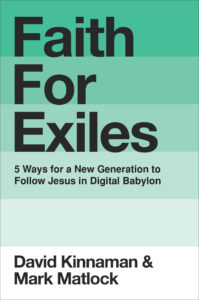 Faith for Exiles: 5 Ways for a New Generation to Follow Jesus in Digital Babylon David Kinnaman & Mark Matlock (Baker Books) $21.99 I hope you recall that we invited you to pre-order this a month ago, and it is now out! Thanks to those who pre-ordered it; we enjoyed sending a bunch out. (Say a prayer this Labor Day for the package handlers and truck drivers and mail carriers and others who make our work possible!)
Faith for Exiles: 5 Ways for a New Generation to Follow Jesus in Digital Babylon David Kinnaman & Mark Matlock (Baker Books) $21.99 I hope you recall that we invited you to pre-order this a month ago, and it is now out! Thanks to those who pre-ordered it; we enjoyed sending a bunch out. (Say a prayer this Labor Day for the package handlers and truck drivers and mail carriers and others who make our work possible!)
 Here is why I mention this now in the special Labor day issue of BookNotes: one of the five key practices that churches that maintain their relationship with their young adults and attract that age group is “To ground and motivate an ambitious generation, train for vocational discipleship.”
Here is why I mention this now in the special Labor day issue of BookNotes: one of the five key practices that churches that maintain their relationship with their young adults and attract that age group is “To ground and motivate an ambitious generation, train for vocational discipleship.”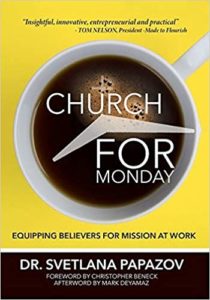 PRE-ORDER forthcoming due September 2019 Church for Monday: Equipping Believers for Mission at Work Dr. Svetlana Papazov (Brookstone Publishing Group) $14.99 This is another book that is mostly aimed at church leaders to help them develop a passion and the skill sets necessary in order to equip congregants to see their workplace as a missional context. Svetlana is a dynamic pastor and connected with our friends at Made to Flourish, and she and her church are highly regarded. She is energetic and entrepreneurial. She is Spirit-led, evangelical, and innovative about the church’s impact in the public sphere; her small business startup background has made her particularly sensitive to and insightful about issues of marketplace ministry.
PRE-ORDER forthcoming due September 2019 Church for Monday: Equipping Believers for Mission at Work Dr. Svetlana Papazov (Brookstone Publishing Group) $14.99 This is another book that is mostly aimed at church leaders to help them develop a passion and the skill sets necessary in order to equip congregants to see their workplace as a missional context. Svetlana is a dynamic pastor and connected with our friends at Made to Flourish, and she and her church are highly regarded. She is energetic and entrepreneurial. She is Spirit-led, evangelical, and innovative about the church’s impact in the public sphere; her small business startup background has made her particularly sensitive to and insightful about issues of marketplace ministry. Papazov (along with her husband, and small, multi-ethnic team) planted their Assembly of God congregation several years ago. Real Life Church, as it is known, is “an entrepreneurial church with a heart for de-churched people and for bridging the sacred and secular divide. The entrepreneurial church is not a “how” church, but a “why” church. It’s not about the methodology, but about the Christology.”
Papazov (along with her husband, and small, multi-ethnic team) planted their Assembly of God congregation several years ago. Real Life Church, as it is known, is “an entrepreneurial church with a heart for de-churched people and for bridging the sacred and secular divide. The entrepreneurial church is not a “how” church, but a “why” church. It’s not about the methodology, but about the Christology.” Apparent Faith: What Fatherhood Taught Me About the Father’s Heart Karl Forehand (Quoir) $19.99 Karl is a new friend, a friend of some other friends, and a former pastor who now attends Brian Zahnd’s church in Missouri. Forehand’s story is gently told and it is, I think, a fairly common one, especially these days. He has shifted from a more legalistic and strict conservative faith to a more open and generous one. Memoirs of how folks have shifted in their faith journey are not uncommon and are often moving – think of Rachel Held Evans or Pete Enns, just for instance – and in a way, this is one of those sorts of stories of a traditionalist evangelical has refreshed his understanding of God.
Apparent Faith: What Fatherhood Taught Me About the Father’s Heart Karl Forehand (Quoir) $19.99 Karl is a new friend, a friend of some other friends, and a former pastor who now attends Brian Zahnd’s church in Missouri. Forehand’s story is gently told and it is, I think, a fairly common one, especially these days. He has shifted from a more legalistic and strict conservative faith to a more open and generous one. Memoirs of how folks have shifted in their faith journey are not uncommon and are often moving – think of Rachel Held Evans or Pete Enns, just for instance – and in a way, this is one of those sorts of stories of a traditionalist evangelical has refreshed his understanding of God.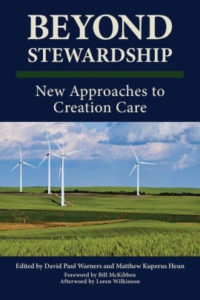 Beyond Stewardship: New Approaches to Creation Care edited by David Paul Warners & Matthew Kuperus Heun (Calvin College Press) $17.99 We stock everything of this small college press (including their marvelous, brief paperbacks in their “Calvin Shorts” series.) This is a major new work and might have been well-served by being shopped around to be released on a major, prestigious publisher because Beyond Stewardship is brilliant in its overall vision and wonderful in how it has offered so many interesting, astute, and vitally important contributions to the conversations about faith and what some call creation-care. This fascinating and generative book deserves a more careful review and I hope to do that, soon.
Beyond Stewardship: New Approaches to Creation Care edited by David Paul Warners & Matthew Kuperus Heun (Calvin College Press) $17.99 We stock everything of this small college press (including their marvelous, brief paperbacks in their “Calvin Shorts” series.) This is a major new work and might have been well-served by being shopped around to be released on a major, prestigious publisher because Beyond Stewardship is brilliant in its overall vision and wonderful in how it has offered so many interesting, astute, and vitally important contributions to the conversations about faith and what some call creation-care. This fascinating and generative book deserves a more careful review and I hope to do that, soon.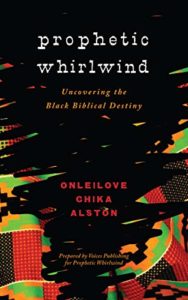 Prophetic Whirlwind: Uncovering the Black Biblical Destiny Onleilove Chika Alston (Voices Publishing) $24.99 Again, every now and then we are just delighted to find a vibrant writer and spokesperson who is doing extraordinary work but whose book is not widely known outside of their own niche circles.
Prophetic Whirlwind: Uncovering the Black Biblical Destiny Onleilove Chika Alston (Voices Publishing) $24.99 Again, every now and then we are just delighted to find a vibrant writer and spokesperson who is doing extraordinary work but whose book is not widely known outside of their own niche circles.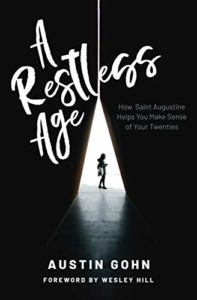 A Restless Age: How Saint Augustine Helps You Make Sense of Your Twenties Austin Gohn (with a foreword by Wesley Hill) (GCD Books) $12.99 As many are waiting on the forthcoming work by Jamie Smith (On the Road with Saint Augustine) might I suggest this as an excellent companion volume. In fact, whether you are attracted to Smith’s heady study or not, A Restless Age is the best introduction to Augustine’s Confessions I have yet seen. Everybody knows that Confessions (for any number of reasons) is an important classic in the Western canon and a must-read for anyone wanting to be fluent in the standards of ancient Christian books.
A Restless Age: How Saint Augustine Helps You Make Sense of Your Twenties Austin Gohn (with a foreword by Wesley Hill) (GCD Books) $12.99 As many are waiting on the forthcoming work by Jamie Smith (On the Road with Saint Augustine) might I suggest this as an excellent companion volume. In fact, whether you are attracted to Smith’s heady study or not, A Restless Age is the best introduction to Augustine’s Confessions I have yet seen. Everybody knows that Confessions (for any number of reasons) is an important classic in the Western canon and a must-read for anyone wanting to be fluent in the standards of ancient Christian books.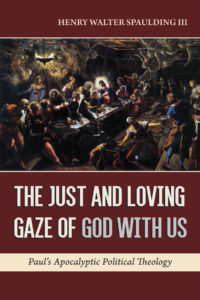 The Just and Loving Gaze of God With Us: Paul’s Apocalyptic Political Theology Henry Walter Spaulding III (Wipf & Stock) $36.00 Hank has become a good friend and a great customer of ours, even stopping by the store (on his way to and fro from, oh, say, stuff like a Princeton Barth conference where he was presenting.) Young, casual, widely read, a passionate teacher and principled supporter of indie booksellers like us – what’s not to like? Well, I have to admit, I’m inclined to promote books by authors who support us (it’s a bit annoying when folks expect us to sell their book, even if they’ve never darkened our door or sent us as much as a an email and push people to Amazon regularly on their own social media. Really?) But Hank showed up here seeking books perhaps not even knowing we had his book in our cluttered and jam-packed New Testament section. With blurbs on the back from the likes of William Cavanaugh and citing many other “ethical” readings of Pauline politics I realized quickly that The Just and Loving Gaze is a serious and important contribution to New Testament studies and contemporary discipleship. Now that we’ve met him, we’re even more thrilled to tell you about it and to commend it to you.
The Just and Loving Gaze of God With Us: Paul’s Apocalyptic Political Theology Henry Walter Spaulding III (Wipf & Stock) $36.00 Hank has become a good friend and a great customer of ours, even stopping by the store (on his way to and fro from, oh, say, stuff like a Princeton Barth conference where he was presenting.) Young, casual, widely read, a passionate teacher and principled supporter of indie booksellers like us – what’s not to like? Well, I have to admit, I’m inclined to promote books by authors who support us (it’s a bit annoying when folks expect us to sell their book, even if they’ve never darkened our door or sent us as much as a an email and push people to Amazon regularly on their own social media. Really?) But Hank showed up here seeking books perhaps not even knowing we had his book in our cluttered and jam-packed New Testament section. With blurbs on the back from the likes of William Cavanaugh and citing many other “ethical” readings of Pauline politics I realized quickly that The Just and Loving Gaze is a serious and important contribution to New Testament studies and contemporary discipleship. Now that we’ve met him, we’re even more thrilled to tell you about it and to commend it to you.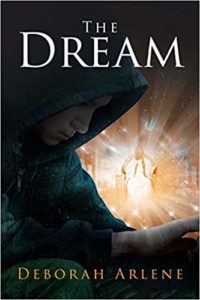 The Dream: A Novel Deborah Arlene (Christian Faith Publishing) $16.95 If you visit our Hearts & Minds Facebook group you might find a handful of folks offering suggestions and reviews. I invited Deborah to tell us there just a bit about her new novel in part because – whether it’s high quality, literary literature or just an inspiring, earnest story nicely told – some books deserve to be known. And there’s a bit of backstory about The Dream, and it is so frustrating. Let me explain. First, you should know that it is a story that has an anti-abortion message, or, I should say, a truly pro-life one, as the tender story embraces the controversial and painful topic of abortion by imagining the tale of a woman who is helped by good folks at a Christian crisis pregnancy center. As one who has been involved with a couple such centers, I am happy to know there is a novel that captures the life-changing stories that the care-givers in those places hear and help facilitate day in and day out. Carrying a pregnancy to term when the situation is complicated is emotionally hard, and the support these sorts of places give is often extraordinary. The hardships of an unexpected (and, at first, perhaps unwanted) pregnancy can be made less so with a little bit of lovin’ care. This shouldn’t be controversial, and all sides of the policy and legal debates should affirm that helping women with her choice to carry a crisis pregnancy is a good thing.
The Dream: A Novel Deborah Arlene (Christian Faith Publishing) $16.95 If you visit our Hearts & Minds Facebook group you might find a handful of folks offering suggestions and reviews. I invited Deborah to tell us there just a bit about her new novel in part because – whether it’s high quality, literary literature or just an inspiring, earnest story nicely told – some books deserve to be known. And there’s a bit of backstory about The Dream, and it is so frustrating. Let me explain. First, you should know that it is a story that has an anti-abortion message, or, I should say, a truly pro-life one, as the tender story embraces the controversial and painful topic of abortion by imagining the tale of a woman who is helped by good folks at a Christian crisis pregnancy center. As one who has been involved with a couple such centers, I am happy to know there is a novel that captures the life-changing stories that the care-givers in those places hear and help facilitate day in and day out. Carrying a pregnancy to term when the situation is complicated is emotionally hard, and the support these sorts of places give is often extraordinary. The hardships of an unexpected (and, at first, perhaps unwanted) pregnancy can be made less so with a little bit of lovin’ care. This shouldn’t be controversial, and all sides of the policy and legal debates should affirm that helping women with her choice to carry a crisis pregnancy is a good thing.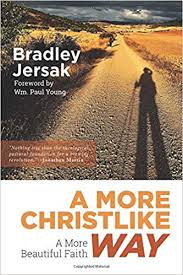 A More Christlike Way: A More Beautiful Faith Bradley Jersak (CWR Press) $19.99 I’m really excited to tell you about this small press release even though I don’t even know what CWR Press is; its related to CWR Magazine, which is some Jesusy Canuck ‘zine that I also don’t know much about. But I love this author! We’ve stocked other books by this ambitious thinker and Dean of the Masters of Ministry program at St. Stephen’s University in New Brunswick, Canada. We stock his serious academic tomes like Her Gates Will Never Be Shut about “Hell, Hope, and the New Jerusalem” to the lovely, thoughtfully done children’s picture book with sophisticated text, Jesus Showed Us! This new one, A More Christlike Way is a sequel to his A More Christlike God: A More Beautiful Gospel. In each case, Jersak is doing what other thinkers are also helping us with (I think of Brian Zahnd and his Sinners in the Hands of a Loving God) in raising up a very high Christology and insisting that however we know God, think about the Old Testament, o define the gospel itself, it has to be done through the lens of Jesus the Christ, the second person of the Trinity, God-in-the-flesh. It is hard to argue with that, it seems to me, and his pressing Christ-like and Christ-commanded compassion to its logical implications (a non-violent understanding of the atonement, a Christ-like mercy in thinking about eternity, a Kingdom-centered gospel where Christ is lifted up and actually followed, and the like) is urgent, vital, important. Theologians will debate all of this, I’m sure, but Jersak here sets forth, as Zahnd puts it, “a vision for following Jesus that is in keeping with the kind of faith that first turned the world upside down two thousand years ago.”
A More Christlike Way: A More Beautiful Faith Bradley Jersak (CWR Press) $19.99 I’m really excited to tell you about this small press release even though I don’t even know what CWR Press is; its related to CWR Magazine, which is some Jesusy Canuck ‘zine that I also don’t know much about. But I love this author! We’ve stocked other books by this ambitious thinker and Dean of the Masters of Ministry program at St. Stephen’s University in New Brunswick, Canada. We stock his serious academic tomes like Her Gates Will Never Be Shut about “Hell, Hope, and the New Jerusalem” to the lovely, thoughtfully done children’s picture book with sophisticated text, Jesus Showed Us! This new one, A More Christlike Way is a sequel to his A More Christlike God: A More Beautiful Gospel. In each case, Jersak is doing what other thinkers are also helping us with (I think of Brian Zahnd and his Sinners in the Hands of a Loving God) in raising up a very high Christology and insisting that however we know God, think about the Old Testament, o define the gospel itself, it has to be done through the lens of Jesus the Christ, the second person of the Trinity, God-in-the-flesh. It is hard to argue with that, it seems to me, and his pressing Christ-like and Christ-commanded compassion to its logical implications (a non-violent understanding of the atonement, a Christ-like mercy in thinking about eternity, a Kingdom-centered gospel where Christ is lifted up and actually followed, and the like) is urgent, vital, important. Theologians will debate all of this, I’m sure, but Jersak here sets forth, as Zahnd puts it, “a vision for following Jesus that is in keeping with the kind of faith that first turned the world upside down two thousand years ago.”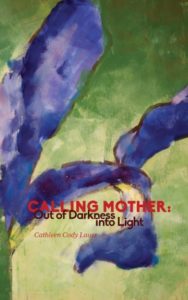 Calling Mother: Out of Darkness into Light Cathleen Cody Lauer (self published) $19.95 This wondrous book is a small, quiet gem, wonderfully crafted and creatively written. It is nearly a small art book – more than a poet’s chapbook – but glorious in that same, artful way; the paper quality is good and there are touches of color throughout. To have it in your hand is to realize you are experiencing something very special, owning a book that but for serendipity you may not otherwise even know about, and you will be glad. Perhaps offering an outright “thanks be to God” or a Nunc Dimittis. How did we even learn of this?
Calling Mother: Out of Darkness into Light Cathleen Cody Lauer (self published) $19.95 This wondrous book is a small, quiet gem, wonderfully crafted and creatively written. It is nearly a small art book – more than a poet’s chapbook – but glorious in that same, artful way; the paper quality is good and there are touches of color throughout. To have it in your hand is to realize you are experiencing something very special, owning a book that but for serendipity you may not otherwise even know about, and you will be glad. Perhaps offering an outright “thanks be to God” or a Nunc Dimittis. How did we even learn of this?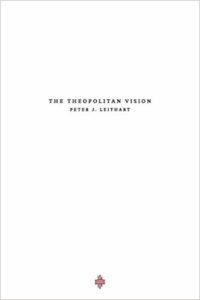 The Theopolitan Vision Peter J. Leithart (Theopolis Books/Athanasius Press) $12.95 Do you know Peter Leithart and his fascinating, Birmingham-based “Theopolis Institute”? He invites men and women into an intense, residential Fellows program relating, as they put it, “Bible, liturgy and culture.” Doc Leithart is colorful, undeniably brilliant, liturgically-minded, Reformed. You many know of his serious Bible commentaries, his little studies of Jane Austen, or his little book Shining Glory on the Terrence Malick film The Tree of Life which he relates to the book of Job. He’s done Between Babel and the Beast (on “America and Empires in Biblical Perspective”) and a curious study called Defending Constantine: The Twilight of Empire and the Dawn of Christendom that I suspect I don’t adequately understand. Leithart has written on Mercersburg theology and did a fabulous book called Solomon Among the Postmoderns. I liked this Traces of the Trinity: Signs of God in Creation and Human Experience. He did a big, scholarly book on the history and experience of gratitude published in hardback by Baylor University Press. And that’s not even all of it. Despite this prodigious, thoughtful output, he’s started this recent educational/formational ministry and this new little book is a bit of a manifesto.
The Theopolitan Vision Peter J. Leithart (Theopolis Books/Athanasius Press) $12.95 Do you know Peter Leithart and his fascinating, Birmingham-based “Theopolis Institute”? He invites men and women into an intense, residential Fellows program relating, as they put it, “Bible, liturgy and culture.” Doc Leithart is colorful, undeniably brilliant, liturgically-minded, Reformed. You many know of his serious Bible commentaries, his little studies of Jane Austen, or his little book Shining Glory on the Terrence Malick film The Tree of Life which he relates to the book of Job. He’s done Between Babel and the Beast (on “America and Empires in Biblical Perspective”) and a curious study called Defending Constantine: The Twilight of Empire and the Dawn of Christendom that I suspect I don’t adequately understand. Leithart has written on Mercersburg theology and did a fabulous book called Solomon Among the Postmoderns. I liked this Traces of the Trinity: Signs of God in Creation and Human Experience. He did a big, scholarly book on the history and experience of gratitude published in hardback by Baylor University Press. And that’s not even all of it. Despite this prodigious, thoughtful output, he’s started this recent educational/formational ministry and this new little book is a bit of a manifesto.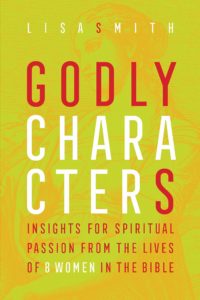 Godly Character(s): Insights for Spiritual Passion from the Lives of 8 Women in the Bible Lisa Smith (Square Halo Books) $16.99 How can I offer a list of rare books by indie publishers and not mention our friends at the classy boutique publisher out of Lancaster, PA, called, curiously, Square Halo Books? We love this little outfit and appreciate their eager collaboration with us. (They are the ones who surprised us with a book on our bookstore’s 35th anniversary, created with chapters by friends and respected scholars, called A Book for Hearts & Minds: What to Read and Why.) You may know they do widely respected books on faith and the arts, on popular culture (like BIgger on the Inside, their book on Doctor Who) and books that teach us how to best “lean in” to and faithfully engage our contemporary world. (See, for instance, the fabulous, entertaining and deeply wise Good Posture: Engaging Current Culture with Ancient Faith by Square Halo booster and pal, Tom Becker of the Lancaster Row House Forums. And, okay, I’ll say it — my own little book, the quite handsome and meaty Serious Dreams: Big Ideas for the Rest of Your Life.) We stock all the books that Square Halo publishes and have reviewed all of their two dozen or so books here at BookNotes. They are top-shelf!
Godly Character(s): Insights for Spiritual Passion from the Lives of 8 Women in the Bible Lisa Smith (Square Halo Books) $16.99 How can I offer a list of rare books by indie publishers and not mention our friends at the classy boutique publisher out of Lancaster, PA, called, curiously, Square Halo Books? We love this little outfit and appreciate their eager collaboration with us. (They are the ones who surprised us with a book on our bookstore’s 35th anniversary, created with chapters by friends and respected scholars, called A Book for Hearts & Minds: What to Read and Why.) You may know they do widely respected books on faith and the arts, on popular culture (like BIgger on the Inside, their book on Doctor Who) and books that teach us how to best “lean in” to and faithfully engage our contemporary world. (See, for instance, the fabulous, entertaining and deeply wise Good Posture: Engaging Current Culture with Ancient Faith by Square Halo booster and pal, Tom Becker of the Lancaster Row House Forums. And, okay, I’ll say it — my own little book, the quite handsome and meaty Serious Dreams: Big Ideas for the Rest of Your Life.) We stock all the books that Square Halo publishes and have reviewed all of their two dozen or so books here at BookNotes. They are top-shelf!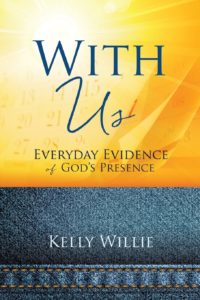 With Us: Everyday Evidence of God’s Presence Kelly Willie (XulonElite) $15.99 When this inspiring, delightful book first came out, I was eager to read it and happy to promote it. It is about a topic we think folks find helpful — the spirituality of the ordinary, so to speak — and also because it was nicely written, sensible, interesting, with some great stories and illustrations of her spiritual discoveries. One reviewer on the back cover said “With Us is a wakeup call for the soul that has been lulled to sleep by the inattentiveness to God’s presence every day.”
With Us: Everyday Evidence of God’s Presence Kelly Willie (XulonElite) $15.99 When this inspiring, delightful book first came out, I was eager to read it and happy to promote it. It is about a topic we think folks find helpful — the spirituality of the ordinary, so to speak — and also because it was nicely written, sensible, interesting, with some great stories and illustrations of her spiritual discoveries. One reviewer on the back cover said “With Us is a wakeup call for the soul that has been lulled to sleep by the inattentiveness to God’s presence every day.”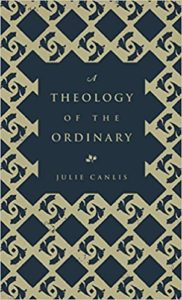 A Theology of the Ordinary Julie Canlis (Godspeed Press) $12.99 I mentioned above our fascination with books about ordinary life, about the spirituality of the mundane, about practicing God’s presence in the quotidian of daily life. There are remarkable books about this, and many are anecdotal or experiential or in the genre of spirituality, I suppose. But this, this is a bit different and nothing short of brilliant. Quiet, but brilliant. A Theology of the Ordinary is less a spiritually or reflection and more a theology; not academic, but still. It is written by a woman with a PhD in theology who has written a stunning, academic book on John Calvin (Calvin’s Ladder: A Spiritual Theology of Ascent and Ascension) but the impetus for the writing of this is part of the story. And it’s a great story.
A Theology of the Ordinary Julie Canlis (Godspeed Press) $12.99 I mentioned above our fascination with books about ordinary life, about the spirituality of the mundane, about practicing God’s presence in the quotidian of daily life. There are remarkable books about this, and many are anecdotal or experiential or in the genre of spirituality, I suppose. But this, this is a bit different and nothing short of brilliant. Quiet, but brilliant. A Theology of the Ordinary is less a spiritually or reflection and more a theology; not academic, but still. It is written by a woman with a PhD in theology who has written a stunning, academic book on John Calvin (Calvin’s Ladder: A Spiritual Theology of Ascent and Ascension) but the impetus for the writing of this is part of the story. And it’s a great story. Faith for Exiles: 5 Ways for a New Generation to Follow Jesus in Digital Babylon David Kinnaman & Mark Matlock (Baker) $21.99 OUR SALE PRICE = $17.59. For some in our audience, this will be a very important book as they have already read what might be seen as the first two in a trilogy co-authored by David Kinnaman. Whether you’ve read them or not, you most likely have heard of the Barna research and the books that came out about young adults who are not Christians and their views of the church (unChristian) or who have left the church of their youth (You Lost Me.) Both of those important books showed that churches of all sorts have a major problem in that many older teens and 20-something think the church is unhelpful and the gospel is irrelevant (or worse.) Those two books explain, in some detail, what the data suggests about how we in the churches have failed our young adults. In a nutshell, one might say those books diagnose the problem and feature (as they should) what we’re doing wrong.
Faith for Exiles: 5 Ways for a New Generation to Follow Jesus in Digital Babylon David Kinnaman & Mark Matlock (Baker) $21.99 OUR SALE PRICE = $17.59. For some in our audience, this will be a very important book as they have already read what might be seen as the first two in a trilogy co-authored by David Kinnaman. Whether you’ve read them or not, you most likely have heard of the Barna research and the books that came out about young adults who are not Christians and their views of the church (unChristian) or who have left the church of their youth (You Lost Me.) Both of those important books showed that churches of all sorts have a major problem in that many older teens and 20-something think the church is unhelpful and the gospel is irrelevant (or worse.) Those two books explain, in some detail, what the data suggests about how we in the churches have failed our young adults. In a nutshell, one might say those books diagnose the problem and feature (as they should) what we’re doing wrong. This long-awaited third one in this series, Faith for Exiles, however, offers some practical (if at times visionary) notions based on the latest Barna studies about churches and ministries that have retained their young adults or ministries; Faith for Exiles examines programs and practices that have been successful and fruitful in effective ministry with that age group. For those that want guidance, ideas, suggestions, best practices, and solid stuff that works in doing ministry with young adults, Faith for Exiles is a must-read.
This long-awaited third one in this series, Faith for Exiles, however, offers some practical (if at times visionary) notions based on the latest Barna studies about churches and ministries that have retained their young adults or ministries; Faith for Exiles examines programs and practices that have been successful and fruitful in effective ministry with that age group. For those that want guidance, ideas, suggestions, best practices, and solid stuff that works in doing ministry with young adults, Faith for Exiles is a must-read.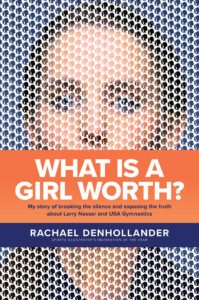 What Is a Girl Worth? My Story of Breaking the Silence and Exposing the Truth About Larry Nassar and USA Gymnastics Rachael Denhollander (Tyndale) $26.99 OUR SALE PRCE = $21.59. We are proud to be able to promote this and trust that many other bookstores will champion this riveting, troubling and inspiring memoir of a Christian leader who has become an international hero. That she and her husband have gotten disgusting letters and social media harassment makes us want to try even harder to show off this fine Christian book. I has gotten some national attention already, received a starred review at Publishers Weekly and is going to be widely discussed. Beth Moore (herself a sexual abuse survivor) has recently said, “This is one of the most important books you’ll ever read.”
What Is a Girl Worth? My Story of Breaking the Silence and Exposing the Truth About Larry Nassar and USA Gymnastics Rachael Denhollander (Tyndale) $26.99 OUR SALE PRCE = $21.59. We are proud to be able to promote this and trust that many other bookstores will champion this riveting, troubling and inspiring memoir of a Christian leader who has become an international hero. That she and her husband have gotten disgusting letters and social media harassment makes us want to try even harder to show off this fine Christian book. I has gotten some national attention already, received a starred review at Publishers Weekly and is going to be widely discussed. Beth Moore (herself a sexual abuse survivor) has recently said, “This is one of the most important books you’ll ever read.” Rachael Denhollander’s voice was heard around the world when she spoke out to end the most shocking scandal in US gymnastics history. The first victim to publicly accuse Larry Nassar, the former USA Gymnastics team doctor who abused hundreds of young athletes, Rachael now reveals her full story for the first time. How did Nassar get away with it for so long? How did Rachael and the other survivors finally stop him and bring him to justice? And how can we protect the vulnerable in our own families, churches, and communities?
Rachael Denhollander’s voice was heard around the world when she spoke out to end the most shocking scandal in US gymnastics history. The first victim to publicly accuse Larry Nassar, the former USA Gymnastics team doctor who abused hundreds of young athletes, Rachael now reveals her full story for the first time. How did Nassar get away with it for so long? How did Rachael and the other survivors finally stop him and bring him to justice? And how can we protect the vulnerable in our own families, churches, and communities?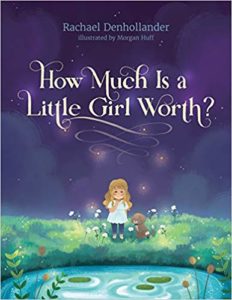 By the way, we also have the soon to be released How Much Is a Little Girl Worth? a children’s book also written by Rachel Denhollander (and illustrated by Morgan Huff) released by Tyndale Kids! ($14.99; OUR SALE PRICE = $11.99.) It’s very nicely done. More on that later…
By the way, we also have the soon to be released How Much Is a Little Girl Worth? a children’s book also written by Rachel Denhollander (and illustrated by Morgan Huff) released by Tyndale Kids! ($14.99; OUR SALE PRICE = $11.99.) It’s very nicely done. More on that later…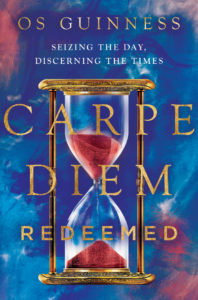 Carpe Diem Redeemed: Seizing the Day, Discerning the Times Os Guinness (IVP) $20.00 OUR SALE PRICE = $16.00. Those that know me know that one of my favorite books — and one we promote tirelessly — is The Call: Finding and Fulfilling God’s Purpose for Your Life, which was released last year in an anniversary edition, a bit more trim in size but with some editing, expansion, and a few new chapters. This book almost single-handedly help create a hunger within certain parts of North American evangelicalism to explore the long-neglected doctrine of calling, especially as it applies to ordinary folks. For too long only priests and nuns, ministers and missionaries, got to use the language of discerning and receiving a call to a particular vocation and Guinness explores how that de-formation happened, how a revitalization of Western culture depends upon a renewed focus on faith and calling, and how a “purpose driven life” is more, much more, than many have realized. Erudite and gracious, literary and beautifully informed by great stories from history (from the Greeks and Romans through to Winston Church and many modern folks, from Picasso to the great filmmaker who created Lawrence of Arabia and the curious jazzman Coltrane.) Guinness is well read and Biblically wise and The Call is simply a contemporary masterpiece, a book nearly everyone should read at least once in their lives.
Carpe Diem Redeemed: Seizing the Day, Discerning the Times Os Guinness (IVP) $20.00 OUR SALE PRICE = $16.00. Those that know me know that one of my favorite books — and one we promote tirelessly — is The Call: Finding and Fulfilling God’s Purpose for Your Life, which was released last year in an anniversary edition, a bit more trim in size but with some editing, expansion, and a few new chapters. This book almost single-handedly help create a hunger within certain parts of North American evangelicalism to explore the long-neglected doctrine of calling, especially as it applies to ordinary folks. For too long only priests and nuns, ministers and missionaries, got to use the language of discerning and receiving a call to a particular vocation and Guinness explores how that de-formation happened, how a revitalization of Western culture depends upon a renewed focus on faith and calling, and how a “purpose driven life” is more, much more, than many have realized. Erudite and gracious, literary and beautifully informed by great stories from history (from the Greeks and Romans through to Winston Church and many modern folks, from Picasso to the great filmmaker who created Lawrence of Arabia and the curious jazzman Coltrane.) Guinness is well read and Biblically wise and The Call is simply a contemporary masterpiece, a book nearly everyone should read at least once in their lives.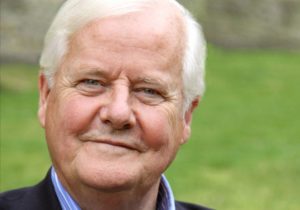
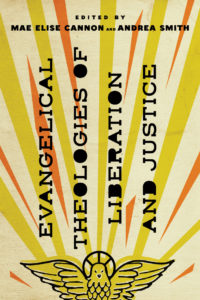 Evangelical Theologies of Liberation and Justice edited by Mae Elise Cannon & Andrea Smith (IVP Academic) $36.00 OUR SALE PRICE = $28.80. I know there are just dozens of wonderful, beautiful, powerful books on a Christian view of justice; Biblically-informed, deeply spiritual books to inspire us to care more about what God most cares about. God moved me to tears not long ago as I read out loud a few passages which link deep knowledge of the God of the Bible with the doing of justice and I was strangely warmed again, gladly. There was a time when one had to insist these verses were really in the Bible, so meager were most church people’s familiarity with the themes of justice in the Hebrew and Christian Scriptures. (I still return to Ron Sider’s Rich Christians in an Age of Hunger for a good overview.) Happily, we have moved deeper into the Biblical story these days and many of our best customers are looking for more detailed or more profound studies to equip them as agents of God’s peace and justice in this distorted, unfair world.
Evangelical Theologies of Liberation and Justice edited by Mae Elise Cannon & Andrea Smith (IVP Academic) $36.00 OUR SALE PRICE = $28.80. I know there are just dozens of wonderful, beautiful, powerful books on a Christian view of justice; Biblically-informed, deeply spiritual books to inspire us to care more about what God most cares about. God moved me to tears not long ago as I read out loud a few passages which link deep knowledge of the God of the Bible with the doing of justice and I was strangely warmed again, gladly. There was a time when one had to insist these verses were really in the Bible, so meager were most church people’s familiarity with the themes of justice in the Hebrew and Christian Scriptures. (I still return to Ron Sider’s Rich Christians in an Age of Hunger for a good overview.) Happily, we have moved deeper into the Biblical story these days and many of our best customers are looking for more detailed or more profound studies to equip them as agents of God’s peace and justice in this distorted, unfair world.
 As it becomes increasingly clear that the Christian right has no theology at all anymore, and moderate evangelicals remain pietistic with a personalized faith with little public square commitments, what theological work needs to happen to serve a Bible-centered, Christ-honoring, historically orthodox foundation for liberation, reconciliation, peace, creation-care, freedom and justice? This is the big project that Mae Cannon and Andrea Smith has taken up, bringing together some older and newer voices and it is a major project. There are amazing pieces in this handbook/anthology called Evangelical Theologies of Liberation and Justice — serious chapters on body shame, on animal liberation, chapters by thinkers of various ethnicities and social locations on how their own status shapes their understand of the Biblical hope. Wow, this is a wild and generative compilation! Kudos to the women editors, of course, and to their evangelical publisher for doing this kind of serious work for the overturning of death-dealing idols and the flourishing of the common good. We hope to get this in very soon, but the
As it becomes increasingly clear that the Christian right has no theology at all anymore, and moderate evangelicals remain pietistic with a personalized faith with little public square commitments, what theological work needs to happen to serve a Bible-centered, Christ-honoring, historically orthodox foundation for liberation, reconciliation, peace, creation-care, freedom and justice? This is the big project that Mae Cannon and Andrea Smith has taken up, bringing together some older and newer voices and it is a major project. There are amazing pieces in this handbook/anthology called Evangelical Theologies of Liberation and Justice — serious chapters on body shame, on animal liberation, chapters by thinkers of various ethnicities and social locations on how their own status shapes their understand of the Biblical hope. Wow, this is a wild and generative compilation! Kudos to the women editors, of course, and to their evangelical publisher for doing this kind of serious work for the overturning of death-dealing idols and the flourishing of the common good. We hope to get this in very soon, but the 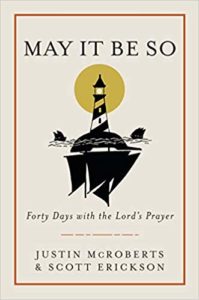 May It Be So: Forty Days with the Lord’s Prayer Justin McRoberts & Scott Erickson (Waterbrook) $16.99 OUR SALE PRICE = $13.59. I mentioned above that Dave Kinnaman describes the big Jubilee conference in Pittsburgh in his forthcoming Faith for Exiles. (He will be speaking there this February, so make plans now to attend! No matter where you live — come to Pittsburgh!) Justin McRoberts & Scott Erickson are two friends who have spent their share of time hanging out in the big book room at Jubilee and, in between speaking and painting and praying and playing music there (they are a talented duo) they cooked up a plan to collaborate on a book which would serve as a prompt to pray. Not exactly a book about praying nor exactly a book of prayers. The readings are nearly like Zen koans, I’ve said, Justin’s allusive and mystical and generous ruminations inspired by Scott the Painter’s very hip graphic designs. I suppose I’m not sure what came first, the pictures or the text, but somehow, they created our of that Jubilee vision an imaginative, remarkably useful, and very popular Prayer: Forty Days of Practice (Waterbrook; $16.99.) This book is one of those rare ones that they self-published — what they called their “Jubilee baby” (conceived as it was, right there in their conversations at the conference) — and it was so hugely well respected that a mainstream publisher picked it up, issuing it in an affordable hardback. This doesn’t happen often, folks, so it is an indication that it was a a very special book.
May It Be So: Forty Days with the Lord’s Prayer Justin McRoberts & Scott Erickson (Waterbrook) $16.99 OUR SALE PRICE = $13.59. I mentioned above that Dave Kinnaman describes the big Jubilee conference in Pittsburgh in his forthcoming Faith for Exiles. (He will be speaking there this February, so make plans now to attend! No matter where you live — come to Pittsburgh!) Justin McRoberts & Scott Erickson are two friends who have spent their share of time hanging out in the big book room at Jubilee and, in between speaking and painting and praying and playing music there (they are a talented duo) they cooked up a plan to collaborate on a book which would serve as a prompt to pray. Not exactly a book about praying nor exactly a book of prayers. The readings are nearly like Zen koans, I’ve said, Justin’s allusive and mystical and generous ruminations inspired by Scott the Painter’s very hip graphic designs. I suppose I’m not sure what came first, the pictures or the text, but somehow, they created our of that Jubilee vision an imaginative, remarkably useful, and very popular Prayer: Forty Days of Practice (Waterbrook; $16.99.) This book is one of those rare ones that they self-published — what they called their “Jubilee baby” (conceived as it was, right there in their conversations at the conference) — and it was so hugely well respected that a mainstream publisher picked it up, issuing it in an affordable hardback. This doesn’t happen often, folks, so it is an indication that it was a a very special book.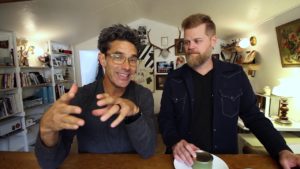
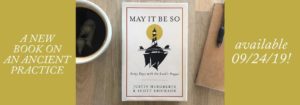
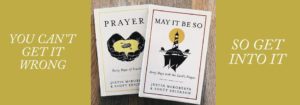
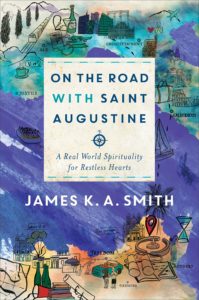 On the Road with Saint Augustine: A Real World Spirituality for Restless Hearts James K.A. Smith (Brazos Press) $24.99 OUR SALE PRICE = $19.99. With no disrespect for any of the other great authors and marvelous books coming out this fall, I think many in our circles will agree that this truly is one of the most highly anticipated and certainly will be one of the most significant spirituality books of the year. Those who followed Smith’s tour de force “Cultural Liturgies Project” comprising of three volumes (Desiring the Kingdom, Imagining the Kingdom, and Awaiting the Kingdom) or the one-volume, more accesible, You Are What You Love, you know of his affection for the great Saint Augustine from Northern Africa. Discipled by Ambrose on the mid-300s, Augustine became a Bishop, helping navigate the church’s role in a deteriorating Roman culture. How can those graciously swept up into the reign of God relate to the corrupt powers of this world? What does it look like in a world falling apart to be “in but not of?” Despite huge foibles and flaws, Augustine’s City of God shaped much Christian public theology and cultural engagement for centuries.
On the Road with Saint Augustine: A Real World Spirituality for Restless Hearts James K.A. Smith (Brazos Press) $24.99 OUR SALE PRICE = $19.99. With no disrespect for any of the other great authors and marvelous books coming out this fall, I think many in our circles will agree that this truly is one of the most highly anticipated and certainly will be one of the most significant spirituality books of the year. Those who followed Smith’s tour de force “Cultural Liturgies Project” comprising of three volumes (Desiring the Kingdom, Imagining the Kingdom, and Awaiting the Kingdom) or the one-volume, more accesible, You Are What You Love, you know of his affection for the great Saint Augustine from Northern Africa. Discipled by Ambrose on the mid-300s, Augustine became a Bishop, helping navigate the church’s role in a deteriorating Roman culture. How can those graciously swept up into the reign of God relate to the corrupt powers of this world? What does it look like in a world falling apart to be “in but not of?” Despite huge foibles and flaws, Augustine’s City of God shaped much Christian public theology and cultural engagement for centuries. And so, Jamie Smith takes seriously the adage that is said to be Augustinian: if you want to know what somebody is really like, don’t ask so much what they believe, but what they love. That is the power of his best-selling You Are What You Love as it reminded both modern day evangelicals and classic mainline denominational folks that dogma and doctrine and even talk of the allusive worldview doesn’t change people’s lives. The center of gravity of the human person is the heart, not the brain, and we must re-oriented our loves, our passions, our affections, note merely try to change minds. And that, as he explains brilliantly in the “Cultural Liturgy” trio and in You Are What You Love, happens through stories. We are conscripted into stories of the good life (or what is said to be the good live), and that often happens through habits and rituals. I won’t re-iterate it now, but that’s why Smith thinks that our hopes to deepen our discipleship in ways that shape us into the sorts of Christians who can faithfully engage the issues of the day and reform the society must start in deep and thoughtful worship of the Triune God. We are what we love, after all.
And so, Jamie Smith takes seriously the adage that is said to be Augustinian: if you want to know what somebody is really like, don’t ask so much what they believe, but what they love. That is the power of his best-selling You Are What You Love as it reminded both modern day evangelicals and classic mainline denominational folks that dogma and doctrine and even talk of the allusive worldview doesn’t change people’s lives. The center of gravity of the human person is the heart, not the brain, and we must re-oriented our loves, our passions, our affections, note merely try to change minds. And that, as he explains brilliantly in the “Cultural Liturgy” trio and in You Are What You Love, happens through stories. We are conscripted into stories of the good life (or what is said to be the good live), and that often happens through habits and rituals. I won’t re-iterate it now, but that’s why Smith thinks that our hopes to deepen our discipleship in ways that shape us into the sorts of Christians who can faithfully engage the issues of the day and reform the society must start in deep and thoughtful worship of the Triune God. We are what we love, after all.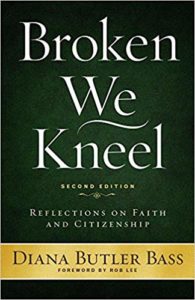 Broken We Kneel: Reflections on Faith and Citizenship (Second Edition)
Broken We Kneel: Reflections on Faith and Citizenship (Second Edition) religious right, either: everywhere we went we heard the drums of war. I admired that Diana — a historian and sociologist with theological training and a congregational, parish educator — was willing to risk her job, perhaps her reputation within her own denomination, to speak out against this warring madness (as the old hymn puts it.) “Broken We Kneel” seems a more faithful and honest and profound and Christ-like slogan, doesn’t it? Broken We Kneel explored her own experience within a church that didn’t quite agree and what it means to adopt this posture of peacemaking and Christian identity. It is a memoir of her season coming to grips with this civil religion stuff but it is also a guide for all of us. The new edition will have some updated chapters showing how this question is as lively and contemporary as ever.
religious right, either: everywhere we went we heard the drums of war. I admired that Diana — a historian and sociologist with theological training and a congregational, parish educator — was willing to risk her job, perhaps her reputation within her own denomination, to speak out against this warring madness (as the old hymn puts it.) “Broken We Kneel” seems a more faithful and honest and profound and Christ-like slogan, doesn’t it? Broken We Kneel explored her own experience within a church that didn’t quite agree and what it means to adopt this posture of peacemaking and Christian identity. It is a memoir of her season coming to grips with this civil religion stuff but it is also a guide for all of us. The new edition will have some updated chapters showing how this question is as lively and contemporary as ever.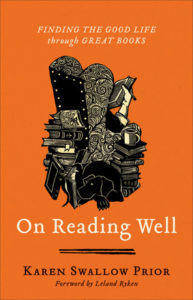 rehearse all that, but we have a whole section in the Dallastown shop which we call “books about books.” Serious literature criticism, memoirs about reading, and Christian arguments for reading widely abound. (I suppose you know we have often mentioned and featured Karen Swallow Prior’s lovely memoir of her own early years by way of the books she read, a great read called Booked: Literature in the Soul of Me and had her in the store last fall to do a presentation on her must-read book on character formation called On Reading Well: Finding the Good Life Through Great Books.
rehearse all that, but we have a whole section in the Dallastown shop which we call “books about books.” Serious literature criticism, memoirs about reading, and Christian arguments for reading widely abound. (I suppose you know we have often mentioned and featured Karen Swallow Prior’s lovely memoir of her own early years by way of the books she read, a great read called Booked: Literature in the Soul of Me and had her in the store last fall to do a presentation on her must-read book on character formation called On Reading Well: Finding the Good Life Through Great Books.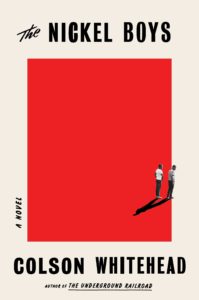 York theatre district (which Beth liked, even though it was fairly graphic in its description of sexuality, a racy feature some will not appreciate.) We feature important ones, especially, such as Barbara Kingsolver’s Unsheltered (which we both loved!) or the latest by award winning Moroccan-born, American novelist, Laila Lalami, The Other Americans, a crime novel revealing much about immigration, and, of course, the brand new (very, very heavy) The Nickel Boys by Colson Whitehead, who wrote last year’s amazingly well done, Pulitzer Prize Winner, The Underground Railroad (which is now out in paperback.) None of us have read it yet, and it may be too gruesome for some tastes, but
York theatre district (which Beth liked, even though it was fairly graphic in its description of sexuality, a racy feature some will not appreciate.) We feature important ones, especially, such as Barbara Kingsolver’s Unsheltered (which we both loved!) or the latest by award winning Moroccan-born, American novelist, Laila Lalami, The Other Americans, a crime novel revealing much about immigration, and, of course, the brand new (very, very heavy) The Nickel Boys by Colson Whitehead, who wrote last year’s amazingly well done, Pulitzer Prize Winner, The Underground Railroad (which is now out in paperback.) None of us have read it yet, and it may be too gruesome for some tastes, but 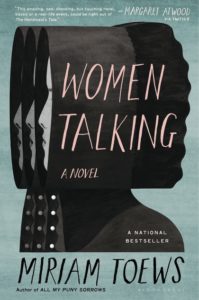 Do you know the work of Miriam Toews, a Canadian with a Mennonite past who writes socially engaged, serious fiction such as her recent Women Talking? It is about sexual abuse within strict Amish-like communities and gained some fame when none other than Margaret Atwood tweeted, “This amazing sad, shocking, but touching novel, based on a real-life event, could be right out of Handmaid’s Tale.” Another writer called it “an astonishment, a volcano of a novel…” and Laura Van Den Berg says it is a “flawless, ferocious work of art.”
Do you know the work of Miriam Toews, a Canadian with a Mennonite past who writes socially engaged, serious fiction such as her recent Women Talking? It is about sexual abuse within strict Amish-like communities and gained some fame when none other than Margaret Atwood tweeted, “This amazing sad, shocking, but touching novel, based on a real-life event, could be right out of Handmaid’s Tale.” Another writer called it “an astonishment, a volcano of a novel…” and Laura Van Den Berg says it is a “flawless, ferocious work of art.”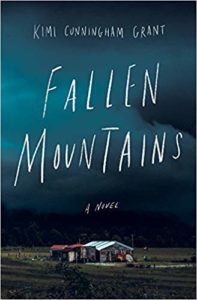 Fallen Mountain Kimi Cunningham Grant (Amberjack Publishing) $14.99 We were alerted to this indie press book by a good friend of ours, a discerning reader and good writer herself who is a friend of the author. (Hey, Erica Young Reitz, we even saw how you are thanked in the acknowledgments for helping the author think through the ending.) Ms Grant is a central Pennsylvania native and attended Messiah College. She has won numerous poetry awards and received a Pennsylvania Council on the Arts Fellowship grant, so is obviously a young writer to pay attention to. And she is, indeed, a good storyteller, has a way with words, and can craft good, good pages that draw out her characters. This slow, building plot set in the mountains of North Central PA.
Fallen Mountain Kimi Cunningham Grant (Amberjack Publishing) $14.99 We were alerted to this indie press book by a good friend of ours, a discerning reader and good writer herself who is a friend of the author. (Hey, Erica Young Reitz, we even saw how you are thanked in the acknowledgments for helping the author think through the ending.) Ms Grant is a central Pennsylvania native and attended Messiah College. She has won numerous poetry awards and received a Pennsylvania Council on the Arts Fellowship grant, so is obviously a young writer to pay attention to. And she is, indeed, a good storyteller, has a way with words, and can craft good, good pages that draw out her characters. This slow, building plot set in the mountains of North Central PA.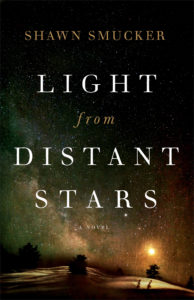 Light from Distant Stars Shawn Smucker (Baker) $14.99 I so badly want to explain what we like about this great new book, and have so much to say. Since the death of my mother, this book that opens in a funeral home and is largely about the relationship of a son and his deceased father, is more poignant for me than I knew when I started this review almost a month ago. I have carefully read this fascinating, entertaining, curious novel, written about it, erased it all, tried to re-write a better review, participated in a book release event party (sponsored by the author’s Lancaster friends The Row House Forum and Square Halo Gallery) and have pondered it over and over again. It means a lot to me this summer and we would be very happy if you ordered it from us so you can join in the buzz.
Light from Distant Stars Shawn Smucker (Baker) $14.99 I so badly want to explain what we like about this great new book, and have so much to say. Since the death of my mother, this book that opens in a funeral home and is largely about the relationship of a son and his deceased father, is more poignant for me than I knew when I started this review almost a month ago. I have carefully read this fascinating, entertaining, curious novel, written about it, erased it all, tried to re-write a better review, participated in a book release event party (sponsored by the author’s Lancaster friends The Row House Forum and Square Halo Gallery) and have pondered it over and over again. It means a lot to me this summer and we would be very happy if you ordered it from us so you can join in the buzz. For starters, as we have said before, Shawn Smucker is a fine writer, a friend of Hearts & Minds, and a truly decent guy; he received great acclaim for two very well-written YA fantasy novels (The Day the Angels Fell and The Edge of Over There that we have highly recommended) and an inspiring (dare I say necessary) memoir Once We Were Strangers about his friendship with a Syrian refugee in his hometown of Lancaster, PA. He’s co-written a few biographies too, so has been honing his artful writing chops since his days as a lit major in the good program at Messiah College.
For starters, as we have said before, Shawn Smucker is a fine writer, a friend of Hearts & Minds, and a truly decent guy; he received great acclaim for two very well-written YA fantasy novels (The Day the Angels Fell and The Edge of Over There that we have highly recommended) and an inspiring (dare I say necessary) memoir Once We Were Strangers about his friendship with a Syrian refugee in his hometown of Lancaster, PA. He’s co-written a few biographies too, so has been honing his artful writing chops since his days as a lit major in the good program at Messiah College.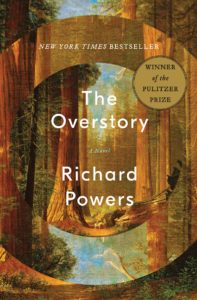 The Overstory Richard Powers (Norton) $18.95 Good friends who read a lot of contemporary fiction kept telling about this and we watched as some smart customers bought it and it was increasingly mentioned on literary blogs and appeared on “best of” lists in newspapers and journals all over the country. This was before it won the 2018 Pulitzer Prize. Beth eagerly picked it up this Spring and found it to be one of the most beautifully crafted works she has read in ages. She has a good eye for good writing and was so taken by some passages she put little Post-it notes on certain pages to read them out loud, later. What writing! What an artful, respected piece of modern fiction.
The Overstory Richard Powers (Norton) $18.95 Good friends who read a lot of contemporary fiction kept telling about this and we watched as some smart customers bought it and it was increasingly mentioned on literary blogs and appeared on “best of” lists in newspapers and journals all over the country. This was before it won the 2018 Pulitzer Prize. Beth eagerly picked it up this Spring and found it to be one of the most beautifully crafted works she has read in ages. She has a good eye for good writing and was so taken by some passages she put little Post-it notes on certain pages to read them out loud, later. What writing! What an artful, respected piece of modern fiction.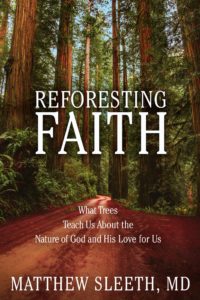 Evangelical MD turned environmentalist Matthew Sleeth recently wrote Reforesting Faith: What Trees Can Teach Us About God and if you’re not up for Mr. Power’s strikingly imaginative story about trees, read Sleeth, first, and then read Overstory. Or, if you find the beauty and power of a fictional story about trees and greed and conflict and life and death to be deeply compelling, then read Power’s novel first, then the non-fiction Reforesting Faith next.) In any event Richard Powers is a gifted writer, an astonishing storyteller, and his drama is thick and engaging. It’s a beauty of a book.
Evangelical MD turned environmentalist Matthew Sleeth recently wrote Reforesting Faith: What Trees Can Teach Us About God and if you’re not up for Mr. Power’s strikingly imaginative story about trees, read Sleeth, first, and then read Overstory. Or, if you find the beauty and power of a fictional story about trees and greed and conflict and life and death to be deeply compelling, then read Power’s novel first, then the non-fiction Reforesting Faith next.) In any event Richard Powers is a gifted writer, an astonishing storyteller, and his drama is thick and engaging. It’s a beauty of a book.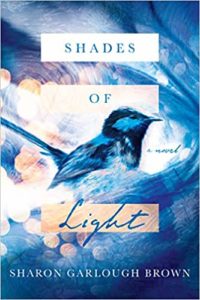 Shades of Light Sharon Garlough Brown IVP) $18.00 I have written about this before and a few interested customers were eager to pre-order it. We just got it into the store last week, a bit ahead of the scheduled mid-August release, and we’ve sent it out to those who have already ordered it. You may recall that I touted it as a realistic spiritual story that moved me, surprisingly so.
Shades of Light Sharon Garlough Brown IVP) $18.00 I have written about this before and a few interested customers were eager to pre-order it. We just got it into the store last week, a bit ahead of the scheduled mid-August release, and we’ve sent it out to those who have already ordered it. You may recall that I touted it as a realistic spiritual story that moved me, surprisingly so.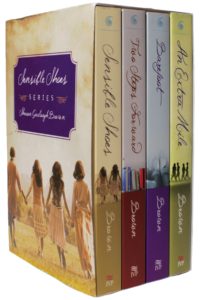 These four “Sensible Shoes” novels (each published by IVP) are a delight because there isn’t much popular storytelling about those sorts of topics or characters who take up intentional spiritual practices.
These four “Sensible Shoes” novels (each published by IVP) are a delight because there isn’t much popular storytelling about those sorts of topics or characters who take up intentional spiritual practices. My Dearest Dietrich: A Novel of Dietrich Bonhoeffer’s Lost Love Amanda Barratt (Kregel) $21.99 This is a brand new novel that I just had to mention even though we have not yet read it. There have been a few other authors brave enough to create a novel set in World War II era Germany, using that backdrop to explore, in fictional storytelling, what it might have been like to be romantically involved with Dietrich Bonhoeffer during the years of his underground seminary and resistance to National Socialism and Hitler. We have letters from him during those years of his imprisonment starting on February 7, 1945, the day after he turned 39 when he was transferred from his prison in Berlin to Buchenwald to Regensburg to Flossenburg.
My Dearest Dietrich: A Novel of Dietrich Bonhoeffer’s Lost Love Amanda Barratt (Kregel) $21.99 This is a brand new novel that I just had to mention even though we have not yet read it. There have been a few other authors brave enough to create a novel set in World War II era Germany, using that backdrop to explore, in fictional storytelling, what it might have been like to be romantically involved with Dietrich Bonhoeffer during the years of his underground seminary and resistance to National Socialism and Hitler. We have letters from him during those years of his imprisonment starting on February 7, 1945, the day after he turned 39 when he was transferred from his prison in Berlin to Buchenwald to Regensburg to Flossenburg.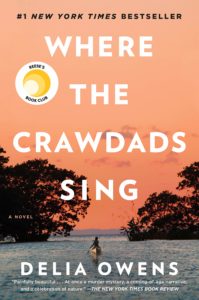 Where the Crawdads Sing Delia Owens (Putnam) $26.00 I mentioned this in passing, above, as it has been riding at the top (or near the top) of all the standard best-seller lists and is hugely popular this summer. It has sold more than 2 million copies (in part due to its choice as a “Reese’s Book Club” selection. (That Reese Witherspoon has very good Southern taste, I must say!)
Where the Crawdads Sing Delia Owens (Putnam) $26.00 I mentioned this in passing, above, as it has been riding at the top (or near the top) of all the standard best-seller lists and is hugely popular this summer. It has sold more than 2 million copies (in part due to its choice as a “Reese’s Book Club” selection. (That Reese Witherspoon has very good Southern taste, I must say!)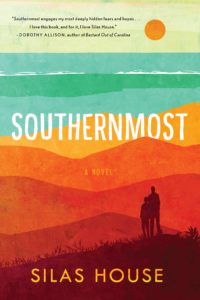 Southernmost Silas House (Algonquin Books) $15.95 This publisher is renowned for good, classy, meaty (Southern) stories, and this one just released in paperback – called “bracing, honest, and luminous” — is no exception. The fictional Asher Sharp is an evangelical preacher who is, as it says on the back cover, “willing to give up everything for what he believes in. Except his son.”
Southernmost Silas House (Algonquin Books) $15.95 This publisher is renowned for good, classy, meaty (Southern) stories, and this one just released in paperback – called “bracing, honest, and luminous” — is no exception. The fictional Asher Sharp is an evangelical preacher who is, as it says on the back cover, “willing to give up everything for what he believes in. Except his son.”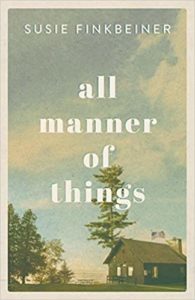 All Manner of Things Susie Finkbeiner (Revell) $15.99 I think the simple cover and the curious title (hasn’t that ever been used as a book title before?) first struck me, as did the imagination-capturing blurb from Jocelyn Green, a Christy Award-winning author of Between Two Shores, who wrote, “Some books are meant to be read. All Manner of Things is meant to be lived in.” If the characters are real and the story important, this quote is a huge invitation, eh?
All Manner of Things Susie Finkbeiner (Revell) $15.99 I think the simple cover and the curious title (hasn’t that ever been used as a book title before?) first struck me, as did the imagination-capturing blurb from Jocelyn Green, a Christy Award-winning author of Between Two Shores, who wrote, “Some books are meant to be read. All Manner of Things is meant to be lived in.” If the characters are real and the story important, this quote is a huge invitation, eh?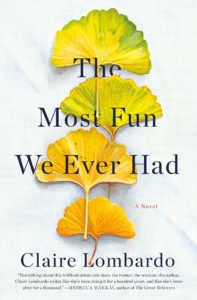 The Most Fun We Ever Had Claire Lombardo (Doubleday) $28.95 Okay, I’ll admit it. I got this into our store mostly because I loved the cover. And I read a fabulous review. (But mostly the cover.) Some people just love holding this kind of a big, thick, novel — I recently ordered for myself another hardcover copy of Elizabeth Gilbert’s splendid The Signature of All Things just because such a sprawling, epic, wondrous novel deserves a material heft in the hand to match the story. The Most Fun We Ever Had, a debut novel with amazing endorsements from the likes of Richard Russo and Affinity Konar, despite the cheery title, just seems to deserve this good, fat, 500 page volume. It’s apparently an ambitious, sprawling, multi-generational novel about the life-long friendship of four sisters and their respective families. The Guardian said it could be the “literary love child of Jonathan Franzen and Anne Tyler.” Ha.
The Most Fun We Ever Had Claire Lombardo (Doubleday) $28.95 Okay, I’ll admit it. I got this into our store mostly because I loved the cover. And I read a fabulous review. (But mostly the cover.) Some people just love holding this kind of a big, thick, novel — I recently ordered for myself another hardcover copy of Elizabeth Gilbert’s splendid The Signature of All Things just because such a sprawling, epic, wondrous novel deserves a material heft in the hand to match the story. The Most Fun We Ever Had, a debut novel with amazing endorsements from the likes of Richard Russo and Affinity Konar, despite the cheery title, just seems to deserve this good, fat, 500 page volume. It’s apparently an ambitious, sprawling, multi-generational novel about the life-long friendship of four sisters and their respective families. The Guardian said it could be the “literary love child of Jonathan Franzen and Anne Tyler.” Ha.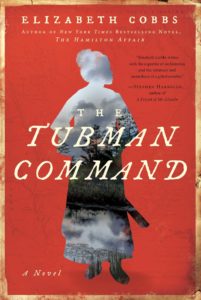 The Tubman Command Elizabeth Cobbs (Arcade) $25.99 If you follow serious historical fiction you may know of Cobbs for her best-selling novel, The Hamilton Affair. Here she offers a fictionalized account of a lesser known event in American history, the time in May 1863 when the demoralized Union Army (having suffered fresh losses at the Battle of Chancellorsville and Fort Sumter stood to taunt the American Navy) recruited a woman with the code-name Moses. You know this is the heroic (and by that time, hunted by the Confederates) Harriet Tubman.
The Tubman Command Elizabeth Cobbs (Arcade) $25.99 If you follow serious historical fiction you may know of Cobbs for her best-selling novel, The Hamilton Affair. Here she offers a fictionalized account of a lesser known event in American history, the time in May 1863 when the demoralized Union Army (having suffered fresh losses at the Battle of Chancellorsville and Fort Sumter stood to taunt the American Navy) recruited a woman with the code-name Moses. You know this is the heroic (and by that time, hunted by the Confederates) Harriet Tubman.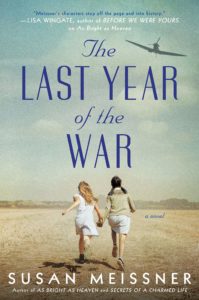 The Last Year of the War Susan Meissner (Berkley) $26.00 I wanted to list this since it is one Beth found very engaging and very entertaining. It is a beautifully poignant novel, with what one reviewer said “explores the complexities of love, friendship, and the fleeting truths of identity.” The prose is truly lovely, even if it highlights a dark aspect of our culture and a sad time in American history.
The Last Year of the War Susan Meissner (Berkley) $26.00 I wanted to list this since it is one Beth found very engaging and very entertaining. It is a beautifully poignant novel, with what one reviewer said “explores the complexities of love, friendship, and the fleeting truths of identity.” The prose is truly lovely, even if it highlights a dark aspect of our culture and a sad time in American history.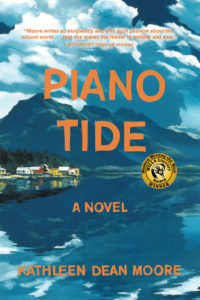 Piano Tide Kathleen Dean Moore (Counterpoint) $16.95 This is not a brand new novel, but we somehow had missed it, even though it was written by a memoirist and nature writer that I adore. I’ve read several of Moore’s beautiful non-fiction works (such as Pine Island Paradox and Holdfast and Wild Comfort: The Solace of Nature.) Her recent polemic is important and passionate, called Great Tide Rising: Towards Clarity and Moral Courage in a Time of Planetary Change. We stock them all, of course. I had completely missed that this philosophy professor and mom and ecologist and climate change activist had tried her hand at a novel. She’s such a good writer that I figured we should carry it.
Piano Tide Kathleen Dean Moore (Counterpoint) $16.95 This is not a brand new novel, but we somehow had missed it, even though it was written by a memoirist and nature writer that I adore. I’ve read several of Moore’s beautiful non-fiction works (such as Pine Island Paradox and Holdfast and Wild Comfort: The Solace of Nature.) Her recent polemic is important and passionate, called Great Tide Rising: Towards Clarity and Moral Courage in a Time of Planetary Change. We stock them all, of course. I had completely missed that this philosophy professor and mom and ecologist and climate change activist had tried her hand at a novel. She’s such a good writer that I figured we should carry it.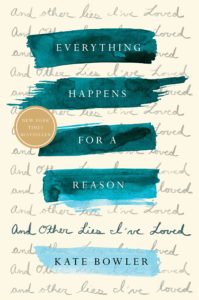 Everything Happens for a Reason And Other Lies I’ve Loved Kate Bowler (Random House) $16.00 paperback/$26.00 hardcover I know this isn’t brand new and I have to admit neither Beth nor I had read it when it was at the height of its buzz a year ago. We knew Bowler’s impressive and charitable ethnographic study of Pentecostal and prosperity preachers (Blessed, published by Oxford University Press) and knew that, in the midst of becoming a scholar of religion and teacher at Duke Divinity School, she was diagnosed with an awful, quickly developing, terminal brain tumor. We put the book under death and dying in our store, recommended it to those experiencing illness and, more, loss. I suppose that works, but now I also want to shelve it in our ordinary memoir section; this really isn’t a systematic critique of cheesy things people say or simplistic theology or even a theodicy, as such. It is her story. It is a memoir. And I Couldn’t. Put. It. Down. I’m not kidding – I laughed and cried and read some of the good parts out loud and told everybody I knew that week that they had to read this right away. My goodness, what a read, what a storyteller, what an experience she has had.
Everything Happens for a Reason And Other Lies I’ve Loved Kate Bowler (Random House) $16.00 paperback/$26.00 hardcover I know this isn’t brand new and I have to admit neither Beth nor I had read it when it was at the height of its buzz a year ago. We knew Bowler’s impressive and charitable ethnographic study of Pentecostal and prosperity preachers (Blessed, published by Oxford University Press) and knew that, in the midst of becoming a scholar of religion and teacher at Duke Divinity School, she was diagnosed with an awful, quickly developing, terminal brain tumor. We put the book under death and dying in our store, recommended it to those experiencing illness and, more, loss. I suppose that works, but now I also want to shelve it in our ordinary memoir section; this really isn’t a systematic critique of cheesy things people say or simplistic theology or even a theodicy, as such. It is her story. It is a memoir. And I Couldn’t. Put. It. Down. I’m not kidding – I laughed and cried and read some of the good parts out loud and told everybody I knew that week that they had to read this right away. My goodness, what a read, what a storyteller, what an experience she has had.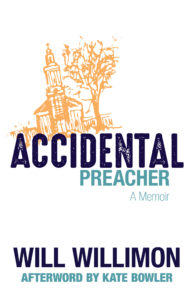 Accidental Preacher: A Memoir Will Willimon (Eerdmans) $24.99 We want to be among the first to announce this – and note that there is a lovely Afterword by Kate Bowler. I suppose Willimon is one of those writers who most everyone who reads BookNotes would have heard of. He’s written dozens of books (which have sold over a million copies) and is often cited as one of the best preachers in America. He has been a rural pastor, an urbane preacher, a scholar, writer (including a novel), a seminary professor, a chaplain (at Duke) and a United Methodist Bishop. He has co-written books with his friend Stanley Hauerwas and is considered, by some, too theologically conservative and, by others, too theologically liberal. Some say he’s cranky, others say he’s a softy. We first heard him here in Dallastown (yes, at a small UCC church, decades ago) and he spoke at our Pittsburgh Jubilee conference. He has been outspoken on the need for the church to be theologically astute, for pastors to be caring but deep, and for the church to bear witness to the ways of Christ in society, standing against injustice, racism and apathy about poverty. He’s our kind of guy.
Accidental Preacher: A Memoir Will Willimon (Eerdmans) $24.99 We want to be among the first to announce this – and note that there is a lovely Afterword by Kate Bowler. I suppose Willimon is one of those writers who most everyone who reads BookNotes would have heard of. He’s written dozens of books (which have sold over a million copies) and is often cited as one of the best preachers in America. He has been a rural pastor, an urbane preacher, a scholar, writer (including a novel), a seminary professor, a chaplain (at Duke) and a United Methodist Bishop. He has co-written books with his friend Stanley Hauerwas and is considered, by some, too theologically conservative and, by others, too theologically liberal. Some say he’s cranky, others say he’s a softy. We first heard him here in Dallastown (yes, at a small UCC church, decades ago) and he spoke at our Pittsburgh Jubilee conference. He has been outspoken on the need for the church to be theologically astute, for pastors to be caring but deep, and for the church to bear witness to the ways of Christ in society, standing against injustice, racism and apathy about poverty. He’s our kind of guy.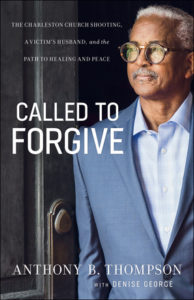 Called to Forgive: The Charleston Church Shooting, A Victim’s Husband, and the Path to Healing and Grace Anthony B. Thompson, with Denise George (Bethany House) $17.99 This past June was the fourth year anniversary of the awful day when Dylann Roof attended the Wednesday evening Bible study at the predominantly black Mother Emanuel AME Church in Charleston, South Carolina. Roof killed nine African-Americans as they prayed and one was Myra Thompson, the wife of Reverend Anthony Thompson.
Called to Forgive: The Charleston Church Shooting, A Victim’s Husband, and the Path to Healing and Grace Anthony B. Thompson, with Denise George (Bethany House) $17.99 This past June was the fourth year anniversary of the awful day when Dylann Roof attended the Wednesday evening Bible study at the predominantly black Mother Emanuel AME Church in Charleston, South Carolina. Roof killed nine African-Americans as they prayed and one was Myra Thompson, the wife of Reverend Anthony Thompson.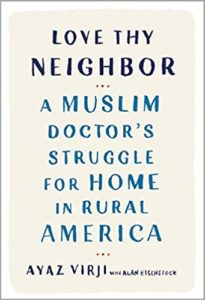 Love Thy Neighbor: A Muslim Doctor’s Struggle for Home in Rural America Ayaz Virji (Convergent) $26.00 This is pretty much just what you’d expect, but I was very, very moved, nicely entertained, a bit troubled, and very glad I picked this up. It had me hooked by the fist dramatic page. It had gotten a coveted starred review from Publisher’s Weekly and is (I think) the first book by an Islamic author published by this progressive, Christian publishing house. Love Thy Neighbor: A Muslim Doctor’s Struggle for Home is a great read — lovely, hard, important.
Love Thy Neighbor: A Muslim Doctor’s Struggle for Home in Rural America Ayaz Virji (Convergent) $26.00 This is pretty much just what you’d expect, but I was very, very moved, nicely entertained, a bit troubled, and very glad I picked this up. It had me hooked by the fist dramatic page. It had gotten a coveted starred review from Publisher’s Weekly and is (I think) the first book by an Islamic author published by this progressive, Christian publishing house. Love Thy Neighbor: A Muslim Doctor’s Struggle for Home is a great read — lovely, hard, important.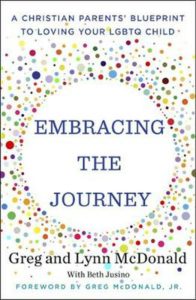 Embracing the Journey: A Christian Parent’s Blueprint to Loving Your LGBTQ Child Greg and Lynn McDonald (Howard Books) $26.00 Not everyone will agree with this journey – reluctant at times – towards acceptance and inclusion that these evangelical parents promote, but I do not list it firstly as a self-help guide for religious parents and their LGBTQ+ adult kids. I list it here as a memoir, a story, a captivating, engaging narrative of a family coping with their own unique situation and the conflict and renewed deepening of discipleship and faith in evoked.
Embracing the Journey: A Christian Parent’s Blueprint to Loving Your LGBTQ Child Greg and Lynn McDonald (Howard Books) $26.00 Not everyone will agree with this journey – reluctant at times – towards acceptance and inclusion that these evangelical parents promote, but I do not list it firstly as a self-help guide for religious parents and their LGBTQ+ adult kids. I list it here as a memoir, a story, a captivating, engaging narrative of a family coping with their own unique situation and the conflict and renewed deepening of discipleship and faith in evoked.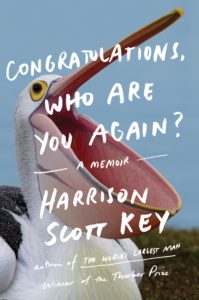 Congratulations, Who Are You Again? A Memoir Harrison Scott Key (Harper Perennial) $15.99 For some of us, taking books on a vacation or sitting under a canopy in the back deck, is a special pleasure this time of year and I wanted to suggest at least one book that was wise and truly funny, engrossing and sure to make you chuckle out loud. A buddy of mine and mail order customer of ours mentioned to me that he is in a little band in his church – a bunch of older guys who get together to rock out about old guy stuff, which itself is kinda of funny – and that memoirist Harrison Scott Key was in this little side hustle of his. Holy smokes, I couldn’t believe it. Key wrote the best-selling and evidently hilarious memoir-ish collection of essays called The World’s Largest Man and thereby won the prestigious Thurber Prize. As in James Thurber. As in fine, literary comedic prose.
Congratulations, Who Are You Again? A Memoir Harrison Scott Key (Harper Perennial) $15.99 For some of us, taking books on a vacation or sitting under a canopy in the back deck, is a special pleasure this time of year and I wanted to suggest at least one book that was wise and truly funny, engrossing and sure to make you chuckle out loud. A buddy of mine and mail order customer of ours mentioned to me that he is in a little band in his church – a bunch of older guys who get together to rock out about old guy stuff, which itself is kinda of funny – and that memoirist Harrison Scott Key was in this little side hustle of his. Holy smokes, I couldn’t believe it. Key wrote the best-selling and evidently hilarious memoir-ish collection of essays called The World’s Largest Man and thereby won the prestigious Thurber Prize. As in James Thurber. As in fine, literary comedic prose.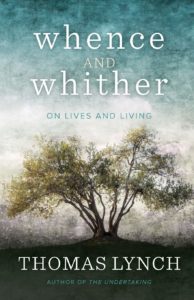 Whence and Whither: On Live and Living Thomas Lynch (WJK) $18.00 With a nice textured cover with French folds and deckled edges, this handsome paperback book bears a certain sort of weight, insinuating that it is serious, mature, heavy, even. And it is. The writer is the nearly legendary author of the late 1990’s book about the funeral business called The Undertaking: Life Notes from the Dismal Trade and it’s wonderful, must-read sequel, Bodies at Motion and at Rest: On Metaphor and Morality. These are among my all-time favorite books, by the way, and we have subsequently carried and promoted Lynch’s poetry, his memoir about going back to Ireland, Booking Passage, and, of course, his co-authored books with theologian and preacher Thomas Long on a theology of and righteous practice of funerals (The Good Funeral.) Lynch is a literate figure, intellectual and writerly, and his prose is stunning; it moves from humorous storytelling to philosophical observations, from artful lines and illuminating insight. And he wrote me a letter, once, so there’s that. I love this guy.
Whence and Whither: On Live and Living Thomas Lynch (WJK) $18.00 With a nice textured cover with French folds and deckled edges, this handsome paperback book bears a certain sort of weight, insinuating that it is serious, mature, heavy, even. And it is. The writer is the nearly legendary author of the late 1990’s book about the funeral business called The Undertaking: Life Notes from the Dismal Trade and it’s wonderful, must-read sequel, Bodies at Motion and at Rest: On Metaphor and Morality. These are among my all-time favorite books, by the way, and we have subsequently carried and promoted Lynch’s poetry, his memoir about going back to Ireland, Booking Passage, and, of course, his co-authored books with theologian and preacher Thomas Long on a theology of and righteous practice of funerals (The Good Funeral.) Lynch is a literate figure, intellectual and writerly, and his prose is stunning; it moves from humorous storytelling to philosophical observations, from artful lines and illuminating insight. And he wrote me a letter, once, so there’s that. I love this guy.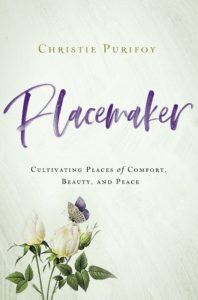 Placemaker: Cultivating Places of Comfort, Beauty, and Peace Christie Purifoy (Zondervan) $18.99 It is one of the great joys of recent months to have gotten the chance to finally meet Pennsylvania author Christie Purifoy, a memoirist and essayist of the finest quality, who can turn a phrase like nobody’s business. A few years ago she wrote a lovely book about her spacious, old farmhouse “in four seasons” (Roots & Sky: A Journey Home in Four Seasons) and it was quite good. But his Placemaker book is extraordinary, delightful, compelling, enjoyable on many levels. The other evening at a book event she read movingly from a section about fermentation (you know, sauerkraut, kombucha, making pickles, even.) The Earth’s processes of death and decay, entropy, chaos and the like became a window for reflecting on our desires for control, for reigning in the chaos. She frets about these things as we do, but she also tends orchards and writes glowingly about trees. Creation and Fall and Redemption swirl together in her gorgeous reflective prose and a book about place becomes a vision for living into God’s healing ways, on Earth as it is in Heaven.
Placemaker: Cultivating Places of Comfort, Beauty, and Peace Christie Purifoy (Zondervan) $18.99 It is one of the great joys of recent months to have gotten the chance to finally meet Pennsylvania author Christie Purifoy, a memoirist and essayist of the finest quality, who can turn a phrase like nobody’s business. A few years ago she wrote a lovely book about her spacious, old farmhouse “in four seasons” (Roots & Sky: A Journey Home in Four Seasons) and it was quite good. But his Placemaker book is extraordinary, delightful, compelling, enjoyable on many levels. The other evening at a book event she read movingly from a section about fermentation (you know, sauerkraut, kombucha, making pickles, even.) The Earth’s processes of death and decay, entropy, chaos and the like became a window for reflecting on our desires for control, for reigning in the chaos. She frets about these things as we do, but she also tends orchards and writes glowingly about trees. Creation and Fall and Redemption swirl together in her gorgeous reflective prose and a book about place becomes a vision for living into God’s healing ways, on Earth as it is in Heaven.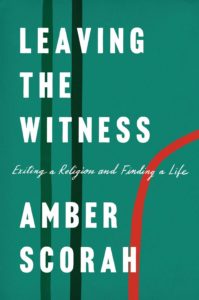 Leaving the Witness: Exiting Religion and Finding a Life Amber Scorah (Viking) $26.00 I don’t usually feel a need to warn folks about a book, although this (and the next I’ll describe) carry a bit of a concern. Bear with me while I describe this too quickly. I couldn’t put it down, staying up to the wee hours, and yet was so very deeply saddened by how this story ends, as the subtitle implies, in atheism. This calm willingness to face an essentially meaningless life devoid of faith or the transcendent is unsettling, and I trust that it will not unduly influence readers in that (tragic) direction. I worry about such things.
Leaving the Witness: Exiting Religion and Finding a Life Amber Scorah (Viking) $26.00 I don’t usually feel a need to warn folks about a book, although this (and the next I’ll describe) carry a bit of a concern. Bear with me while I describe this too quickly. I couldn’t put it down, staying up to the wee hours, and yet was so very deeply saddened by how this story ends, as the subtitle implies, in atheism. This calm willingness to face an essentially meaningless life devoid of faith or the transcendent is unsettling, and I trust that it will not unduly influence readers in that (tragic) direction. I worry about such things.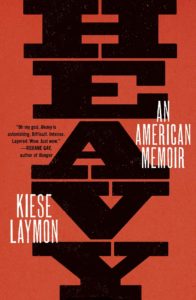 Heavy: An American Memoir Kiese Laymon (Scribner) $26.00 hardback; $16.00 paperback Oh my, this is another that I couldn’t put down, that moved me considerably, that I want to commend, but feel like I have to offer some honest notes so you can determine if this book is for you or not. I picked it up for a variety of reasons; like many Hearts & Minds friends and customers, I am a white guy wanting to be more deeply aware of the stories of people of color; as the subtitle suggests, it is a deeply American story and I do not want to look away. I am also interested in questions of the body, how weight is seen and experienced – I mentioned feminist hero and great, great writer Roxanne Gay, above, and it was her lively endorsement of Heavy that really caught my attention. If she says the topic and the prose is that breathtaking, I knew I wanted to read it.
Heavy: An American Memoir Kiese Laymon (Scribner) $26.00 hardback; $16.00 paperback Oh my, this is another that I couldn’t put down, that moved me considerably, that I want to commend, but feel like I have to offer some honest notes so you can determine if this book is for you or not. I picked it up for a variety of reasons; like many Hearts & Minds friends and customers, I am a white guy wanting to be more deeply aware of the stories of people of color; as the subtitle suggests, it is a deeply American story and I do not want to look away. I am also interested in questions of the body, how weight is seen and experienced – I mentioned feminist hero and great, great writer Roxanne Gay, above, and it was her lively endorsement of Heavy that really caught my attention. If she says the topic and the prose is that breathtaking, I knew I wanted to read it. We used to complain about gridlock and the lack of civility. Now we have a left wing guy shooting Republican congress-people while they are playing baseball. And lefty feminista politicians get vile rape threats almost daily. Helping fuel this ugliness we have a President who cannot be civil because he can’t follow the plain Bible command to tame his tongue. Or his twitching, tweeting, fingers. We elected a man who said he was proud about his greed and who exhibits traits of narcissism, a self-professed sexual abuser and then some fundamentalist Christians circled the wagons around him, saying he gets a “mulligan.” In response many others grow more and more angry. Both sides accuse the others of holding to double standards. (Thanks to PennLive for the cartoon.) It seems to me that nobody should be happy with how things are these days.
We used to complain about gridlock and the lack of civility. Now we have a left wing guy shooting Republican congress-people while they are playing baseball. And lefty feminista politicians get vile rape threats almost daily. Helping fuel this ugliness we have a President who cannot be civil because he can’t follow the plain Bible command to tame his tongue. Or his twitching, tweeting, fingers. We elected a man who said he was proud about his greed and who exhibits traits of narcissism, a self-professed sexual abuser and then some fundamentalist Christians circled the wagons around him, saying he gets a “mulligan.” In response many others grow more and more angry. Both sides accuse the others of holding to double standards. (Thanks to PennLive for the cartoon.) It seems to me that nobody should be happy with how things are these days.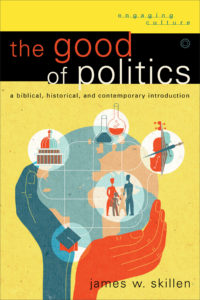 ’ve written much, before, here at BookNotes, about developing a uniquely Christian worldview that funds a distinctively Christian approach to politics. Before we get to the topic of civility and the fraying of our culture and perhaps our Republic, I want to remind us about this. See
’ve written much, before, here at BookNotes, about developing a uniquely Christian worldview that funds a distinctively Christian approach to politics. Before we get to the topic of civility and the fraying of our culture and perhaps our Republic, I want to remind us about this. See 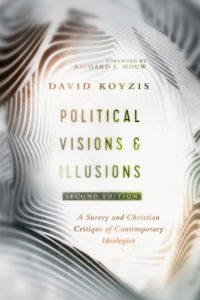
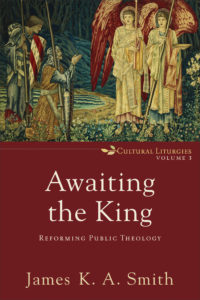 Heady stuff like Political Visions & Illusions: A Survey & Christian Critique of Contemporary Ideologies (now out in an important second edition) by David Koyzis (IVP Academic; $33.00) critiques the ideologies of the left and the right and the roots of their pagan, Enlightenment-era political philosophies. What a powerful, important read — vital for the serious-minded Christian citizen. Similarly, James K.A. Smith’s third volume in his must-read, if demanding, “Cultural Liturgies” trilogy, Awaiting the King: Reforming Public Theology (Baker Academic; $22.99) is, again, intellectually robust but very, very important.
Heady stuff like Political Visions & Illusions: A Survey & Christian Critique of Contemporary Ideologies (now out in an important second edition) by David Koyzis (IVP Academic; $33.00) critiques the ideologies of the left and the right and the roots of their pagan, Enlightenment-era political philosophies. What a powerful, important read — vital for the serious-minded Christian citizen. Similarly, James K.A. Smith’s third volume in his must-read, if demanding, “Cultural Liturgies” trilogy, Awaiting the King: Reforming Public Theology (Baker Academic; $22.99) is, again, intellectually robust but very, very important. 
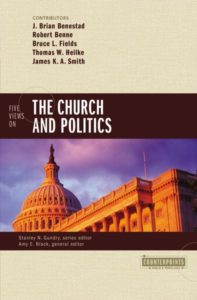 We have recommended the fascinating five-views across the spectrum dialogue expertly edited by P.C. Kemeny called Church, State and Public Justice: Five Views (IVP Academic; $22.00) and the more recent five-fold back and forth in the Counterpoints series dialogue in Five Views on the Church and Politics edited by the wonderful Amy Black (Zondervan; $19.99.) Whenever I mention this I rave about Jamie Smith’s helpful contribution not only offering a Kuyperian type neo-Calvinist pluralistic approach, but in his ecumenically astute feedback after the other chapters a Lutheran, an Anabaptist, a Roman Catholic, and a historic, black church approach.
We have recommended the fascinating five-views across the spectrum dialogue expertly edited by P.C. Kemeny called Church, State and Public Justice: Five Views (IVP Academic; $22.00) and the more recent five-fold back and forth in the Counterpoints series dialogue in Five Views on the Church and Politics edited by the wonderful Amy Black (Zondervan; $19.99.) Whenever I mention this I rave about Jamie Smith’s helpful contribution not only offering a Kuyperian type neo-Calvinist pluralistic approach, but in his ecumenically astute feedback after the other chapters a Lutheran, an Anabaptist, a Roman Catholic, and a historic, black church approach.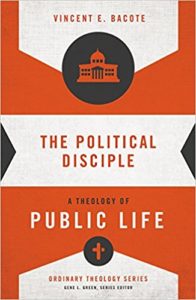 More simple but helpful is Vincent Bacote’s little The Political Disciple: A Theology of Public Life (Zondervan; $11.99) which can persuade the apathetic to care and those accommodated to either party to think a bit more about social holiness and Biblical distinctiveness so that our public witness might be more aligned with Christ’s rule and intent and less partisan. It’s part of a series of nearly pocket-sized called “Ordinary Theology” and is very useful.
More simple but helpful is Vincent Bacote’s little The Political Disciple: A Theology of Public Life (Zondervan; $11.99) which can persuade the apathetic to care and those accommodated to either party to think a bit more about social holiness and Biblical distinctiveness so that our public witness might be more aligned with Christ’s rule and intent and less partisan. It’s part of a series of nearly pocket-sized called “Ordinary Theology” and is very useful.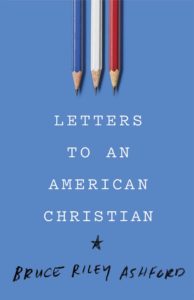 I’m a fan of Bruce Ashford’s small and often delightful Letter to an American Christian (B&H Books; $16.99.) He is a Senior Fellow in Public Theology at the Kirby Laing Institute for Christian Ethics (Cambridge, U.K.) and a Research Fellow at the Ethics and Religious Liberty Commission. He is the co-author of One Nation Under God: A Christian Hope for American Politics, author of Every Square Inch: An Introduction to Cultural Engagement for Christians so he has been bringing his wholistic, if a bit conservative, Christian worldview to bear on public issues for a while, now. This one is especially fun as it is written as a kindly, pastoral letter to a young person who has recently become a Christian but is perplexed about the relationship of faith and public life here in the USA.
I’m a fan of Bruce Ashford’s small and often delightful Letter to an American Christian (B&H Books; $16.99.) He is a Senior Fellow in Public Theology at the Kirby Laing Institute for Christian Ethics (Cambridge, U.K.) and a Research Fellow at the Ethics and Religious Liberty Commission. He is the co-author of One Nation Under God: A Christian Hope for American Politics, author of Every Square Inch: An Introduction to Cultural Engagement for Christians so he has been bringing his wholistic, if a bit conservative, Christian worldview to bear on public issues for a while, now. This one is especially fun as it is written as a kindly, pastoral letter to a young person who has recently become a Christian but is perplexed about the relationship of faith and public life here in the USA.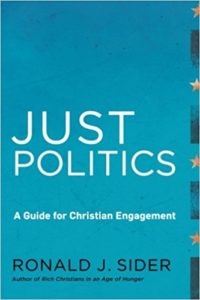 One of the books I think is the very best on all this is Ronald Sider’s meticulous Just Politics: A Guide for Christian Engagement (Brazos Press; $24.00.) It offers a complex template for developing a Biblical worldview, a Christian social theory, a faithful view of political foundations, a batch of policy goals, and then a guide for thinking about detailed issues, policies and advocacy, with due Biblical diligence, theological sophistication, social savvy about realities on the ground. And, always, a good bit of humility since good citizens, even good Christian citizens who have done “all of the above” in getting their ducks in row, can still disagree. Many will disagree with Ron’s conclusions about the Biblical material or the social science data, but no one should criticize his intention to be coherently Christian and informed by good faith, good thinking, and good care for the betterment of society.
One of the books I think is the very best on all this is Ronald Sider’s meticulous Just Politics: A Guide for Christian Engagement (Brazos Press; $24.00.) It offers a complex template for developing a Biblical worldview, a Christian social theory, a faithful view of political foundations, a batch of policy goals, and then a guide for thinking about detailed issues, policies and advocacy, with due Biblical diligence, theological sophistication, social savvy about realities on the ground. And, always, a good bit of humility since good citizens, even good Christian citizens who have done “all of the above” in getting their ducks in row, can still disagree. Many will disagree with Ron’s conclusions about the Biblical material or the social science data, but no one should criticize his intention to be coherently Christian and informed by good faith, good thinking, and good care for the betterment of society.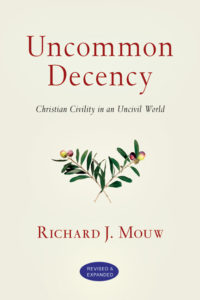 Richard Mouw’s Uncommon Decency: Christian Civility in an Uncivil World (IVP; $18.00) remains the gold standard for me, and I very, very highly recommend his fabulous, small, inspiring book. I know I am not alone in declaring how much I like this book. I’ve written about it in greater detail HERE and would be delighted if you read my review and ordered a bunch. Maybe you could suggest it now as an adult Sunday school class or small group book study for this fall. It’s the best to choose, I think, for a Christian study class or faith formation group or adult ed forum and I explain why in that older BookNotes column.
Richard Mouw’s Uncommon Decency: Christian Civility in an Uncivil World (IVP; $18.00) remains the gold standard for me, and I very, very highly recommend his fabulous, small, inspiring book. I know I am not alone in declaring how much I like this book. I’ve written about it in greater detail HERE and would be delighted if you read my review and ordered a bunch. Maybe you could suggest it now as an adult Sunday school class or small group book study for this fall. It’s the best to choose, I think, for a Christian study class or faith formation group or adult ed forum and I explain why in that older BookNotes column.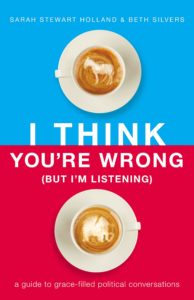 I Think You’re Wrong (But I’m Listening): A Guide to Grace-Filled Political Conversations Sarah Stewart Holland & Beth Silvers (Nelson) $24.99 This is a delightful book, a lovely study that came out of the friendship of these two politically engaged moms with tons of grass-roots civic experience. They know their stuff, have significant disagreements, and have fun talking about them. They famously co-host the
I Think You’re Wrong (But I’m Listening): A Guide to Grace-Filled Political Conversations Sarah Stewart Holland & Beth Silvers (Nelson) $24.99 This is a delightful book, a lovely study that came out of the friendship of these two politically engaged moms with tons of grass-roots civic experience. They know their stuff, have significant disagreements, and have fun talking about them. They famously co-host the 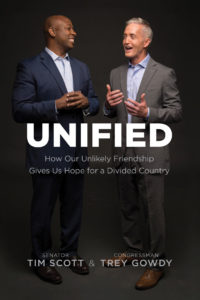 Unified: How Our Unlikely Friendship Gives Us Hope for a Divided Country Senator Tim Scott & Congressman Trey Gowdy (Tyndale) $16.99 What a great little book this is! It is easy to read, co-written by two elected officials – one black, one white, both Republicans — and they are, almost surprisingly in the current climate on Capitol Hill, good friends. This describes how their relationship has allowed them, compelled them, to take each other’s life experiences and views more seriously and with greater good will. For those that long for a story that gives us a glimpse of how to find harmony within diversity, this is a great read.
Unified: How Our Unlikely Friendship Gives Us Hope for a Divided Country Senator Tim Scott & Congressman Trey Gowdy (Tyndale) $16.99 What a great little book this is! It is easy to read, co-written by two elected officials – one black, one white, both Republicans — and they are, almost surprisingly in the current climate on Capitol Hill, good friends. This describes how their relationship has allowed them, compelled them, to take each other’s life experiences and views more seriously and with greater good will. For those that long for a story that gives us a glimpse of how to find harmony within diversity, this is a great read.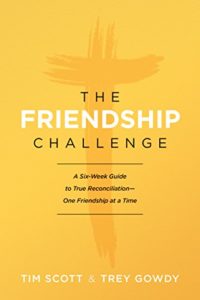 There is a nice companion booklet to Unified called The Friendship Challenge: A Six Week Guide to True Reconciliation – One Friendship at a Time (Tyndale; $12.99) which enables you to work for greater unity in your own community. Grab some friends and work through this together.
There is a nice companion booklet to Unified called The Friendship Challenge: A Six Week Guide to True Reconciliation – One Friendship at a Time (Tyndale; $12.99) which enables you to work for greater unity in your own community. Grab some friends and work through this together. 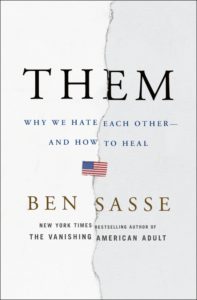 Them: Why We Hate Each Other – And How to Heal Ben Sasse (St. Martin’s Press) $28.99 I hope you know the fabulous books by Senator Ben Sasse. Agree or not with his principled, mid-Western conservatism (and his rather incongruous voting history) his books are fantastic to read. He is a thoughtful, well-spoken, multi-faceted civic leader, less concerned, it seems, about politics as such and more about cultural renewal and civil society. His book The Vanishing American Adult: Our Coming-Of-Age Crisis–And How to Rebuild a Culture of Self-Reliance (St. Martin’s Press; now out in paperback for $17.99) was about problems with the rising generation, or, I might say, with how older Americans have raised and perhaps coddled Gen Z. He invites self-sufficiency, wide reading, consideration of things that matter, local loyalties, family ties, and the like. It’s smart and not condescending.
Them: Why We Hate Each Other – And How to Heal Ben Sasse (St. Martin’s Press) $28.99 I hope you know the fabulous books by Senator Ben Sasse. Agree or not with his principled, mid-Western conservatism (and his rather incongruous voting history) his books are fantastic to read. He is a thoughtful, well-spoken, multi-faceted civic leader, less concerned, it seems, about politics as such and more about cultural renewal and civil society. His book The Vanishing American Adult: Our Coming-Of-Age Crisis–And How to Rebuild a Culture of Self-Reliance (St. Martin’s Press; now out in paperback for $17.99) was about problems with the rising generation, or, I might say, with how older Americans have raised and perhaps coddled Gen Z. He invites self-sufficiency, wide reading, consideration of things that matter, local loyalties, family ties, and the like. It’s smart and not condescending.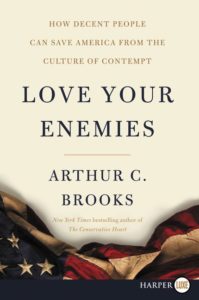 Love Your Enemies: How Decent People Can Save America From the Culture of Contempt Arthur Brooks (Broadside Books) $27.99 Wow, this subtitle alone should capture your attention and inspire you to want to start a book group, right? I have heard Mr. Brooks (no relation to David, by the way) and know him to be kind and eloquent and thoughtful. The New York Times recently reviewed this in their Book Review section which indicates its seriousness and its importance. With great endorsements by Simon Sinek and Ben Sasse, cofounder of AOL Steve Case, and important and eloquent Roman Catholic author, Bishop Robert Barron, you might realize that this will appeal to readers from across the political and religious and cultural spectrum. When he warns us not to “weaponize” the values of others that we disagree with, but to treat them with understanding and respect, he’s speaking boldly and wisely. When he says we have more in common than we realize, he’s surely correct and, as you might guess, I love hearing that good news about common ground and such. (Alas, he seems to almost under-play our most serious differences, though. In fact, some of really don’t have much in common. I appreciate the line from Os Guinness who years ago spoke of learning to live “with our deepest differences.”) Kindness and grace are hugely and urgently needed, but I wished for a bit about the structures and principles of pluralism and how we can actually honor serious diversity and what may seem like impassable conflict.
Love Your Enemies: How Decent People Can Save America From the Culture of Contempt Arthur Brooks (Broadside Books) $27.99 Wow, this subtitle alone should capture your attention and inspire you to want to start a book group, right? I have heard Mr. Brooks (no relation to David, by the way) and know him to be kind and eloquent and thoughtful. The New York Times recently reviewed this in their Book Review section which indicates its seriousness and its importance. With great endorsements by Simon Sinek and Ben Sasse, cofounder of AOL Steve Case, and important and eloquent Roman Catholic author, Bishop Robert Barron, you might realize that this will appeal to readers from across the political and religious and cultural spectrum. When he warns us not to “weaponize” the values of others that we disagree with, but to treat them with understanding and respect, he’s speaking boldly and wisely. When he says we have more in common than we realize, he’s surely correct and, as you might guess, I love hearing that good news about common ground and such. (Alas, he seems to almost under-play our most serious differences, though. In fact, some of really don’t have much in common. I appreciate the line from Os Guinness who years ago spoke of learning to live “with our deepest differences.”) Kindness and grace are hugely and urgently needed, but I wished for a bit about the structures and principles of pluralism and how we can actually honor serious diversity and what may seem like impassable conflict.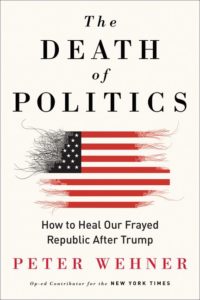 The Death of Politics: How to Heal Our Frayed Republic After Trump Peter Wehner (HarperCollins) $25.99 This book is powerful, unrelenting, nuanced, very well-written, even elegant, and mostly right, I think. Peter Wehner worked in the Reagan White House, served President Bush, and is one of those who, we might say, helped craft the ‘80s itineration of the religious right, at least the more intellectually sound corners of that movement. Almost a decade ago he co-wrote a book with the “compassionate conservative” Michael Gerson, Wheaton grad, Bush speechwriter, now an anti-Trump, Republican Washington Post columnist. That short book which of course we continue to stock was called City of Man: Religion and Politics in a New Era (Moody Press; $19.99) and was wise, balanced, reasonable. Mr. Wehner works at the brainy, principled, conservative, think-tank The Ethics and Public Policy Center, has written for The Atlantic and is a contributing editor to the The New York Times. I say all this to add weight to this incisive study of our current context and our dysfunctional discourse and bad views of government, politics and the use of power, so that you will take seriously his lament and diagnosis, his urgent call for reform and, at least, dignified civility.
The Death of Politics: How to Heal Our Frayed Republic After Trump Peter Wehner (HarperCollins) $25.99 This book is powerful, unrelenting, nuanced, very well-written, even elegant, and mostly right, I think. Peter Wehner worked in the Reagan White House, served President Bush, and is one of those who, we might say, helped craft the ‘80s itineration of the religious right, at least the more intellectually sound corners of that movement. Almost a decade ago he co-wrote a book with the “compassionate conservative” Michael Gerson, Wheaton grad, Bush speechwriter, now an anti-Trump, Republican Washington Post columnist. That short book which of course we continue to stock was called City of Man: Religion and Politics in a New Era (Moody Press; $19.99) and was wise, balanced, reasonable. Mr. Wehner works at the brainy, principled, conservative, think-tank The Ethics and Public Policy Center, has written for The Atlantic and is a contributing editor to the The New York Times. I say all this to add weight to this incisive study of our current context and our dysfunctional discourse and bad views of government, politics and the use of power, so that you will take seriously his lament and diagnosis, his urgent call for reform and, at least, dignified civility.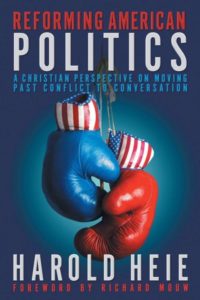 Reforming American Politics: A Christian Perspective on Moving Past Conflict to Conversation Harold Heie (Read the Spirit) $24.99
Reforming American Politics: A Christian Perspective on Moving Past Conflict to Conversation Harold Heie (Read the Spirit) $24.99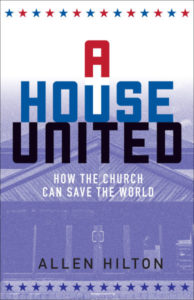 A House United: How the Church Can Save the World Allen Hilton (Fortress) $16.99 I reviewed this at greater length in a BookNotes last fall. I highlighted it in a column I did for the Center for Public Justice, in fact. Even though it isn’t brand new, I have to list it here. I’ll admit that at first I wasn’t so sure about the title and premise — can the church save the world? But what Hilton means is powerful and poignant, and, frankly, exceedingly practical. In a nutshell, his common sense (but explored with helpful theological substance) argument is this: we cannot help heal the culture wars in our civic spaces until we within the Body of Christ (at least!) learn to respect one another. There are huge theological and ethical differences within various denominations (and even within our own congregations.) Sometimes, we allow our worldly dispositions and partisan political loyalties to trump our affection for our brothers and sisters within the one body of Christ. There may be no more practical and urgent starting point for our efforts to heal the fallout from the cultural wars than for people of faith to love one another. (Sounds a bit like John 13, doesn’t it?)
A House United: How the Church Can Save the World Allen Hilton (Fortress) $16.99 I reviewed this at greater length in a BookNotes last fall. I highlighted it in a column I did for the Center for Public Justice, in fact. Even though it isn’t brand new, I have to list it here. I’ll admit that at first I wasn’t so sure about the title and premise — can the church save the world? But what Hilton means is powerful and poignant, and, frankly, exceedingly practical. In a nutshell, his common sense (but explored with helpful theological substance) argument is this: we cannot help heal the culture wars in our civic spaces until we within the Body of Christ (at least!) learn to respect one another. There are huge theological and ethical differences within various denominations (and even within our own congregations.) Sometimes, we allow our worldly dispositions and partisan political loyalties to trump our affection for our brothers and sisters within the one body of Christ. There may be no more practical and urgent starting point for our efforts to heal the fallout from the cultural wars than for people of faith to love one another. (Sounds a bit like John 13, doesn’t it?)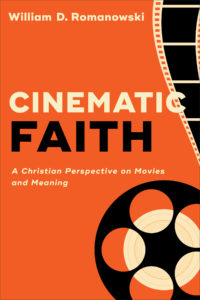 As on on-ramp to a review of William Romanowski’s important, new book Cinematic Faith: A Christian Perspective on Faith and Film
As on on-ramp to a review of William Romanowski’s important, new book Cinematic Faith: A Christian Perspective on Faith and Film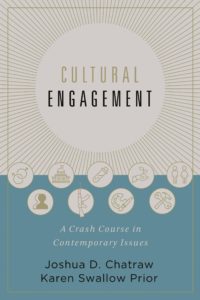 Who knows, maybe the new one coming in early July edited by our lit prof friend Karen Swallow Prior (along with Anglican theologian and director of New City Fellows in Raleigh, Joshua D. Chatraw) will help. It’s called Cultural Engagement: A Crash Course in Contemporary Issues (Zondervan Academic; $29.99) and should at least inspire those with a broad worldview who are willing to have these (mostly, but not exclusively) moderate to conservative scholars stimulate their thinking. I’m glad for the relative diversity of authors and views. With dozens of topics (work, the arts, creation care, immigration and race, reproductive technologies, war, gender, and more) and very thoughtful contributors such as Katelyn Beaty, Vincent Bacote, Robert George, Ellen Painter Dollar, Joel Salatin, W. David O. Taylor, Michael Wear, Tish Harrison Warren, Mako Fujimura, this is going to be a very helpful handbook. Who puts Matthew Vines and Rosaria Butterfield together? Rod Dreher and Andy Crouch? This book is loaded with fascinating ideas, good stuff to struggle with. You can PRE-ORDER this now if you’d like at our BookNotes 20% OFF. Just use the secure order form page at our website by clicking on the link at the bottom of the column.
Who knows, maybe the new one coming in early July edited by our lit prof friend Karen Swallow Prior (along with Anglican theologian and director of New City Fellows in Raleigh, Joshua D. Chatraw) will help. It’s called Cultural Engagement: A Crash Course in Contemporary Issues (Zondervan Academic; $29.99) and should at least inspire those with a broad worldview who are willing to have these (mostly, but not exclusively) moderate to conservative scholars stimulate their thinking. I’m glad for the relative diversity of authors and views. With dozens of topics (work, the arts, creation care, immigration and race, reproductive technologies, war, gender, and more) and very thoughtful contributors such as Katelyn Beaty, Vincent Bacote, Robert George, Ellen Painter Dollar, Joel Salatin, W. David O. Taylor, Michael Wear, Tish Harrison Warren, Mako Fujimura, this is going to be a very helpful handbook. Who puts Matthew Vines and Rosaria Butterfield together? Rod Dreher and Andy Crouch? This book is loaded with fascinating ideas, good stuff to struggle with. You can PRE-ORDER this now if you’d like at our BookNotes 20% OFF. Just use the secure order form page at our website by clicking on the link at the bottom of the column.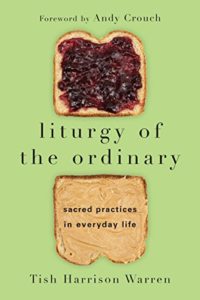 Or maybe we just need to remind folks of some of our recent favorites like Tish Warren’s amazing Liturgy of the Ordinary: Sacred Practices in Everyday Life (IVP; $16.00) that shows how our worship practices in church can equip us to find God in the sacredness of the ordinary, hour by hour throughout the day. This truly has been one of my favorite books in recent years and it wonderfully shows how we can practice the presence of God in the mundane moments of ordinary living. If you haven’t read it yet, you really should — we love it!
Or maybe we just need to remind folks of some of our recent favorites like Tish Warren’s amazing Liturgy of the Ordinary: Sacred Practices in Everyday Life (IVP; $16.00) that shows how our worship practices in church can equip us to find God in the sacredness of the ordinary, hour by hour throughout the day. This truly has been one of my favorite books in recent years and it wonderfully shows how we can practice the presence of God in the mundane moments of ordinary living. If you haven’t read it yet, you really should — we love it!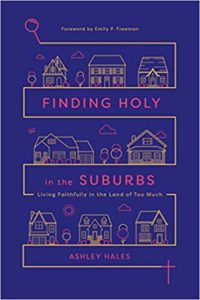 Or, somewhat similarly, we might re-recommend the excellently written and astute little book by Ashley Hales called Finding Holy in the Suburbs: Living Faithfully in the Land of Too Much (IVP; $16.00) that explores the concrete (and sometimes tempting) social realities of suburban living in light of gospel values. That is, how do we embody faith in the day to day, finding God’s presence and living Christ-like lives in those sorts of settings of yards and cul-de-sacs and commutes and status and busy, fast-paced lives? Does God show up in your sub-division? Can we think Christianly and live faithfully in the development by the mall?
Or, somewhat similarly, we might re-recommend the excellently written and astute little book by Ashley Hales called Finding Holy in the Suburbs: Living Faithfully in the Land of Too Much (IVP; $16.00) that explores the concrete (and sometimes tempting) social realities of suburban living in light of gospel values. That is, how do we embody faith in the day to day, finding God’s presence and living Christ-like lives in those sorts of settings of yards and cul-de-sacs and commutes and status and busy, fast-paced lives? Does God show up in your sub-division? Can we think Christianly and live faithfully in the development by the mall?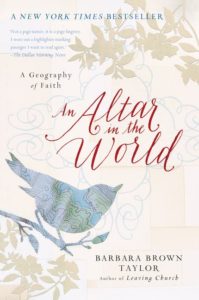 These books push us to incarnate, embody, live out, the gospel in ways that are not abstract or “spiritual” in some lofty sense. They help us do what Barbara Brown Taylor evokes in her beautifully written memoir An Altar in the World: A Geography of Faith (HarperOne; $15.99) about finding holiness in the down to Earth. You know I’ve said often how much I value this good book.
These books push us to incarnate, embody, live out, the gospel in ways that are not abstract or “spiritual” in some lofty sense. They help us do what Barbara Brown Taylor evokes in her beautifully written memoir An Altar in the World: A Geography of Faith (HarperOne; $15.99) about finding holiness in the down to Earth. You know I’ve said often how much I value this good book.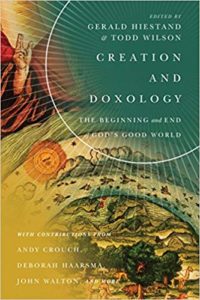 All of which reminds me of a book I recently started, the remarkable, energetic, scholarly papers of a conference called Creation and Doxology: The Beginning and End of God’s Good World edited by Gerald Hiestand & Todd Wilson (IVP Academic; $25.00.) Co-published by the Center for Pastoral Theologians, it includes gloriously stimulating pieces by Andy Crouch and Deborah Haarsma and John Walton and Kristen Johnston and many others on everything from medicine and technology to the insights of Wendell Berry to the role of a robust doctrine of creation in the history of science to the hope for restoration of a renewed cosmos to the significance of beauty in theology. This has much intellectual rigor and has much to do with providing a Biblical resource for scientists, it seems.
All of which reminds me of a book I recently started, the remarkable, energetic, scholarly papers of a conference called Creation and Doxology: The Beginning and End of God’s Good World edited by Gerald Hiestand & Todd Wilson (IVP Academic; $25.00.) Co-published by the Center for Pastoral Theologians, it includes gloriously stimulating pieces by Andy Crouch and Deborah Haarsma and John Walton and Kristen Johnston and many others on everything from medicine and technology to the insights of Wendell Berry to the role of a robust doctrine of creation in the history of science to the hope for restoration of a renewed cosmos to the significance of beauty in theology. This has much intellectual rigor and has much to do with providing a Biblical resource for scientists, it seems.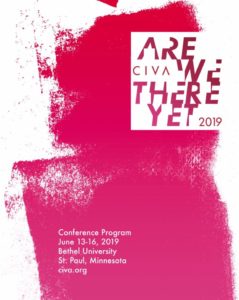 Last week we had the great privilege of sending some books to the remarkable bi-annual conference of
Last week we had the great privilege of sending some books to the remarkable bi-annual conference of 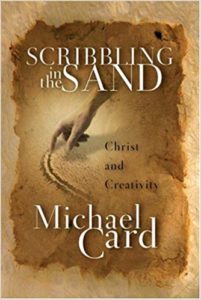 Scribbling in the Sand: Christ and Creativity Michael Card (IVP) $18.00 This is a truly fantastic read, both as a Biblical study and a set of wise musings, a lovely look at creativity and the life of Jesus. Some of Mike Card’s own story as a thoughtful songwriter is included, so those who like his good music will especially enjoy this. There is a great appendix, too, offering several short “Letters to a Young Artist” (by the likes of Mako Fujimura, Calvin Seerveld and others) that are themselves worth the price of the book. Very nicely done. In fact, it is much more than “nice” — Publisher’s Weekly called it “stunning” and writer Larry Crabb says, “This book touched my heart as few others.” Yes!
Scribbling in the Sand: Christ and Creativity Michael Card (IVP) $18.00 This is a truly fantastic read, both as a Biblical study and a set of wise musings, a lovely look at creativity and the life of Jesus. Some of Mike Card’s own story as a thoughtful songwriter is included, so those who like his good music will especially enjoy this. There is a great appendix, too, offering several short “Letters to a Young Artist” (by the likes of Mako Fujimura, Calvin Seerveld and others) that are themselves worth the price of the book. Very nicely done. In fact, it is much more than “nice” — Publisher’s Weekly called it “stunning” and writer Larry Crabb says, “This book touched my heart as few others.” Yes!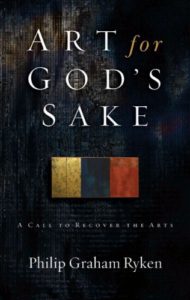 Art for God’s Sake: A Call to Recover the Arts Philip Ryken (Presbyterian & Reformed) $6.99 One of the most brief but potent little arguments for the idea of Christian art rooted in a Christian world-and-life-vision. As Hans Rookmaaker used to say, “art needs no justification” and this makes that clear for anyone with doubts, or how God is pleased by our interested in the arts. We don’t want to fall into an idolatrous and unhelpful “art for art’s sake” approach, but we surely don’t want an “art for the sake of a message” approach, either. This is a nice way to begin and the argument is concise and lovely. Give this to any seriously Christian high school or young college student who loves the arts or anyone wanting a succinct starting point.
Art for God’s Sake: A Call to Recover the Arts Philip Ryken (Presbyterian & Reformed) $6.99 One of the most brief but potent little arguments for the idea of Christian art rooted in a Christian world-and-life-vision. As Hans Rookmaaker used to say, “art needs no justification” and this makes that clear for anyone with doubts, or how God is pleased by our interested in the arts. We don’t want to fall into an idolatrous and unhelpful “art for art’s sake” approach, but we surely don’t want an “art for the sake of a message” approach, either. This is a nice way to begin and the argument is concise and lovely. Give this to any seriously Christian high school or young college student who loves the arts or anyone wanting a succinct starting point.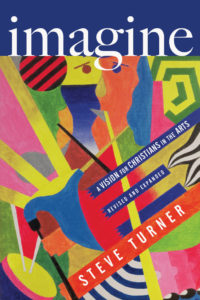 Imagine: A Vision for Christians in the Arts Steve Turner (IVP) $18.00 Turner is one of the best rock critics in the world; he was the authorized biographer of Johnny Cash, and has done other serious rock bios (Marvin Gaye, Van Morrison, and several important works on the Beatles.) His new (and lots of fun) Turn, Turn, Turn: Popular Songs Inspired by the Bible (Worthy; $24.99) shows how the Bible has influenced popular music (from the 50s through nearly contemporary times) and is so very, very interesting. Imagine (now out in a recently updated, 2nd edition) is an accessible, insightful book making a case an “in the world but not of” engagement with culture and the arts, offering a fine foundation for anyone doing creative work out of a Christian orientation. Imagine is especially good for those involved in the world of popular culture, film or the contemporary music scene, since that’s his specialty, but it’s a good book about being faithfully open to common grace in the art world for nearly anyone. Great reading, especially for those who perhaps feel like maybe this isn’t that important or right.
Imagine: A Vision for Christians in the Arts Steve Turner (IVP) $18.00 Turner is one of the best rock critics in the world; he was the authorized biographer of Johnny Cash, and has done other serious rock bios (Marvin Gaye, Van Morrison, and several important works on the Beatles.) His new (and lots of fun) Turn, Turn, Turn: Popular Songs Inspired by the Bible (Worthy; $24.99) shows how the Bible has influenced popular music (from the 50s through nearly contemporary times) and is so very, very interesting. Imagine (now out in a recently updated, 2nd edition) is an accessible, insightful book making a case an “in the world but not of” engagement with culture and the arts, offering a fine foundation for anyone doing creative work out of a Christian orientation. Imagine is especially good for those involved in the world of popular culture, film or the contemporary music scene, since that’s his specialty, but it’s a good book about being faithfully open to common grace in the art world for nearly anyone. Great reading, especially for those who perhaps feel like maybe this isn’t that important or right.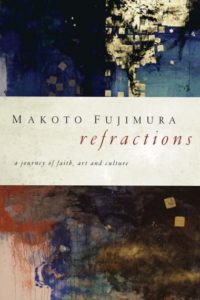 Refractions: A Journey of Faith, Art, and Culture Makoto Fujimura (NavPress) $24.99 Mako Fujimura was just becoming known as an evangelical thought leader, doing impressive abstract art in lower Manhattan when he started writing these ruminations on art and culture. Some of these essays and prayers emerged from his important work post-9-11 when he helped show how the arts can help citizens and neighbors lament and grief and recover from the awful attack. Handsomely designed on good paper, this is a humane, beautiful book to cherish. Makes a great gift and is a great example of a handsome and thoughtful Christian book for those who may not be inclined to read something more directly religious. We often recommend this as one of the first to read in this topic, and you will not be disappointed. Very nicely done.
Refractions: A Journey of Faith, Art, and Culture Makoto Fujimura (NavPress) $24.99 Mako Fujimura was just becoming known as an evangelical thought leader, doing impressive abstract art in lower Manhattan when he started writing these ruminations on art and culture. Some of these essays and prayers emerged from his important work post-9-11 when he helped show how the arts can help citizens and neighbors lament and grief and recover from the awful attack. Handsomely designed on good paper, this is a humane, beautiful book to cherish. Makes a great gift and is a great example of a handsome and thoughtful Christian book for those who may not be inclined to read something more directly religious. We often recommend this as one of the first to read in this topic, and you will not be disappointed. Very nicely done. Culture Care: Reconnecting with Beauty for Our Common Life Makoto Fujimura (IVP) $18.00 This potent little volume, a more recent one by Mako, is about the common good, our responsibilities for caring for our culture, and the particular ways in which we can be cultural stewards by feeding our culture’s soul with “beauty, creativity, and generosity.” Good for “creative catalysts” who desire a renewal of culture that yields human flourishing. Why not join with some others in your church or fellowship and read this together and see what comes of it. Excellent. By the way, don’t miss his reflection of beauty and cultural healing as it comes up against sorrow, suffering, and injustice in his splendid, thoughtful study of a transforming book in his life, the famous Silence by Japanese novelist Shusaku Endo. Mako’s study, in a very handsome hardback, is called Silence and Beauty: Hidden Faith Born of Suffering (IVP; $26.00.) There’s an excellent, extensive introduction by Philip Yancey.
Culture Care: Reconnecting with Beauty for Our Common Life Makoto Fujimura (IVP) $18.00 This potent little volume, a more recent one by Mako, is about the common good, our responsibilities for caring for our culture, and the particular ways in which we can be cultural stewards by feeding our culture’s soul with “beauty, creativity, and generosity.” Good for “creative catalysts” who desire a renewal of culture that yields human flourishing. Why not join with some others in your church or fellowship and read this together and see what comes of it. Excellent. By the way, don’t miss his reflection of beauty and cultural healing as it comes up against sorrow, suffering, and injustice in his splendid, thoughtful study of a transforming book in his life, the famous Silence by Japanese novelist Shusaku Endo. Mako’s study, in a very handsome hardback, is called Silence and Beauty: Hidden Faith Born of Suffering (IVP; $26.00.) There’s an excellent, extensive introduction by Philip Yancey.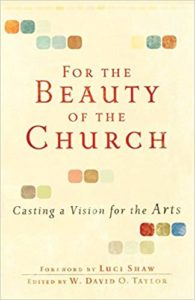 For the Beauty of the Church: Casting a Vision for the Arts edited by W. David O. Taylor (Baker) $18.00 This is another one of those books that nearly anyone should read and from which nearly everyone would benefit. What a great collection, interesting and upbeat with a variety of contemporary scholars, pastors, critics, patrons, and artists, from Luci Shaw, Andy Crouch, Eugene Peterson, Barbara Nicolosi, Lauren Winner, Jeremy Begbie and Joshua Banner. This really is an excellent collection, particularly useful for local church study. These chapters emerged from a conference at a church, so isn’t only for artists, but for anyone who cares about how the church can affirm and appreciate the arts and artists.
For the Beauty of the Church: Casting a Vision for the Arts edited by W. David O. Taylor (Baker) $18.00 This is another one of those books that nearly anyone should read and from which nearly everyone would benefit. What a great collection, interesting and upbeat with a variety of contemporary scholars, pastors, critics, patrons, and artists, from Luci Shaw, Andy Crouch, Eugene Peterson, Barbara Nicolosi, Lauren Winner, Jeremy Begbie and Joshua Banner. This really is an excellent collection, particularly useful for local church study. These chapters emerged from a conference at a church, so isn’t only for artists, but for anyone who cares about how the church can affirm and appreciate the arts and artists. Echoes of Eden: Reflections on Christianity, Literature, and the Arts Jerram Barrs (Crossway) $18.99 We have an extensive selection of books – at various scholarly levels – of books mostly about literature, so wanted to name at least one. That this also is good for any sorts of creative workers or anyone interested in a faithfully Christian insight about the arts makes this one great for nearly anyone. Barrs is a beloved professor at Covenant Theological Seminary and we stock all of his books, from Being Human (which properly frets about Gnostic influences in some contemplative spirituality) to excellent books on prayer and evangelism, Barrs is really solid. Our dear and trusted friend Denis Haack of Ransom Fellowship has a very nice blurb on the back of this, as does the always-discerning William Edgar. Timothy Keller says it is “the most accessible, readably, and yet theologically robust work on Christianity and the arts that you will be able to find.”
Echoes of Eden: Reflections on Christianity, Literature, and the Arts Jerram Barrs (Crossway) $18.99 We have an extensive selection of books – at various scholarly levels – of books mostly about literature, so wanted to name at least one. That this also is good for any sorts of creative workers or anyone interested in a faithfully Christian insight about the arts makes this one great for nearly anyone. Barrs is a beloved professor at Covenant Theological Seminary and we stock all of his books, from Being Human (which properly frets about Gnostic influences in some contemplative spirituality) to excellent books on prayer and evangelism, Barrs is really solid. Our dear and trusted friend Denis Haack of Ransom Fellowship has a very nice blurb on the back of this, as does the always-discerning William Edgar. Timothy Keller says it is “the most accessible, readably, and yet theologically robust work on Christianity and the arts that you will be able to find.”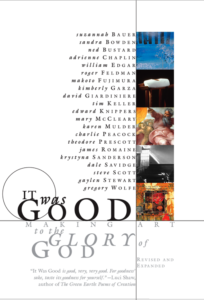 It Was Good: Making Art to the Glory of God edited by Ned Bustard (Square Halo Books) $24.99 I love this book and very, very highly recommend it. When a very handsome revision of this classic was released a decade ago, I wrote this:
It Was Good: Making Art to the Glory of God edited by Ned Bustard (Square Halo Books) $24.99 I love this book and very, very highly recommend it. When a very handsome revision of this classic was released a decade ago, I wrote this: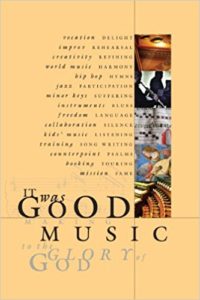 It Was Good: Making Music to the Glory of God edited by Ned Bustard (Square Halo Books) $19.99 Okay, this was the sequel to the wonderful It Was Good: Making Art… and I invite you to
It Was Good: Making Music to the Glory of God edited by Ned Bustard (Square Halo Books) $19.99 Okay, this was the sequel to the wonderful It Was Good: Making Art… and I invite you to 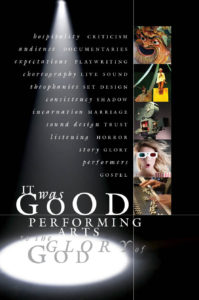 It Was Good: Performing Arts to the Glory of God edited by Ned Bustard (Square Halo Books) $19.99 Ahhh, this is the third in this splendid set of thoughtful books that explore the cutting edge of that line between theory and practice, between significant (but not dense) aesthetics and good ideas and the practical matters that artists face. This one is exceptional in part because it is just about the only book like it that offers good guidance and inspiring reflections about the craft of being a performing artist. For dancers, actors, folks on the road, people managing theaters and doing choreography or filmmaking and the like. What a book!
It Was Good: Performing Arts to the Glory of God edited by Ned Bustard (Square Halo Books) $19.99 Ahhh, this is the third in this splendid set of thoughtful books that explore the cutting edge of that line between theory and practice, between significant (but not dense) aesthetics and good ideas and the practical matters that artists face. This one is exceptional in part because it is just about the only book like it that offers good guidance and inspiring reflections about the craft of being a performing artist. For dancers, actors, folks on the road, people managing theaters and doing choreography or filmmaking and the like. What a book! 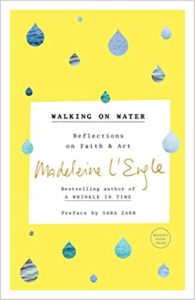 Walking on Water: Reflections on Faith and Art Madeline L’Engle (Convergent) $15.00 Recently released with a new cover design and compelling forward (by YA novelist Sara Zarr), this little classic is one of the most-often mentioned and certainly cherished books among those who care about this topic since its release in 1980. Sublime. Interesting. A must-have book for anyone involved in writing or the arts. It may be surprising to some how deeply knowledgeable she is about the contemplative tradition, about the Orthodox, about others upon whose shoulders we stand in our understanding of faith, life, the arts, and the creative process. Certainly of interest to arts, but a good, provocative read for nearly anyone.
Walking on Water: Reflections on Faith and Art Madeline L’Engle (Convergent) $15.00 Recently released with a new cover design and compelling forward (by YA novelist Sara Zarr), this little classic is one of the most-often mentioned and certainly cherished books among those who care about this topic since its release in 1980. Sublime. Interesting. A must-have book for anyone involved in writing or the arts. It may be surprising to some how deeply knowledgeable she is about the contemplative tradition, about the Orthodox, about others upon whose shoulders we stand in our understanding of faith, life, the arts, and the creative process. Certainly of interest to arts, but a good, provocative read for nearly anyone.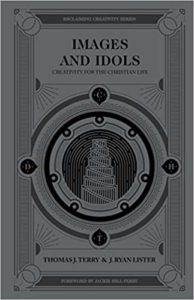 Images and Idols: Creativity for the Christian Life Thomas J. Terry & J. Ryan Lister, with foreword by Jackie Hill Perry (Moody Press) $14.99 Just the look and feel of this hardback volume sets it apart – it is sturdy, black and white, textured, sans dust jacket. The authors are leaders of humble beast, an underground hip hop music label out of Portland that does important, gospel-centered rap and other hip hop records and concerts. They are not only way cool and authentically down with that scene, but they are wanting to forge a community of artists who are rooted in the gospel and thoughtful about aesthetics, the arts, cultural engagement, social renewal, and the like. For those who have followed the deepening worldview of performing artists like Lecrae or Prop or Sho Baraka or others in those circles, Humble Beast is highly, highly regarded. And so, this first volume in what may become a series of studies is insisting, “God is reclaiming creativity for His glory and our good.” Yep, it’s hip hop meets Jonathan Edwards, or so it nearly seems with Terry & Lister dropping names like Dorothy Sayers and Dostoevsky, Abraham Kuyper and Flannery O’Connor, this study is foundational and wonderfully realized. There are some pretty cool touches to the book too, with some light notations and illustrative graphics and reverse printing on full color pages. Kudos!!
Images and Idols: Creativity for the Christian Life Thomas J. Terry & J. Ryan Lister, with foreword by Jackie Hill Perry (Moody Press) $14.99 Just the look and feel of this hardback volume sets it apart – it is sturdy, black and white, textured, sans dust jacket. The authors are leaders of humble beast, an underground hip hop music label out of Portland that does important, gospel-centered rap and other hip hop records and concerts. They are not only way cool and authentically down with that scene, but they are wanting to forge a community of artists who are rooted in the gospel and thoughtful about aesthetics, the arts, cultural engagement, social renewal, and the like. For those who have followed the deepening worldview of performing artists like Lecrae or Prop or Sho Baraka or others in those circles, Humble Beast is highly, highly regarded. And so, this first volume in what may become a series of studies is insisting, “God is reclaiming creativity for His glory and our good.” Yep, it’s hip hop meets Jonathan Edwards, or so it nearly seems with Terry & Lister dropping names like Dorothy Sayers and Dostoevsky, Abraham Kuyper and Flannery O’Connor, this study is foundational and wonderfully realized. There are some pretty cool touches to the book too, with some light notations and illustrative graphics and reverse printing on full color pages. Kudos!!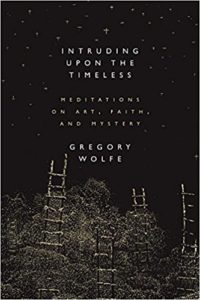 Intruding Upon the Timeless: Meditations on Art, Faith, and Mystery (Revised and Expanded, 2nd edition) Gregory Wolfe (Square Halo Books) $22.99 I adored the first small volume of this that had the minimalist markings of the great Barry Moser illustrating the essays by famous Image Journals editor Greg Wolfe. In this second edition there are many more essays and much more artwork illuminating this wonderful anthology of some of Greg’s best short form essays that appeared in Image from the days it was so masterfully developed under his watchful eye. I love these short pieces on all manner of artful observations, about poetry and paints and movies and rock critics and dance and visual artists. Greg, an evangelical who became Roman Catholic years ago, has this wide vision and learned view and a winsome ability to tell a good story in a short essay. Intruding Upon the Timeless is a great introduction to a major voice in the faith and art movement in the last decades and will appeal to many sorts of readers.
Intruding Upon the Timeless: Meditations on Art, Faith, and Mystery (Revised and Expanded, 2nd edition) Gregory Wolfe (Square Halo Books) $22.99 I adored the first small volume of this that had the minimalist markings of the great Barry Moser illustrating the essays by famous Image Journals editor Greg Wolfe. In this second edition there are many more essays and much more artwork illuminating this wonderful anthology of some of Greg’s best short form essays that appeared in Image from the days it was so masterfully developed under his watchful eye. I love these short pieces on all manner of artful observations, about poetry and paints and movies and rock critics and dance and visual artists. Greg, an evangelical who became Roman Catholic years ago, has this wide vision and learned view and a winsome ability to tell a good story in a short essay. Intruding Upon the Timeless is a great introduction to a major voice in the faith and art movement in the last decades and will appeal to many sorts of readers.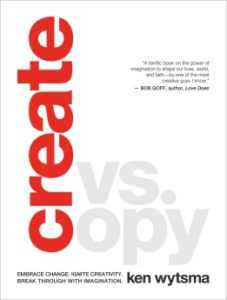 Create vs. Copy: Embrace Change. Ignite Creativity. Break Through with Imagination. Ken Wytsma (Moody Press) $14.99 We have a lot of books like this, about creativity and the process of being inspired. I respect Ken Wytsma so much and this is great on the power of imagination. Bob Goff says he is “one of the most creative guys I know” which surely makes it well worth considering. This is good for leaders, for artists, for anyone wanting to develop their God-giving creativity. Highly recommended.
Create vs. Copy: Embrace Change. Ignite Creativity. Break Through with Imagination. Ken Wytsma (Moody Press) $14.99 We have a lot of books like this, about creativity and the process of being inspired. I respect Ken Wytsma so much and this is great on the power of imagination. Bob Goff says he is “one of the most creative guys I know” which surely makes it well worth considering. This is good for leaders, for artists, for anyone wanting to develop their God-giving creativity. Highly recommended.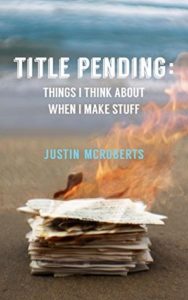 Title Pending: Things I Think About When I Make Stuff Justin McRoberts (Justin McRoberts) $9.99 I love this little book by our good friend Justin, a singer-songwriter, consultant, coach, speaker, and author with lots of social media savvy. He has worked with visual artists and collaborated in all sorts of church and mission project and know much about being a maker. This offers an outline of sorts, with lots of stories, good teaching, and upbeat prose, for exploring your own drive to create. After an opening thought on “who needs another book on creativity?” he invites us to the journey. There are sections called “Get Your Bearings”, “Map Your Territory”, “Pay Attention to the Weather”, “Course Corrections”, and “Enjoy the Journey.” Lots of ideas for good practices and some hard stuff and some fun stuff. We’re glad to stock this rare little guidebook and know it’s going to inspire somebody out there.
Title Pending: Things I Think About When I Make Stuff Justin McRoberts (Justin McRoberts) $9.99 I love this little book by our good friend Justin, a singer-songwriter, consultant, coach, speaker, and author with lots of social media savvy. He has worked with visual artists and collaborated in all sorts of church and mission project and know much about being a maker. This offers an outline of sorts, with lots of stories, good teaching, and upbeat prose, for exploring your own drive to create. After an opening thought on “who needs another book on creativity?” he invites us to the journey. There are sections called “Get Your Bearings”, “Map Your Territory”, “Pay Attention to the Weather”, “Course Corrections”, and “Enjoy the Journey.” Lots of ideas for good practices and some hard stuff and some fun stuff. We’re glad to stock this rare little guidebook and know it’s going to inspire somebody out there.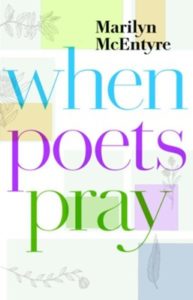 When Poets Pray Marilyn McEntyre (Eerdmans) $19.99 Granted, this is not about the visual arts, but, as a matter of fact, Marilyn McEntyre was at the CIVA event and although she was not doing a plenary session, we sold out of several of her great books – her Caring for Words in a Culture of Lies is a favorite – and this marvelous thin hardback is nearly sublime. It offers deeply spiritual ruminations on poems (many which you may know, others which you may not) and asks if these well-worded lines and phrases could actually be used as prayers. There are two dozen select “prayer-poems” to learn from and live with. As the publisher puts it,
When Poets Pray Marilyn McEntyre (Eerdmans) $19.99 Granted, this is not about the visual arts, but, as a matter of fact, Marilyn McEntyre was at the CIVA event and although she was not doing a plenary session, we sold out of several of her great books – her Caring for Words in a Culture of Lies is a favorite – and this marvelous thin hardback is nearly sublime. It offers deeply spiritual ruminations on poems (many which you may know, others which you may not) and asks if these well-worded lines and phrases could actually be used as prayers. There are two dozen select “prayer-poems” to learn from and live with. As the publisher puts it,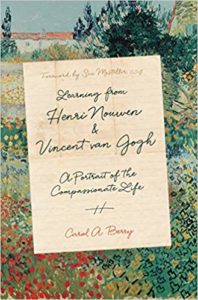 Learning from Henri Nouwen and Vincent Van Gogh: A Portrait of the Compassionate Life Carol Berry (IVP) $22.00 This brand new book is the long-awaited reflection on the course Nouwen taught (just once) at Yale on compassion, learned by and from Vincent Van Gogh. Ms. Berry audited that class and took copious notes; she was approached by the Nouwen literary estate to write this spiritual formation book that shares what she learned by spending time with Van Gogh under the guidance of Henri Nouwen (who, as we know, loved his Dutch painters, especially Van Gogh.) What a great book, wonderful for nearly anyone who appreciates the arts. Thanks to IVP for doing this fine work and including some nice full color reproductions, too.
Learning from Henri Nouwen and Vincent Van Gogh: A Portrait of the Compassionate Life Carol Berry (IVP) $22.00 This brand new book is the long-awaited reflection on the course Nouwen taught (just once) at Yale on compassion, learned by and from Vincent Van Gogh. Ms. Berry audited that class and took copious notes; she was approached by the Nouwen literary estate to write this spiritual formation book that shares what she learned by spending time with Van Gogh under the guidance of Henri Nouwen (who, as we know, loved his Dutch painters, especially Van Gogh.) What a great book, wonderful for nearly anyone who appreciates the arts. Thanks to IVP for doing this fine work and including some nice full color reproductions, too. Shades of Light: A Novel Sharon Garlough Brown (VP) $18.00 Speaking of Van Gogh, keep an eye out for a forthcoming novel by Sharon Garlough Brown coming this August called Shades of Light. This nicely told story (by the author of the popular Sensible Shoes novels about spiritual direction) while mostly about a young woman recovering from depression and anxiety (and her anguished loved ones and aunt, Kit, who is a spiritual director) includes a whole lot about Van Gogh, who the main character (named Wren) is inspired by. I was actually very deeply moved by how Wren took comfort in the pain and paintings of Van Gogh and how beautifully she could describe the famous correspondence between Vincent and his brother Theo. I also enjoyed the vivid description of this novice painter setting out to paint… uh, I can’t spoil it. You’ll have to read it yourself! You might enjoy it too, and be moved by the sorrow and regret and beauty and hope found as someone ponders great art. PRE-ORDER it at our 20% off discounted price today.
Shades of Light: A Novel Sharon Garlough Brown (VP) $18.00 Speaking of Van Gogh, keep an eye out for a forthcoming novel by Sharon Garlough Brown coming this August called Shades of Light. This nicely told story (by the author of the popular Sensible Shoes novels about spiritual direction) while mostly about a young woman recovering from depression and anxiety (and her anguished loved ones and aunt, Kit, who is a spiritual director) includes a whole lot about Van Gogh, who the main character (named Wren) is inspired by. I was actually very deeply moved by how Wren took comfort in the pain and paintings of Van Gogh and how beautifully she could describe the famous correspondence between Vincent and his brother Theo. I also enjoyed the vivid description of this novice painter setting out to paint… uh, I can’t spoil it. You’ll have to read it yourself! You might enjoy it too, and be moved by the sorrow and regret and beauty and hope found as someone ponders great art. PRE-ORDER it at our 20% off discounted price today.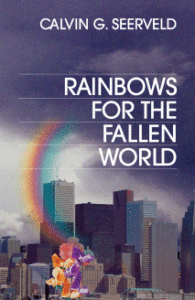 Rainbows for the Fallen World Calvin Seerveld (Toronto Tuppence Press) $35.00 Rainbows is certainly one of the most esteemed and often-cited books in the last generation of Christians thinking deeply about faith and art and culture, and certainly a very significant book (from a very significant leader) in the history of CIVA. (Its first edition was published in the 1976, and I treasure my first edition as much as any book I own. For a variety of reasons, it is a personal favorite.) In Seerveld’s many books that we stock, this flamboyant writer colorfully studies Scripture, art history, aesthetics, and cultural renewal, always reveling in the sturdy goodness of God’s creation and the call for an allusive and imaginative human response. Rainbows has a few chapters about what we might call obedient aesthetic life — that is, not stuff just for artists but for all of us. And some wonderfully rich and deeply thoughtful calls to cultural renewal, inspired by his astute reading of various paintings and arts movements. He has a heady chapter about
Rainbows for the Fallen World Calvin Seerveld (Toronto Tuppence Press) $35.00 Rainbows is certainly one of the most esteemed and often-cited books in the last generation of Christians thinking deeply about faith and art and culture, and certainly a very significant book (from a very significant leader) in the history of CIVA. (Its first edition was published in the 1976, and I treasure my first edition as much as any book I own. For a variety of reasons, it is a personal favorite.) In Seerveld’s many books that we stock, this flamboyant writer colorfully studies Scripture, art history, aesthetics, and cultural renewal, always reveling in the sturdy goodness of God’s creation and the call for an allusive and imaginative human response. Rainbows has a few chapters about what we might call obedient aesthetic life — that is, not stuff just for artists but for all of us. And some wonderfully rich and deeply thoughtful calls to cultural renewal, inspired by his astute reading of various paintings and arts movements. He has a heady chapter about 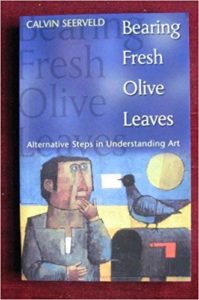 philosophical aesthetics and some inspiring talks about why we need a robustly Biblical framework for imagining the gifts artists bring to our lives. You should know his next book that was released as a follow up to Rainbows was Bearing Fresh Olive Leaves: Alternative Steps in Understanding Art (Piquant Press; $35.00) which I also adore. And then, we are proud to stock his large collection of miscellaneous and sundry works (such as Normative Aesthetics, Redemptive Art in Society or Art History Revised)
philosophical aesthetics and some inspiring talks about why we need a robustly Biblical framework for imagining the gifts artists bring to our lives. You should know his next book that was released as a follow up to Rainbows was Bearing Fresh Olive Leaves: Alternative Steps in Understanding Art (Piquant Press; $35.00) which I also adore. And then, we are proud to stock his large collection of miscellaneous and sundry works (such as Normative Aesthetics, Redemptive Art in Society or Art History Revised) 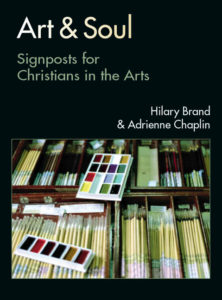 Art & Soul: Signposts for Christians in the Arts Hilary Brand & Adrienne Chaplin (IVP Academic) $34.00 This is also surely one of the best books in recent decades exploring a uniquely Christian involvement in the world of the arts. Lots of interesting side journeys cover all manner of scholarly and practical stuff. Chaplin, by the way, took up Seerveld’s chair in aesthetics at the Institute for Christian Studies in Toronto when he retired. Mature, thoughtful, important. I sometimes tell the story that I once knew a young art student at a state university who was being told by her advisor in the art department that she simply had to give up her faith, that her efforts to integrate her faith into her creative work was inappropriate and doomed. She bought this book from us, gave it to her teacher who later apologized, saying, “I didn’t realize that this is what you mean by developing a Christian perspective on the arts…” It’s that good.
Art & Soul: Signposts for Christians in the Arts Hilary Brand & Adrienne Chaplin (IVP Academic) $34.00 This is also surely one of the best books in recent decades exploring a uniquely Christian involvement in the world of the arts. Lots of interesting side journeys cover all manner of scholarly and practical stuff. Chaplin, by the way, took up Seerveld’s chair in aesthetics at the Institute for Christian Studies in Toronto when he retired. Mature, thoughtful, important. I sometimes tell the story that I once knew a young art student at a state university who was being told by her advisor in the art department that she simply had to give up her faith, that her efforts to integrate her faith into her creative work was inappropriate and doomed. She bought this book from us, gave it to her teacher who later apologized, saying, “I didn’t realize that this is what you mean by developing a Christian perspective on the arts…” It’s that good.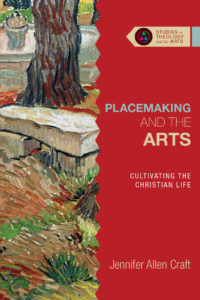 Placemaking and the Arts: Cultivating the Christian Life Jennifer Allen Craft (IVP Academic) $30.00 This fantastic book is the latest in the excellent “Studies in Theology and the Arts” series and the author was a CIVA 2019 speaker. We are thrilled to suggest it to you. For starters, it breaks new ground, showing how Wendell Berry-esque localism is enhanced by art that attends to local space and, conversely, how local artists can enhance awareness, flourishing, and redemptive justice in their local places. There is nothing like this in print, making it a must-read, even urgent book. We reviewed Placemaking and the Arts a bit more extensively when it first came out and we continue to think it is brilliant. It’s good not only for those interested in the arts but for anyone interested in a sense of place, caring about their local region, those doing missional work for the common good. Very highly recommended.
Placemaking and the Arts: Cultivating the Christian Life Jennifer Allen Craft (IVP Academic) $30.00 This fantastic book is the latest in the excellent “Studies in Theology and the Arts” series and the author was a CIVA 2019 speaker. We are thrilled to suggest it to you. For starters, it breaks new ground, showing how Wendell Berry-esque localism is enhanced by art that attends to local space and, conversely, how local artists can enhance awareness, flourishing, and redemptive justice in their local places. There is nothing like this in print, making it a must-read, even urgent book. We reviewed Placemaking and the Arts a bit more extensively when it first came out and we continue to think it is brilliant. It’s good not only for those interested in the arts but for anyone interested in a sense of place, caring about their local region, those doing missional work for the common good. Very highly recommended.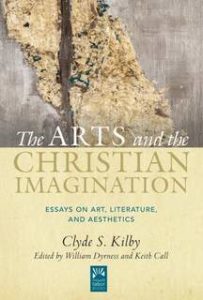 The Arts and the Christian Imagination: Essays on Art, Literature and Aesthetics Clyde Kilby, edited by William Dyrness & Keith Call (Paraclete Press) $28.99 What a beautiful book this is, a great volume for your own personal library or to give as a very special gift. Kilby, you may know, is legendary for being an early friend of C.S. Lewis and one of the primary people who influenced American evangelicals to adopt Lewis and his lucid apologetics and his astute literary criticism and, of course, his colorful, creative fiction. He founded the marvelous Marion Wade Center at Wheaton College (where he taught literature for decades.) This collection has been called a “landmark book” with “breathtaking scope” by an author who has been “profoundly influential.” Luci Shaw says that Kilby “set the course of my life.” The significance of this author and this collection is hard to understate.
The Arts and the Christian Imagination: Essays on Art, Literature and Aesthetics Clyde Kilby, edited by William Dyrness & Keith Call (Paraclete Press) $28.99 What a beautiful book this is, a great volume for your own personal library or to give as a very special gift. Kilby, you may know, is legendary for being an early friend of C.S. Lewis and one of the primary people who influenced American evangelicals to adopt Lewis and his lucid apologetics and his astute literary criticism and, of course, his colorful, creative fiction. He founded the marvelous Marion Wade Center at Wheaton College (where he taught literature for decades.) This collection has been called a “landmark book” with “breathtaking scope” by an author who has been “profoundly influential.” Luci Shaw says that Kilby “set the course of my life.” The significance of this author and this collection is hard to understate.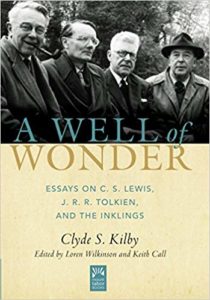 There is, in fact, a lovely, handsome, companion volume to this entitled A Well of Wonder: Essays on C.S. Lewis, J.R.R. Tolkien, and the Inklings also by Clyde Kilby, edited by Loren Wilkinson & Keith Call (Paraclete Press; $28.99) which explores the seven key British authors who make up the writer’s group known as the Inklings.) In both volumes, the editors have carefully and thoughtfully selected and compiled the best of Kilby’s many essays, articles, lectures, chapters of other books to create two great readers: one on Kilby’s work on the Inklings and the other, more general in nature, on Kilby’s own writing on the arts. These are extraordinary, important, nearly historic, I’d say. Kudos to Paraclete for these two very nice matching volumes.
There is, in fact, a lovely, handsome, companion volume to this entitled A Well of Wonder: Essays on C.S. Lewis, J.R.R. Tolkien, and the Inklings also by Clyde Kilby, edited by Loren Wilkinson & Keith Call (Paraclete Press; $28.99) which explores the seven key British authors who make up the writer’s group known as the Inklings.) In both volumes, the editors have carefully and thoughtfully selected and compiled the best of Kilby’s many essays, articles, lectures, chapters of other books to create two great readers: one on Kilby’s work on the Inklings and the other, more general in nature, on Kilby’s own writing on the arts. These are extraordinary, important, nearly historic, I’d say. Kudos to Paraclete for these two very nice matching volumes.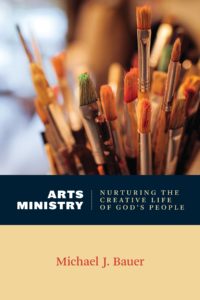 Arts Ministry: Nurturing the Creative Life of God’s People Michael J. Bauer (Eerdmans) $29.00 There may be some chintzy books on this, some guides that are somewhat self-evident, but this is mature, wise, complex, and well worth having around any congregation that cares even a little about this vital (but often not adequately considered) aspect of local church ministry. Published by the Calvin Institute of Christian Worship in their Liturgical Studies series (edited by John Witvliet) this volume is clearly “the best available guidebook to the emerging field of Christian arts ministry.” There are 18 different illustrative case studies that make this an inspiring and energizing read. The pioneering Catherine Kapikian (of the Henry Luce Center for the Arts and Religion at Wesley Theological Seminary” calls it “an unprecedented expose on arts ministry – what it is, how it works, and why it succeeds…” written with “unblinking, erudite analysis.”
Arts Ministry: Nurturing the Creative Life of God’s People Michael J. Bauer (Eerdmans) $29.00 There may be some chintzy books on this, some guides that are somewhat self-evident, but this is mature, wise, complex, and well worth having around any congregation that cares even a little about this vital (but often not adequately considered) aspect of local church ministry. Published by the Calvin Institute of Christian Worship in their Liturgical Studies series (edited by John Witvliet) this volume is clearly “the best available guidebook to the emerging field of Christian arts ministry.” There are 18 different illustrative case studies that make this an inspiring and energizing read. The pioneering Catherine Kapikian (of the Henry Luce Center for the Arts and Religion at Wesley Theological Seminary” calls it “an unprecedented expose on arts ministry – what it is, how it works, and why it succeeds…” written with “unblinking, erudite analysis.”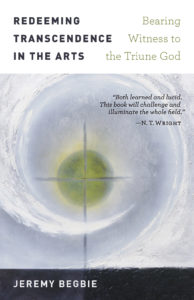 Redeeming Transcendence in the Arts: Bearing Witness to the Triune God Jeremy Begbie (Eerdmans) $18.00 Of the new books in this field that came out this year, this may be the most important, and certainly one which carries the most amazing endorsements. A musician and a classical composer by training, Professor Begbie is one of the best scholarly voices in this movement, and you should read whatever he writes. This recent book explores, as only Begbie can, the questions of awe and wonder and mystery in the arts. Of course, he “employs a biblical, Trinitarian imagination to show how Christian involvement in the arts can be shaped by the distinctive vision of God’s transcendence opened up in and through Jesus Christ.”
Redeeming Transcendence in the Arts: Bearing Witness to the Triune God Jeremy Begbie (Eerdmans) $18.00 Of the new books in this field that came out this year, this may be the most important, and certainly one which carries the most amazing endorsements. A musician and a classical composer by training, Professor Begbie is one of the best scholarly voices in this movement, and you should read whatever he writes. This recent book explores, as only Begbie can, the questions of awe and wonder and mystery in the arts. Of course, he “employs a biblical, Trinitarian imagination to show how Christian involvement in the arts can be shaped by the distinctive vision of God’s transcendence opened up in and through Jesus Christ.” 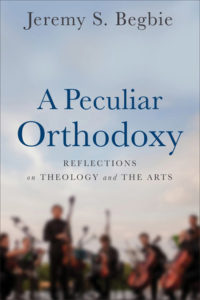 Very highly recommended.
Very highly recommended.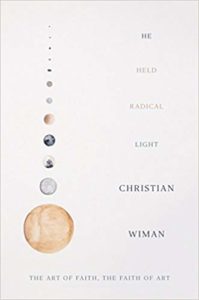 He Held Radical Light: The Art of Faith, the Faith of Art Christian Wiman (FSG) $23.00 Certainly one of the nation’s most esteemed contemporary poets, Mr. Wiman movingly wrote about his return to Christian faith in his 2013 best-seller My Bright Abyss: Meditation of a Modern Believer (Farrar, Strauss, Giroux; $14.00.) That was reviewed positively in prominent venues, with Kathleen Norris writing the extraordinary review in The New York Times Book Review. Now at the Yale Center for Faith & Culture, this is his recent work exploring theology and art in what Marilynn Robinson calls “scholarship that has a purifying urgency.” It’s a bit dense, has significant interaction with poetry and poems, but for those studying this field, it is one of the most important books published this year. If you are a fan of Wiman’s poetry, or care to read his moving studies of contemporary writers, you will love this.
He Held Radical Light: The Art of Faith, the Faith of Art Christian Wiman (FSG) $23.00 Certainly one of the nation’s most esteemed contemporary poets, Mr. Wiman movingly wrote about his return to Christian faith in his 2013 best-seller My Bright Abyss: Meditation of a Modern Believer (Farrar, Strauss, Giroux; $14.00.) That was reviewed positively in prominent venues, with Kathleen Norris writing the extraordinary review in The New York Times Book Review. Now at the Yale Center for Faith & Culture, this is his recent work exploring theology and art in what Marilynn Robinson calls “scholarship that has a purifying urgency.” It’s a bit dense, has significant interaction with poetry and poems, but for those studying this field, it is one of the most important books published this year. If you are a fan of Wiman’s poetry, or care to read his moving studies of contemporary writers, you will love this.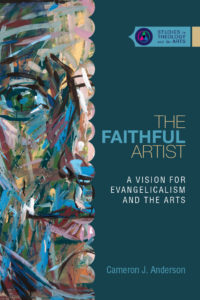 The Faithful Artist: A Vision for Evangelicalism and the Arts Cameron J. Anderson (IVP Academic) $28.00 Special kudos to the previous director of CIVA for offering this mature and sophisticated appeal for how contemporary evangelicalism can come to appreciate the arts and how a deeply rooted faith can inspire artists today. This should be on the shelf of any person of faith who is an artist, and anyone who does ministry with and for artists. Many who are in this movement find their editions dog-eared and well used. This is a must-read that is meaty and scholarly enough, without being tedious or obtuse, thoughtfully written with a vast knowledge of the best literature in the conversation, and thoroughly engaging. The Faithful Artist is a great overview, but more than an overview, it is nearly a manifesto. Whether you identify with the evangelical tradition or not, this is a fabulous book. By the way, I’m not fond of the cover and if you are like me, please don’t be dissuaded. This book is beautiful, thoughtful, rigorous, and important.
The Faithful Artist: A Vision for Evangelicalism and the Arts Cameron J. Anderson (IVP Academic) $28.00 Special kudos to the previous director of CIVA for offering this mature and sophisticated appeal for how contemporary evangelicalism can come to appreciate the arts and how a deeply rooted faith can inspire artists today. This should be on the shelf of any person of faith who is an artist, and anyone who does ministry with and for artists. Many who are in this movement find their editions dog-eared and well used. This is a must-read that is meaty and scholarly enough, without being tedious or obtuse, thoughtfully written with a vast knowledge of the best literature in the conversation, and thoroughly engaging. The Faithful Artist is a great overview, but more than an overview, it is nearly a manifesto. Whether you identify with the evangelical tradition or not, this is a fabulous book. By the way, I’m not fond of the cover and if you are like me, please don’t be dissuaded. This book is beautiful, thoughtful, rigorous, and important.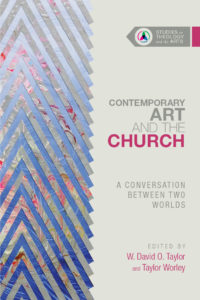 Contemporary Art and the Church: A Conversation Between Two Worldsedited W. David O. Taylor & Taylor Worley (IVP Academic) $30.00 An exceptional release in the important “Studies in Theology and the Arts” series sponsored by CIVA, this is perhaps the definitive volume (and will be for quite some time, I suspect) pushing a deeper conversation about exceptionally contemporary art work and its reception within the Christian community. This includes expertly edited versions of talks and panels from the extraordinary 2015 biennial CIVA conference and includes inspiring and provocative transcripts of the wonderful presentations from that gathering. Nearly all the great thinkers and critics and patrons who have forged the foundation of CIVA these last decades are in here. This splendid book is nothing short of spectacular and a great tribute to the profound state of the discussion about this topic. I’m in awe. Order it today!
Contemporary Art and the Church: A Conversation Between Two Worldsedited W. David O. Taylor & Taylor Worley (IVP Academic) $30.00 An exceptional release in the important “Studies in Theology and the Arts” series sponsored by CIVA, this is perhaps the definitive volume (and will be for quite some time, I suspect) pushing a deeper conversation about exceptionally contemporary art work and its reception within the Christian community. This includes expertly edited versions of talks and panels from the extraordinary 2015 biennial CIVA conference and includes inspiring and provocative transcripts of the wonderful presentations from that gathering. Nearly all the great thinkers and critics and patrons who have forged the foundation of CIVA these last decades are in here. This splendid book is nothing short of spectacular and a great tribute to the profound state of the discussion about this topic. I’m in awe. Order it today!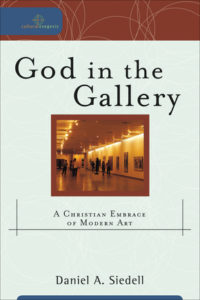 God in the Gallery: A Christian Embrace of Modern Art Daniel A. Siedell (Baker Academic) $26.00 Dan Siedell is a deep thinker and curator who has been a pioneer in writing about modern art from a Christian perspective. The concern of this book is to think faithfully in ways that are germane to the real world of contemporary art moving the conversation about faith, culture, and the arts into the 21st century. Not at all limited to a faith-based cul-de-sac or echo chamber, Siedell is embedded in the real modern art world and is a trusted thinker; this was groundbreaking when it came out in 2008 and remains a must-read standard. He is also the author of, among other works, Who’s Afraid of Modern Art? (Cascade Books; $24.00.)
God in the Gallery: A Christian Embrace of Modern Art Daniel A. Siedell (Baker Academic) $26.00 Dan Siedell is a deep thinker and curator who has been a pioneer in writing about modern art from a Christian perspective. The concern of this book is to think faithfully in ways that are germane to the real world of contemporary art moving the conversation about faith, culture, and the arts into the 21st century. Not at all limited to a faith-based cul-de-sac or echo chamber, Siedell is embedded in the real modern art world and is a trusted thinker; this was groundbreaking when it came out in 2008 and remains a must-read standard. He is also the author of, among other works, Who’s Afraid of Modern Art? (Cascade Books; $24.00.)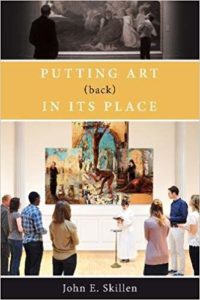 Putting Art (Back) In Its Place John E. Skillen (Hendrickson) $24.95 Many professors and students have admired the wonderful arts-oriented semester abroad program in Orvieto, Italy, founded by Dr. Skillen, a medievalist from Gordon College. This thoughtful book “takes readers on a fascinating journey through the world of Christian art in medieval and Renaissance Italy to rediscover the sacred role artwork can play once again in our churches.” Part historical survey, part manifesto about art commissions and collaboration and a vibrant call for church folks to realize the value of art and insist upon its flourishing. Skillen knows the cultural context of medieval and Renaissance Italian art (and storytelling) and its impact on art history and Western culture. This is a grand and unique book; highly recommended.
Putting Art (Back) In Its Place John E. Skillen (Hendrickson) $24.95 Many professors and students have admired the wonderful arts-oriented semester abroad program in Orvieto, Italy, founded by Dr. Skillen, a medievalist from Gordon College. This thoughtful book “takes readers on a fascinating journey through the world of Christian art in medieval and Renaissance Italy to rediscover the sacred role artwork can play once again in our churches.” Part historical survey, part manifesto about art commissions and collaboration and a vibrant call for church folks to realize the value of art and insist upon its flourishing. Skillen knows the cultural context of medieval and Renaissance Italian art (and storytelling) and its impact on art history and Western culture. This is a grand and unique book; highly recommended.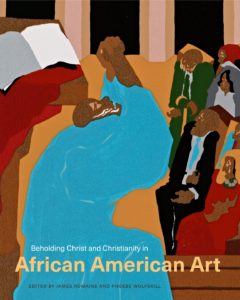 Beholding Christ and Christianity in African American Art edited by James Romaine & Phoebe Wolfskill (Penn State University Press) $34.95 We were particularly glad to hear that at the bi-annual CIVA event in June of 2019 they intended to focus somewhat on the relationships and interfaces of art, social change, cultural transformation, and the unending project of seeking ethnic justice and racial reconciliation. Respected evangelical art historian James Romaine here joined up with Dr. Phoebe Wolfskill, Department of African American and African Diaspora Studies at Indiana University, Bloomington, to offer a collection of essays that explore prominent African American art. Sometimes these artists engage overtly religious themes; often this work is transformatively Christian. As the publisher explains, these essays “examine the ways in which an artists engagement with religious symbols can be an expression of concerns related to racial, political, and socio-economic identity. We were glad to sell a few of this hefty book at CIVA and are happy to tell you about it now.
Beholding Christ and Christianity in African American Art edited by James Romaine & Phoebe Wolfskill (Penn State University Press) $34.95 We were particularly glad to hear that at the bi-annual CIVA event in June of 2019 they intended to focus somewhat on the relationships and interfaces of art, social change, cultural transformation, and the unending project of seeking ethnic justice and racial reconciliation. Respected evangelical art historian James Romaine here joined up with Dr. Phoebe Wolfskill, Department of African American and African Diaspora Studies at Indiana University, Bloomington, to offer a collection of essays that explore prominent African American art. Sometimes these artists engage overtly religious themes; often this work is transformatively Christian. As the publisher explains, these essays “examine the ways in which an artists engagement with religious symbols can be an expression of concerns related to racial, political, and socio-economic identity. We were glad to sell a few of this hefty book at CIVA and are happy to tell you about it now.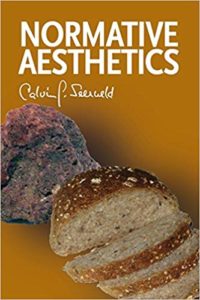 Normative Aesthetics: Sundry Writings and Occasional Lectures Calvin Seerveld (Dordt College Press) $21.00 This collection of various pieces – ranging from exceedingly dense scholarly philosophy to delightful sermons and brief essays – is the best place to dig deeply into Seerveld’s famously unique (and Biblically sound) aesthetic theories. No one in the contemporary world has done what he has done, and anyone interested in the topic, if they are intellectually honest and at all curious, owes it to themselves to study this volume.
Normative Aesthetics: Sundry Writings and Occasional Lectures Calvin Seerveld (Dordt College Press) $21.00 This collection of various pieces – ranging from exceedingly dense scholarly philosophy to delightful sermons and brief essays – is the best place to dig deeply into Seerveld’s famously unique (and Biblically sound) aesthetic theories. No one in the contemporary world has done what he has done, and anyone interested in the topic, if they are intellectually honest and at all curious, owes it to themselves to study this volume.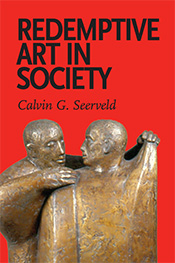 Redemptive Art in Society: Sundry Writings and Occasional Lectures Calvin Seerveld (Dordt College Press) $21.00 One of my great joys in my bookselling and book reviewing “career” was being asked to provide a quip on the back of this volume as an endorsing blurb. I mentioned how important it is to see art as a gift that can stimulate and be a part of social change, bring shalom and voice to the oppressed. Better, though, are these sample lines from the good introduction by Adrienne Dengerink Chaplin, who wrote:
Redemptive Art in Society: Sundry Writings and Occasional Lectures Calvin Seerveld (Dordt College Press) $21.00 One of my great joys in my bookselling and book reviewing “career” was being asked to provide a quip on the back of this volume as an endorsing blurb. I mentioned how important it is to see art as a gift that can stimulate and be a part of social change, bring shalom and voice to the oppressed. Better, though, are these sample lines from the good introduction by Adrienne Dengerink Chaplin, who wrote: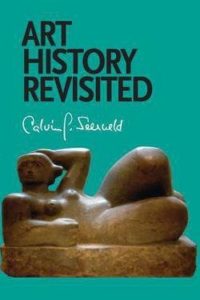 Art History Revised: Sundry Writings and Occasional Lectures Calvin Seerveld (Dordt College Press) $21.00 As the publisher explains: “The essays in Art History Revisited follow a general course from the historiography of philosophy to the historiography of art and aesthetics to analyses of individual artists like Antoine Watteau and Gerald Folkerts and the theory and practice of artist/aestheticians like William Hogarth and Anton Raphael Mengs. As this selection of essays attests, Seerveld is both well-versed in the history of art and has made significant contributions to this field as well.” I know very little of any of this, and enjoyed learning, and was considerably blessed to see Seerveld in action, to imbibed from his integral worldview and his, deep, Godly passion.
Art History Revised: Sundry Writings and Occasional Lectures Calvin Seerveld (Dordt College Press) $21.00 As the publisher explains: “The essays in Art History Revisited follow a general course from the historiography of philosophy to the historiography of art and aesthetics to analyses of individual artists like Antoine Watteau and Gerald Folkerts and the theory and practice of artist/aestheticians like William Hogarth and Anton Raphael Mengs. As this selection of essays attests, Seerveld is both well-versed in the history of art and has made significant contributions to this field as well.” I know very little of any of this, and enjoyed learning, and was considerably blessed to see Seerveld in action, to imbibed from his integral worldview and his, deep, Godly passion.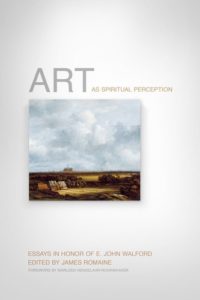 Art as Spiritual Perception: Essays in Honor of John E. Walford edited by James Romaine (Crossway) $40.00 This is a very handsome, hardback festschrift for a legendary art historian, known for his many good years of teaching at Wheaton College. Each chapter has a contemporary art historian exploring the deep insights of a certain work, or body of work, as they were taught by their teacher, or colleague, or friend, John Walford. A few of the pieces are very, very good, examining the process of Christian art historical discernment (including one I truly loved by Calvin Seerveld.) A rare, specialized collection for those interested in the methodologies of art history.
Art as Spiritual Perception: Essays in Honor of John E. Walford edited by James Romaine (Crossway) $40.00 This is a very handsome, hardback festschrift for a legendary art historian, known for his many good years of teaching at Wheaton College. Each chapter has a contemporary art historian exploring the deep insights of a certain work, or body of work, as they were taught by their teacher, or colleague, or friend, John Walford. A few of the pieces are very, very good, examining the process of Christian art historical discernment (including one I truly loved by Calvin Seerveld.) A rare, specialized collection for those interested in the methodologies of art history.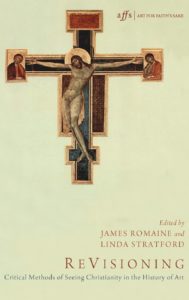 ReVisioning: Critical Methods of Seeing Christianity in the History of Art edited by James Romaine & Linda Stratford (Cascade Books) $43.00 We were delighted to announce this book when it came out in 2014, now noting that it is somewhat like the Art as Spiritual Perception, above but more sprawling, diverse and intense. With over 20 chapters (and 350 pages, complete with color plates) it remains a seminal work in the field of nurturing a uniquely Christian art historical method. The publisher explains it like this: ReVisioning examines the application of art historical methods to the history of Christianity and art. As methods of art history have become more interdisciplinary, there has been a notable emergence of discussions of religion in art history as well as related fields such as visual culture and theology. This book represents the first critical examination of scholarly methodologies applied to the study of Christian subjects, themes, and contexts in art. ReVisioning contains original work from a range of scholars, each of whom has addressed the question, in regard to a well-known work of art or body of work, “How have particular methods of art history been applied, and with what effect?” The study moves from the third century to the present, providing extensive treatment and analysis of art historical methods applied to the history of Christianity and art.
ReVisioning: Critical Methods of Seeing Christianity in the History of Art edited by James Romaine & Linda Stratford (Cascade Books) $43.00 We were delighted to announce this book when it came out in 2014, now noting that it is somewhat like the Art as Spiritual Perception, above but more sprawling, diverse and intense. With over 20 chapters (and 350 pages, complete with color plates) it remains a seminal work in the field of nurturing a uniquely Christian art historical method. The publisher explains it like this: ReVisioning examines the application of art historical methods to the history of Christianity and art. As methods of art history have become more interdisciplinary, there has been a notable emergence of discussions of religion in art history as well as related fields such as visual culture and theology. This book represents the first critical examination of scholarly methodologies applied to the study of Christian subjects, themes, and contexts in art. ReVisioning contains original work from a range of scholars, each of whom has addressed the question, in regard to a well-known work of art or body of work, “How have particular methods of art history been applied, and with what effect?” The study moves from the third century to the present, providing extensive treatment and analysis of art historical methods applied to the history of Christianity and art. In this week’s BookNotes I will review a new book that we think is very good, a lot of fun, and even, I would say, important. It’s important for ordinary folks as well as for those who study this particular field professionally. Its retro cover matches the topic: Cinematic Faith: A Christian Perspective on Movies and Meaning by Calvin College film studies professor (and excitable film buff) William D. Romanowski (Baker Academic) $22.99. Our 20% OFF ON SALE discount makes it just $18.39.
In this week’s BookNotes I will review a new book that we think is very good, a lot of fun, and even, I would say, important. It’s important for ordinary folks as well as for those who study this particular field professionally. Its retro cover matches the topic: Cinematic Faith: A Christian Perspective on Movies and Meaning by Calvin College film studies professor (and excitable film buff) William D. Romanowski (Baker Academic) $22.99. Our 20% OFF ON SALE discount makes it just $18.39.
 major work on Tolkien’s “divine design” is majestic) to a church education conference with PC(USA) Presbyterian congregational educators, to a UCC clergy convocation (with Sarah Griffith Lund leading as a vibrant speaker whose book Blessed Are the Crazy: Breaking the Silence about Mental
major work on Tolkien’s “divine design” is majestic) to a church education conference with PC(USA) Presbyterian congregational educators, to a UCC clergy convocation (with Sarah Griffith Lund leading as a vibrant speaker whose book Blessed Are the Crazy: Breaking the Silence about Mental  elected their current very good Bishop.
elected their current very good Bishop. We are told over and over that our books make a difference, that our presence matters at these denominational events. Historically, mom and pop Christian bookstores have been part often simplistic pietistic and fundamentalist traditions and have sometimes not been very serious-minded about theology; they have often eschewed working with mainline congregations. When large evangelical chains won’t even carry certain Bible translations or the work of certain publishers, there is good reason for animosity towards Christian booksellers among mainline Protestants and Roman Catholics. We have been graced by those in mainline circles who have welcomed us, knowing that we are a mom and pop, small town, Christian bookstore whose most core convictions remain orthodox. And we are grateful for
We are told over and over that our books make a difference, that our presence matters at these denominational events. Historically, mom and pop Christian bookstores have been part often simplistic pietistic and fundamentalist traditions and have sometimes not been very serious-minded about theology; they have often eschewed working with mainline congregations. When large evangelical chains won’t even carry certain Bible translations or the work of certain publishers, there is good reason for animosity towards Christian booksellers among mainline Protestants and Roman Catholics. We have been graced by those in mainline circles who have welcomed us, knowing that we are a mom and pop, small town, Christian bookstore whose most core convictions remain orthodox. And we are grateful for  those who have trusted us.
those who have trusted us.

 on leadership development, youth ministry, and Christian education. Some rather evangelical books can be wisely used by mainline folks and we have tons of books from more liturgical, mainline traditions. We take books like The Art of Transformation: Three Things Churches Do That Change Everything by Paul Fromberg, one of the priests at St. Gregory of Nyssa (Church Publishing; $18.95) or Becoming a Just Church: Cultivating Communities of God’s Shalom by Adam Gustine (IVP; $17.00.) or the new one by the remarkable Peter Steinke, Uproar:Calm Leadership in Anxious Times (Rowman & Littlefield; $19.95) and dozens and dozens more.
on leadership development, youth ministry, and Christian education. Some rather evangelical books can be wisely used by mainline folks and we have tons of books from more liturgical, mainline traditions. We take books like The Art of Transformation: Three Things Churches Do That Change Everything by Paul Fromberg, one of the priests at St. Gregory of Nyssa (Church Publishing; $18.95) or Becoming a Just Church: Cultivating Communities of God’s Shalom by Adam Gustine (IVP; $17.00.) or the new one by the remarkable Peter Steinke, Uproar:Calm Leadership in Anxious Times (Rowman & Littlefield; $19.95) and dozens and dozens more. Abraham Kuyper who used that great phrase about Christ being Lord of “every square inch” of His creation to understand that God cares about more than our churches. (Although it wouldn’t hurt to get it from the proverbial horses mouth – the third Pro Rege: Living Under Christ’s Kingship volume in the massive Kuyper translation project was just released (Lexham Press; $49.99) offering remarkable insight about cultural engagement from the early 20th century Dutch theologian and statesman.)
Abraham Kuyper who used that great phrase about Christ being Lord of “every square inch” of His creation to understand that God cares about more than our churches. (Although it wouldn’t hurt to get it from the proverbial horses mouth – the third Pro Rege: Living Under Christ’s Kingship volume in the massive Kuyper translation project was just released (Lexham Press; $49.99) offering remarkable insight about cultural engagement from the early 20th century Dutch theologian and statesman.) (Do please read
(Do please read  (And then back up and read
(And then back up and read 
 As you can guess, we are passionate about this wholistic vision – learned mostly from the likes of Francis Schaeffer and Abraham Kuyper and in books like Creation Regained: Biblical Basis for a Reformational Worldview by Al Wolters and Heaven Is Not My Home: Living in the Now of God’s Creation by Paul Marshall and Engaging God’s World: A Christian Vision of Faith, Learning, and Living by Cornelius Plantinga – about how we can find God in the ordinary stuff of life and how we are called by God to be faithfully attentive about how to think and live in all spheres of life; no arena of culture or aspect of society or corner of your life is off limits to the saving power of Christ and the renewing power of the Spirit. It hardly needs saying – but yet, in religious circles, it does – life in God’s creation is multi-dimensional. We think and feel, work and play, vote and shop. Theorists of all sorts get at this when they talk about two hemispheres of the brain or when educators talk about multiple intelligences or even when we hear about personality types (like with the recent interest in the Enneagram. As multi-faceted people made in God’s image, we are more than bodies and souls. Which is why the church must proclaim a big gospel of all sides of life and why faith-based booksellers must carry resources for living in every sector of life and culture.
As you can guess, we are passionate about this wholistic vision – learned mostly from the likes of Francis Schaeffer and Abraham Kuyper and in books like Creation Regained: Biblical Basis for a Reformational Worldview by Al Wolters and Heaven Is Not My Home: Living in the Now of God’s Creation by Paul Marshall and Engaging God’s World: A Christian Vision of Faith, Learning, and Living by Cornelius Plantinga – about how we can find God in the ordinary stuff of life and how we are called by God to be faithfully attentive about how to think and live in all spheres of life; no arena of culture or aspect of society or corner of your life is off limits to the saving power of Christ and the renewing power of the Spirit. It hardly needs saying – but yet, in religious circles, it does – life in God’s creation is multi-dimensional. We think and feel, work and play, vote and shop. Theorists of all sorts get at this when they talk about two hemispheres of the brain or when educators talk about multiple intelligences or even when we hear about personality types (like with the recent interest in the Enneagram. As multi-faceted people made in God’s image, we are more than bodies and souls. Which is why the church must proclaim a big gospel of all sides of life and why faith-based booksellers must carry resources for living in every sector of life and culture. teaching to lawyering, from math to aesthetics, from farming to journalism, there are Christian authors offering up their workspaces as holy ground, as mission fields. There are people that get what my friend John Van Sloten says in his clever book title (and very excellent book) Every Job a Parable: What Walmart Greet, Nurses and Astronauts Tell us About God. Such folks may not be church leaders but they are trying to be salt and light, leaven in the loaf, blooming right where they are planted in the factory floor or work cubicle or sculpting studio or kindergarten classroom.
teaching to lawyering, from math to aesthetics, from farming to journalism, there are Christian authors offering up their workspaces as holy ground, as mission fields. There are people that get what my friend John Van Sloten says in his clever book title (and very excellent book) Every Job a Parable: What Walmart Greet, Nurses and Astronauts Tell us About God. Such folks may not be church leaders but they are trying to be salt and light, leaven in the loaf, blooming right where they are planted in the factory floor or work cubicle or sculpting studio or kindergarten classroom. callings to serve God in professions and careers that I compiled, Serious Dreams: Bold Ideas for the Rest of Your Life (Square Halo Books; $13.99) and why I’m sad when people think that even young adults wouldn’t be interesting in such a thing. It is unfortunate, I think, of how few churches honor their college grads. Maybe if we all read Serious Dreams it might help.
callings to serve God in professions and careers that I compiled, Serious Dreams: Bold Ideas for the Rest of Your Life (Square Halo Books; $13.99) and why I’m sad when people think that even young adults wouldn’t be interesting in such a thing. It is unfortunate, I think, of how few churches honor their college grads. Maybe if we all read Serious Dreams it might help. I was dismayed that a book that is getting rave reviews in places like Christianity Today called Seculosity: How Career, Parenting, Technology, Food, Politics, and Romance Became Our New Religion and What to Do about It by Dave Zahl didn’t sell at our recent mainline gigs, even though Fleming Rutledge (an Episcopalian) had a great blurb on the back, and it is published by the ELCA-related Fortress Press. It is an interesting, playful, grace-filled, feisty study of our culture – the sort of things he does at his exceptional website and podcast Mockingbird.
I was dismayed that a book that is getting rave reviews in places like Christianity Today called Seculosity: How Career, Parenting, Technology, Food, Politics, and Romance Became Our New Religion and What to Do about It by Dave Zahl didn’t sell at our recent mainline gigs, even though Fleming Rutledge (an Episcopalian) had a great blurb on the back, and it is published by the ELCA-related Fortress Press. It is an interesting, playful, grace-filled, feisty study of our culture – the sort of things he does at his exceptional website and podcast Mockingbird. One book we always take out with us to events is Eyes Wide Open: Looking for God in Popular Culture (Brazos Press; $24.00.) It is a personal favorite written by an old college pal, author of the brand new Cinematic Faith, William D. Romanowski. Decades ago in those critical years, under the influence of older mentors in the
One book we always take out with us to events is Eyes Wide Open: Looking for God in Popular Culture (Brazos Press; $24.00.) It is a personal favorite written by an old college pal, author of the brand new Cinematic Faith, William D. Romanowski. Decades ago in those critical years, under the influence of older mentors in the  Culture Wars: Religion & the Role of Entertainment in American Life (Wipf & Stock; $45.00) remains a major work – critiquing, by the way, the very way we assume that there is a difference between high art (that we should study and learn from) and low art, or pop culture (which, well, is just amusement, after all, or so many assume.) That the original cover had a picture of Rocky Balboa and William Shakespeare and Bruce Cockburn made a nice point. Bill was a lit major in college, was a performing artist himself, had worked in campus ministry with emerging adults (through the CCO) and soon became perhaps the leading voice in the early 1990s discussions about evangelical faith and popular culture. He was speaking widely and doing research and meeting important voices in the entertainment industry. (The picture above, by the way, is with the legendary Jack Valenti, the late President of the Motion Picture Association — you know, the institution that runs the Academy Awards and gives out the Oscars.
Culture Wars: Religion & the Role of Entertainment in American Life (Wipf & Stock; $45.00) remains a major work – critiquing, by the way, the very way we assume that there is a difference between high art (that we should study and learn from) and low art, or pop culture (which, well, is just amusement, after all, or so many assume.) That the original cover had a picture of Rocky Balboa and William Shakespeare and Bruce Cockburn made a nice point. Bill was a lit major in college, was a performing artist himself, had worked in campus ministry with emerging adults (through the CCO) and soon became perhaps the leading voice in the early 1990s discussions about evangelical faith and popular culture. He was speaking widely and doing research and meeting important voices in the entertainment industry. (The picture above, by the way, is with the legendary Jack Valenti, the late President of the Motion Picture Association — you know, the institution that runs the Academy Awards and gives out the Oscars. As you may recall from
As you may recall from  (By the way, another vital favorite, which we also take everywhere we go – with a more allusive writing style, and a bit more punchy evaluation of important popular culture works – is David Dark’s amazing Everyday Apocalypse: The Sacred Revealed in Radiohead, The Simpsons, and Other Pop Culture Icons (Brazos Press; $20.00.) Don’t you love the cool, old-school juke box on the cover design?
(By the way, another vital favorite, which we also take everywhere we go – with a more allusive writing style, and a bit more punchy evaluation of important popular culture works – is David Dark’s amazing Everyday Apocalypse: The Sacred Revealed in Radiohead, The Simpsons, and Other Pop Culture Icons (Brazos Press; $20.00.) Don’t you love the cool, old-school juke box on the cover design? Years in the making, we are very, very glad to get to announce a brand new book by professor Romanowski. As we’ve said, it’s called Cinematic Faith: A Christian Perspective on Movies and Meaning (Baker Academic; $22.99 – OUR SALE PRICE = $18.39) and I’m reading through it happily for the second time. For anyone who likes going to the movies or can’t wait for the next NetFlex DVD to show up (please don’t tell me you watch films on your little phone!) this big book will be an education and a joy. It isn’t preachy and it isn’t simplistic but it isn’t overly academic. If you love movies, you need this book.
Years in the making, we are very, very glad to get to announce a brand new book by professor Romanowski. As we’ve said, it’s called Cinematic Faith: A Christian Perspective on Movies and Meaning (Baker Academic; $22.99 – OUR SALE PRICE = $18.39) and I’m reading through it happily for the second time. For anyone who likes going to the movies or can’t wait for the next NetFlex DVD to show up (please don’t tell me you watch films on your little phone!) this big book will be an education and a joy. It isn’t preachy and it isn’t simplistic but it isn’t overly academic. If you love movies, you need this book. Books help us see and appreciate and develop the creation God has given us. To use the language of Andy Crouch’s essential text, we become Culture Makers who “recovery our creative calling” and can then, as Romanowski puts it, “find God in popular culture.” (By the way, we take Crouch’s Culture Making everywhere we go, too – it’s such a very, very helpful book to help us find meaning and purpose in our day to day lives.)
Books help us see and appreciate and develop the creation God has given us. To use the language of Andy Crouch’s essential text, we become Culture Makers who “recovery our creative calling” and can then, as Romanowski puts it, “find God in popular culture.” (By the way, we take Crouch’s Culture Making everywhere we go, too – it’s such a very, very helpful book to help us find meaning and purpose in our day to day lives.) Rear Window, and a great piece called “Narrative, Character and Perspective in The Blind Side” – you’ve got to read that if you enjoyed this movie as much as we have. Through all of these excursions, you can tell that his tastes are not overly high-brow. (Remember his central thesis of Pop Culture Wars that all film and pop artifacts are religiously/philosophically laden and artfully serious, and his central thesis of Eyes Wide Open
Rear Window, and a great piece called “Narrative, Character and Perspective in The Blind Side” – you’ve got to read that if you enjoyed this movie as much as we have. Through all of these excursions, you can tell that his tastes are not overly high-brow. (Remember his central thesis of Pop Culture Wars that all film and pop artifacts are religiously/philosophically laden and artfully serious, and his central thesis of Eyes Wide Open  that we can find signs of life and Godly insight from even pagan popular culture.) Cinematic Faith is hoping to enhance your viewing experiences and help you get more out of your entertainment dollar, not bore you with academic discourse or shame you for enjoying the movies you enjoy. Please know, this isn’t highbrow scholarly theory for snooty cineastes but a thoughtful tool for all of us, whether you like The Kings Speech or the X-Men series or Marvel’s Captain America: Civil War.
that we can find signs of life and Godly insight from even pagan popular culture.) Cinematic Faith is hoping to enhance your viewing experiences and help you get more out of your entertainment dollar, not bore you with academic discourse or shame you for enjoying the movies you enjoy. Please know, this isn’t highbrow scholarly theory for snooty cineastes but a thoughtful tool for all of us, whether you like The Kings Speech or the X-Men series or Marvel’s Captain America: Civil War. I will name several good things that make this a very important contribution, not only for anyone serious about developing a uniquely and inherently Christian way of approaching film, but for ordinary folks who enjoy a good movie night from time to time.
I will name several good things that make this a very important contribution, not only for anyone serious about developing a uniquely and inherently Christian way of approaching film, but for ordinary folks who enjoy a good movie night from time to time. has been informed by the aesthetic theories of Calvin Seerveld (Rainbows for a Fallen World, Bearing Fresh Olive Leaves, Normative Aesthetics, Redemptive Art in Society) and more, including study and conversations with other philosophers of the arts such as philosophers such as Nicholas Wolterstorff and Lambert Zuidervaart as well as pop journalists like the great Steve Turner whose Imagine: A Vision for Christians in the Arts is a great book for anyone wanting to dip into an integrated Christian perspective on art and culture and whose Popcultured I already mentioned.) This means that Bill has worked very hard at a deep level to wonder what it means to take up theories and mindsets that inform dispositions and practices that are not only coherent and consistent from a Christian perspective but that are deeply integral. In this, he doesn’t get all preachy nor does he particularly wear his faith on his sleeve, but he is a reliable, faithful guide. Faith, in his scholarship, is not an afterthought nor is his sense of quality and value in a film based on cheap inspiration. I suppose we don’t have to say it here, but a novel or movie can tell a profoundly immoral story and be brilliantly made and wise; similarly an overtly Christian movie may have a lively religious message but be poorly made. Such films and books can even be dishonest about the way faith works in real life. Some of the most theologically sane movies have be made by deeply troubled filmmakers and some of our worst films are made by otherwise Godly people trying to use the art form for evangelistic purposes.
has been informed by the aesthetic theories of Calvin Seerveld (Rainbows for a Fallen World, Bearing Fresh Olive Leaves, Normative Aesthetics, Redemptive Art in Society) and more, including study and conversations with other philosophers of the arts such as philosophers such as Nicholas Wolterstorff and Lambert Zuidervaart as well as pop journalists like the great Steve Turner whose Imagine: A Vision for Christians in the Arts is a great book for anyone wanting to dip into an integrated Christian perspective on art and culture and whose Popcultured I already mentioned.) This means that Bill has worked very hard at a deep level to wonder what it means to take up theories and mindsets that inform dispositions and practices that are not only coherent and consistent from a Christian perspective but that are deeply integral. In this, he doesn’t get all preachy nor does he particularly wear his faith on his sleeve, but he is a reliable, faithful guide. Faith, in his scholarship, is not an afterthought nor is his sense of quality and value in a film based on cheap inspiration. I suppose we don’t have to say it here, but a novel or movie can tell a profoundly immoral story and be brilliantly made and wise; similarly an overtly Christian movie may have a lively religious message but be poorly made. Such films and books can even be dishonest about the way faith works in real life. Some of the most theologically sane movies have be made by deeply troubled filmmakers and some of our worst films are made by otherwise Godly people trying to use the art form for evangelistic purposes. And then he goes from he assessment of the conventional American myths to a full-on study of gender in mainstream Hollywood. As a guy with long-standing sensitivity to the critiques of machismo, a critique he has himself been making for decades, this chapter, called “Stop Taking My Hand!” (which is a line from Rey in Star Wars: The Force Awakens), looks at “gendered cultural patterns” about the ideal man or woman. Do these images reflect our values and assumptions or shape them? What might the recent interest in strong female characters bode for film and storytelling? With explorations of Katniss Everdeen (The Hunger Games) to Hilary Swank’s awarded winning Maggie Fitzgerald being trained in boxing by Clint Eastwood’s character in Million Dollar Baby, Romanowski brings fascinating and I think wise insight to questions of gender and sexuality and relationships.
And then he goes from he assessment of the conventional American myths to a full-on study of gender in mainstream Hollywood. As a guy with long-standing sensitivity to the critiques of machismo, a critique he has himself been making for decades, this chapter, called “Stop Taking My Hand!” (which is a line from Rey in Star Wars: The Force Awakens), looks at “gendered cultural patterns” about the ideal man or woman. Do these images reflect our values and assumptions or shape them? What might the recent interest in strong female characters bode for film and storytelling? With explorations of Katniss Everdeen (The Hunger Games) to Hilary Swank’s awarded winning Maggie Fitzgerald being trained in boxing by Clint Eastwood’s character in Million Dollar Baby, Romanowski brings fascinating and I think wise insight to questions of gender and sexuality and relationships. Deep Focus: Film and Theology in Dialogue Robert Johnston, Craig Detweiler and Kutter Callaway (Baker Academic) $26.99 As I’ve hinted above, I’m not inclined to be particularly interested in seeing what theologians, as such, have to say about film studies. A book about movies that has churchy stained glass on the cover strikes me as awkward. This sort of approach just seems somehow off to me, as if we have to somehow sanctify the ordinary act of watching movies not by thinking Christianly about movies (as Romanowski would argue) but that we need these professional thinkers about theology to make it so.
Deep Focus: Film and Theology in Dialogue Robert Johnston, Craig Detweiler and Kutter Callaway (Baker Academic) $26.99 As I’ve hinted above, I’m not inclined to be particularly interested in seeing what theologians, as such, have to say about film studies. A book about movies that has churchy stained glass on the cover strikes me as awkward. This sort of approach just seems somehow off to me, as if we have to somehow sanctify the ordinary act of watching movies not by thinking Christianly about movies (as Romanowski would argue) but that we need these professional thinkers about theology to make it so.

 screenplays and win awards for costuming and who are actors and actresses on the silver screen. They know their stuff and they’ve offered us important, inspiring stuff. In a back cover blurb, Terry Lindvall calls them “ophthalmologist of the cinema.” I love that!
screenplays and win awards for costuming and who are actors and actresses on the silver screen. They know their stuff and they’ve offered us important, inspiring stuff. In a back cover blurb, Terry Lindvall calls them “ophthalmologist of the cinema.” I love that!
